
Blog 72 by Tan: Kin la Belle
And just like that, we were in Kinshasa. With so much of our efforts and attentions dedicated to getting our bikes and selves to Kinshasa, we realised we hadn’t put all that much thought into what we would actually do there. We knew we needed to sort out a visa for Republic of Congo but beyond that there was little on our agenda.
After our eventful slog across country the most immediate requirement was a long sleep-in in air-conditioned comfort. The next day we woke up just in time to hit the breakfast buffet and soon enough we were once again in the company of some members of what has to be the most enthusiastic and welcoming motorbike club getting around.
Christine and Patrick picked us up and took us to the office of yet another bike club member who works in logistics for an airline and freight company. Boris was going to help us organise getting our bikes across the river to Brazzaville.
We had made the decision to take a pass on riding the off-road route that goes from Kinshasa to Luouzi. This route is a common one for Overlanders as it avoids the excessive cost and inconvenience of transporting the bikes by boat across the Congo River. Now anyone that has been paying even a little attention to this ride report would have noticed it is not like us to avoid a bit of off-road. In fact we are much more likely to travel hundreds of kilometers to some far flung corner in order to do a trail with a lofty reputation. So why not do this route, you ask?
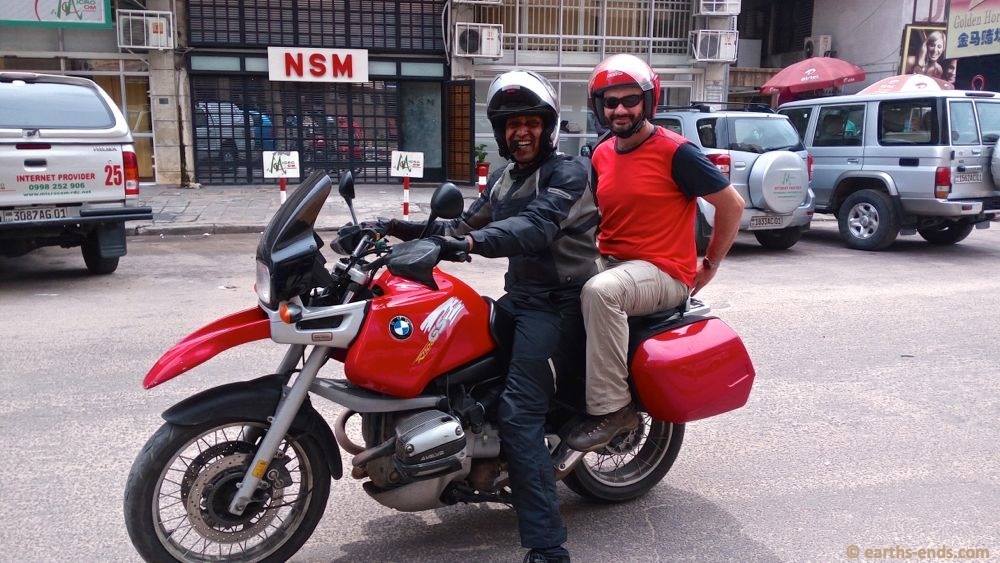
Mick looking super cool while out on a mission in town with Farid.
For some unknown and completely nonsensical reason I had a really bad feeling about doing that section. I just couldn’t fight this feeling that one of us was going to have an injury on it, like suffer a broken leg. The route is pretty rough by all accounts but honestly not on the scale of what we had already done in Congo. Even so, I simply couldn’t shake the foreboding for this inconsequential section of track so pressured Michael to take the boat to Brazzaville instead. Maybe my subconscious had determined we had pushed our luck far enough and it was time for us to move on.
I knew by taking the boat we would end up spending a lot of money and be trading the easy and hassle-free land crossing between the two Congos for the difficult and hassle-rich river crossing. Mick, I have to give credit to, was somewhat receptive/resigned to my request. However, the river crossing deal was positively sealed when we learned the extent of Mick’s bike woes and even furthermore when the Bikers Kinshasa said they could help us organise and execute the crossing.
Boris used his network of contacts to get the cheapest possible rate to cross from Kinshasa to Brazzaville. Getting people and goods around Congo was his bread and butter and he knew his stuff. It was great to have him organising all this as he knew people on both sides in customs and immigration.
“The Beach” as the Kinshasa side of the river is known has has a formidable reputation. It is here that the fiercest attempts at extorting foreigners has been known to go down. It is not uncommon to hear of Overland bikers spending the good part of the day, significant reserves of patience, and $400 and up for the 1.8km, 15 minute boat crossing. Others have paid less, others had paid more, and others still have been sent packing (at their own expense) back across the river for failing to meet some real or manufactured immigration requirement and subsequent bribe demand.
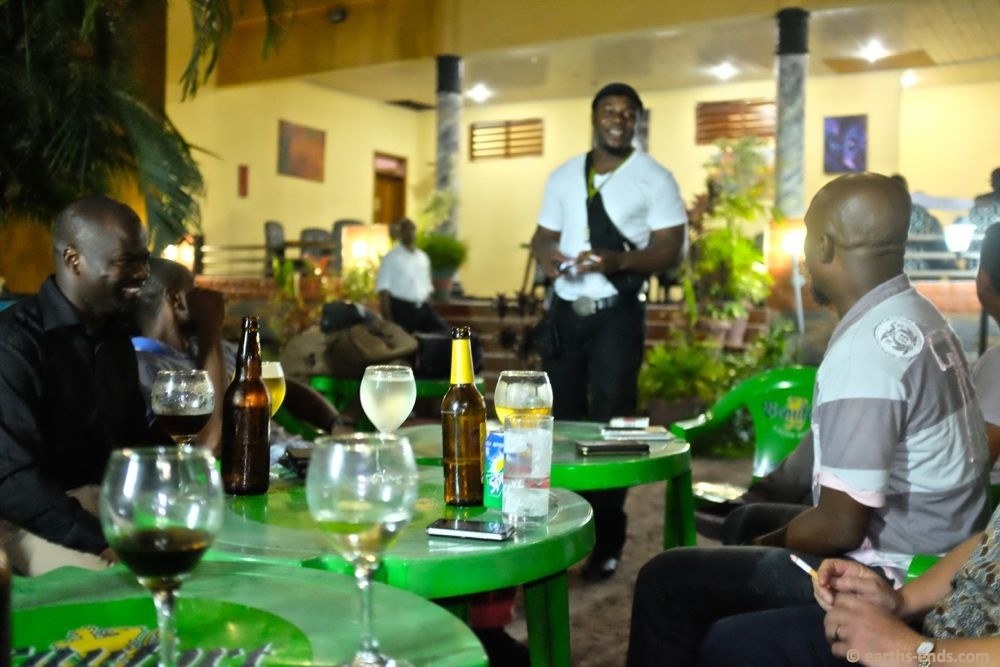
Patrick giving us a welcome speech on behalf of the club.
Boris was informed that the best way customs would permit us to cross with the motorbikes was to charter a boat to ourselves. Customs would not allow/make trouble for us if we put the bikes on a boat for ferrying people, and it would be problematic to get on a boat for goods and freight. So it was best to hire a boat specifically for us. Boris did however go to bat for us and negotiated that customs would allow us to take 4 ticket paying passengers on the boat which would slightly offset the cost of our boat charter. Even at the time we were thinking, “that certainly sounds nice, but what’s a bet it doesn’t go down like that at the docks!” Sure enough it didn’t but it was a valiant attempt on Boris’ part regardless.
We had expected the cost of the crossing to be huge, but in the end it was far more reasonable a deal than we would have been able to secure ourselves. Everything included, we paid USD335 for both of us and both bikes. That is pretty dear for a river crossing, but that is as cheap and trouble free as it gets. I felt financially guilty for not wanting to go the cheap route of taking the Luozi road. But Mick said given his current bike issues it was a smarter move to take the river.
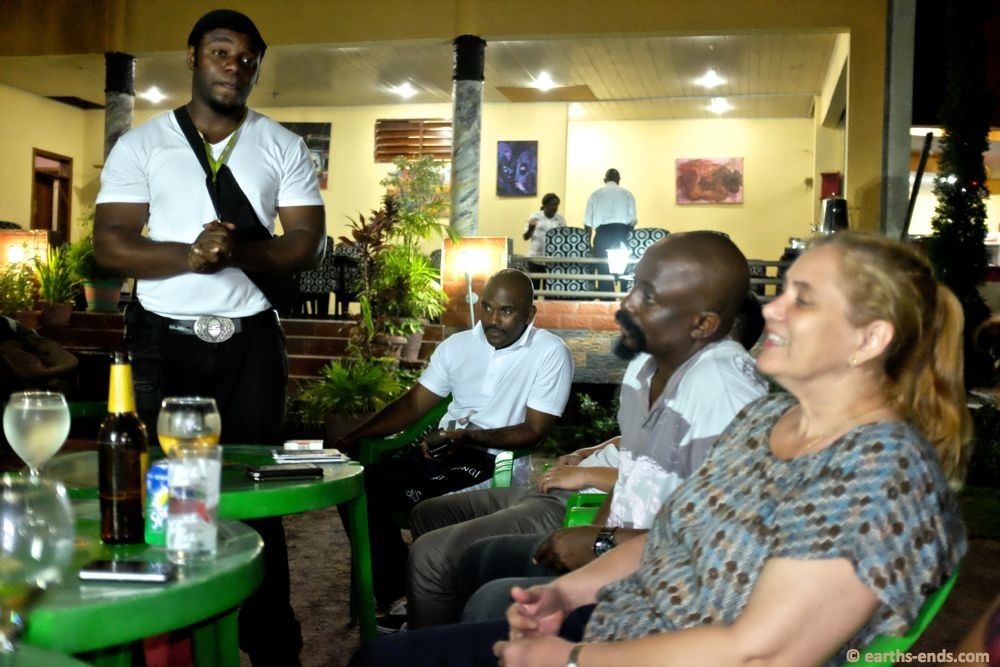
He passed on the message that the club president regretted he was out of the country and could not meet us.
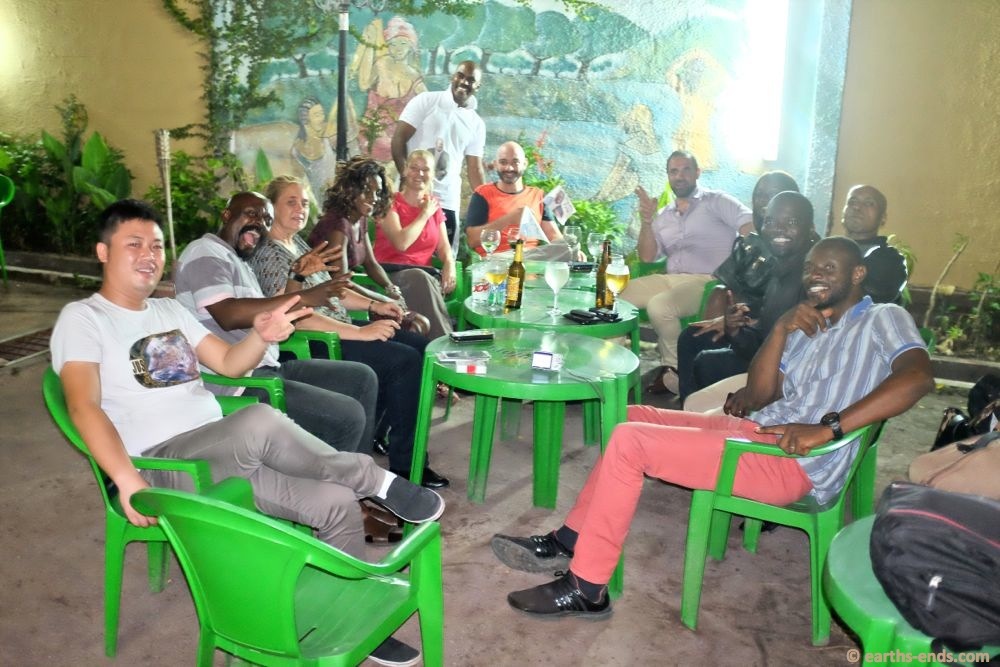
Boozing it up at our hotel.
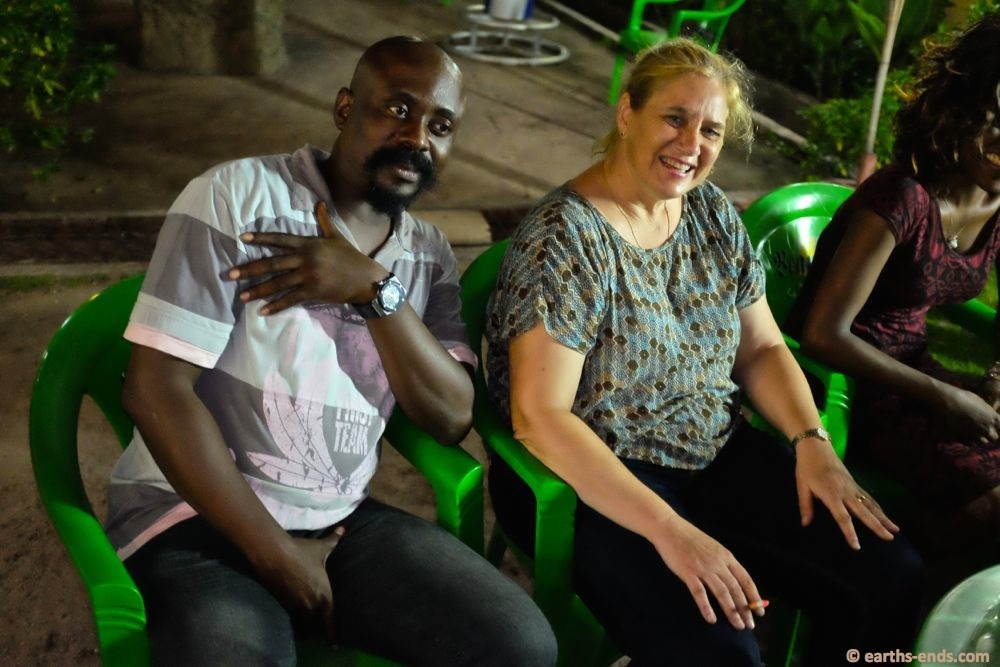
A club member with a rad beard whose name I don’t recall and the lovely Christine, a Belgian who has lived in DRC since she was a child.
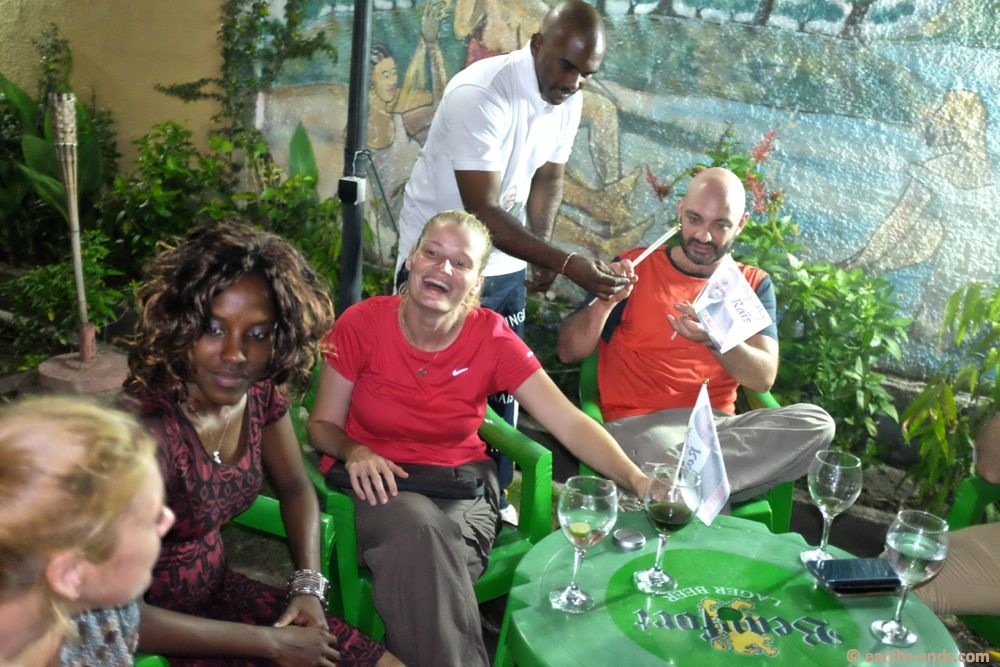
What a treat for us to have a group of mates again.
With that we were committed to crossing the river and Boris did us another solid by getting his staff to do all the running around for our Republic of Congo visas. We just filled out the forms and handed over our cash and passports and let someone else do the dirty work. Now this was a style of Overlanding I could get used to.
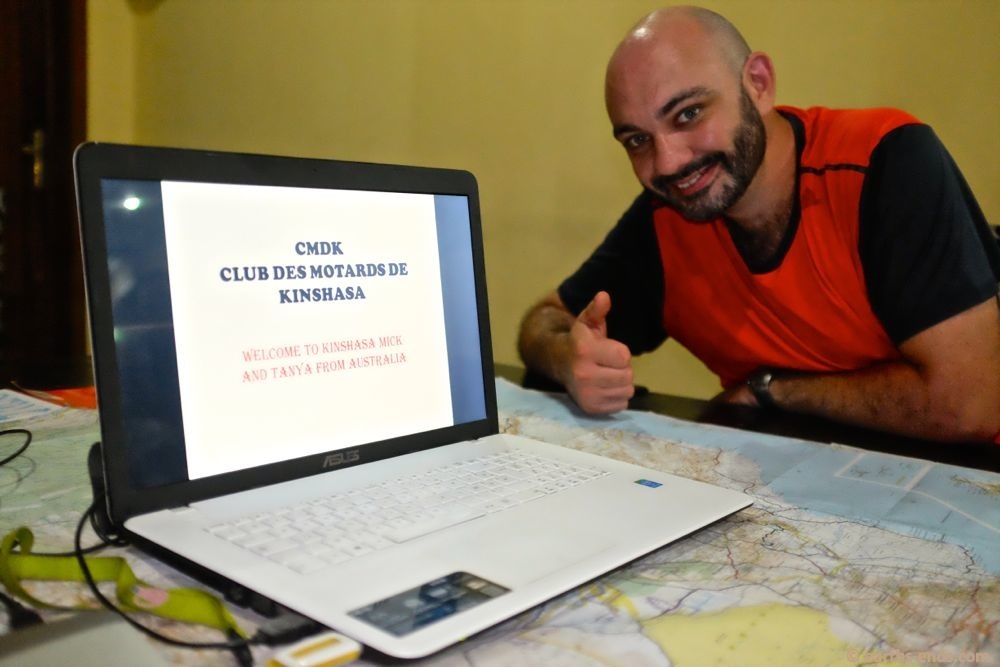
The club had even gone to the trouble of preparing a welcome slide show for us with all the previous days photos of our ride into town. These guys are legends.
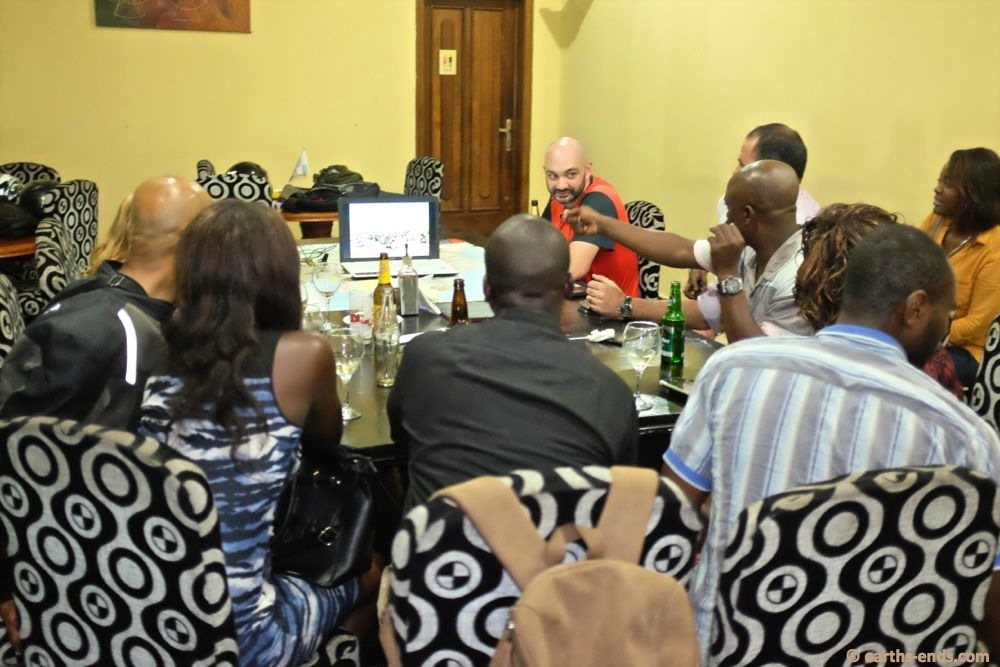
Our turn.
With the wheels in motion for getting over to Brazzavile we were free to get to know Kinshasa a little better. First up we were off to lunch with more of the Bikers Kinshasa crowd and once more they refused to let us pay our way. After socialising the afternoon away it was time to return to the hotel to get ready for more socialising with the bike club there. That night we ate, drank, talked and did a slideshow of our travels thus far in Africa.
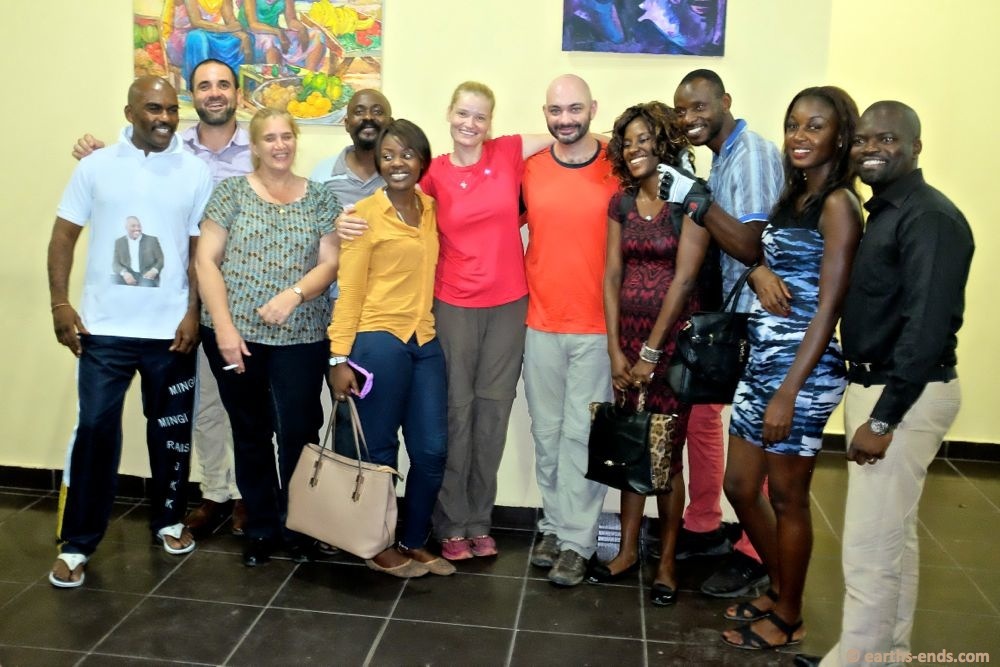
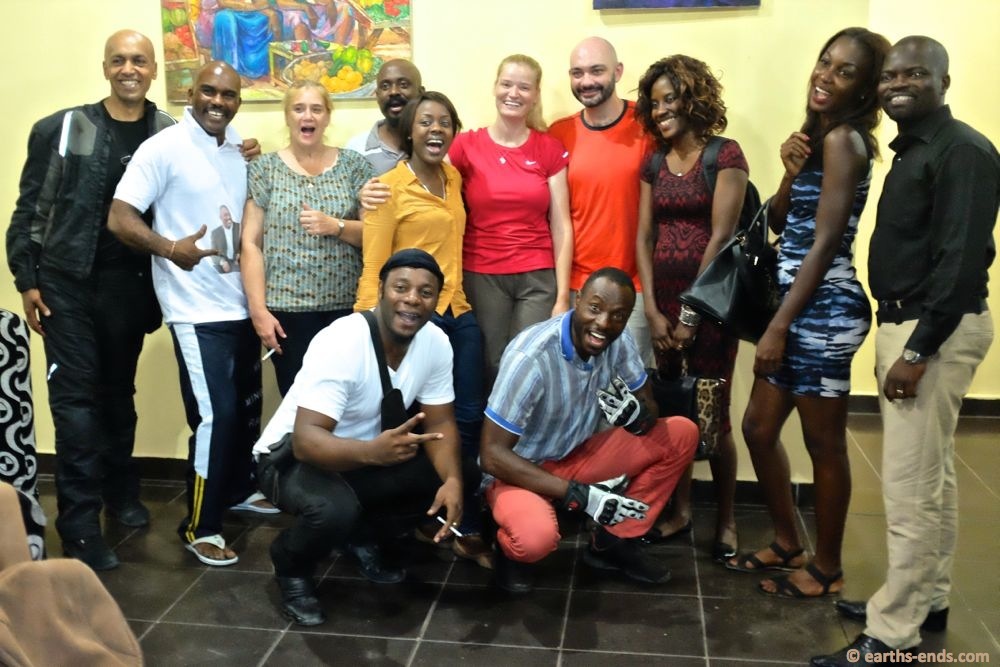
With company like this to enjoy it is no wonder we decided to stay on in Kinshasa longer than the couple of days we had initially planned. We mentally expunged from consciousness the $US75 a night we were paying for our hotel and resolved to enjoy our time with the bike club in Kinshasa to the full. Budget be damned! We must explain here, 75 bucks is bloody expensive for us but Kinshasa is one of the most expensive cities in the world for expats, generally coming in second after Luanda, Angola. The cheapest decent hotels going are around USD50 but it was the advice of the Bikers Kinshasa that we wouldn’t be safe in a neighbourhood where those types of hotels are. So they vetted our hotel for us and negotiated a good rate as well (normal price was about 110), and we took their advice onboard and ignored the cost.
How to describe Kinshasa? A random Lonely planet writer actually captured the essence of Kinshasa quite well I think with the following statement:
“Shot through with chaos, music and a lust for life that is as infectious as it is overwhelming, Kinshasa is a city you experience rather than visit.”

We don’t make a habit of taking photos in big cities so here is a pic off the net of a typical Kinshasa scene.
Kinshasa, or just ‘Kin’ as it is locally known, had all of the hallmarks of any of the African capitals we had visited; erratic driving, street hawkers working every traffic light and thoroughfare, prodigious potholes, lack of infrastructure, abundance of rubbish, saddening levels of poverty, and flashes of utterly gratuitous wealth. But there was something else that made Kin stand out from the crowd. I just couldn’t pinpoint exactly what that was. It may have been the frenetic energy of the daily hustle of making life in this tough city; it could have been the world famous music and the vivid colour on display; it could have been our enthusiastic company among the bikers; it could have been the fact we were on a high from our big ride… but whatever it was it was it drew us to the place. Still now I get a buzz from the memory of our time there and wish so much we had stayed longer… or in the very least that we will find our way back there again.

And another loaner from the net.

So much colour. A photo of one of Kin’s markets by Pascal Maitre for Nat Geo.
Kinshasa heaves under the weight of one of the world’s fastest-growing urban populations. The last census conducted in Kinshasa was back in 1984, so no one really knows precisely how many people call it home. Most estimates are between 10 and 11 million. And they say half a million join the throng every year. It is not surprising therefore that Kinshasa is on its way to being the largest French-speaking city in the world, with Paris just a few years from being relegated to second place. Though Lingala is the common tongue in these parts, I’m ashamed to say we didn’t learn a single word of it.

Kinshasa..expanding by the minute.
Kinshasa spreads itself from the banks of the Congo River to its ever-expanding shanty towns on the city’s periphery. The city centre or centre ville as it is called there, displays the greatest concentrations of the city’s wealth and it is where the elites and expats reside, congregate, move and shake. In these parts you’ll find nice cafes, restaurants and Shoprite supermarkets filled with processed food from South Africa and Europe. Outside the city center, you’ll find no such prosperity, and the bulk of Kin residents are left to make do any way they can.

The slick part of town. Internet pic.
Most of those writing and reading this blog would luckily lack any concept of the extent to which the local population is completely left to its own devices. The government fails to provide even the most rudimentary level of services and the people have in turn long abandoned any expectation for government support. Schooling is supposed to be compulsory but its cost remains out of reach for many. Running water, electricity and sanitation are at best unreliable but more generally non-existent. But despite this it would be unfair to characterise the city merely by what it lacks. What struck me and what strikes many who visit is that it is a marvel that the city manages to function as well as it does. And it really is the local populace that deserves the credit for this.

The Boulevard 30 June in Downtown Kin. This 8km stretch of road was refurbished by Chinese companies for a cost of $US43.4 million. This project was just a small part of a $US3 billion infrastructure for minerals deal between China and DRC. The construction of the road from Lubumbashi to Kinshasa we came across is also part of the deal along with a heck of a lot more infrastructure DRC desperately needs.
The DRC has long teetered on the edge of full and official state failure. The ever-resourceful Kinois therefore have had no recourse but to create their own opportunities, which they do through frenzied entrepreneurship and the reliance on community networks and relationships with friends and family. What the state denies the informal system does its best to provide.
On that note, this seems a good time to mention that Kinshasa has its own nuclear reactor. Yes, this sprawling metropolis of indeterminable millions, lacking reliable running water, sewerage and electricity, shockingly has a nuclear reactor. Two actually. Back in the 1950’s a Belgian priest was running the University of Kinshasa and thought it would be great if he had a reactor on hand to indulge his amateur interest in nuclear research. He lobbied the Belgians to lobby the Americans to give them a their own nuclear facility to commemorate DR Congo’s part in the birth of the nuclear age. The US obliged.

The reactor building in question.
In 1958 Congo’s first nuclear reactor was constructed at the University of Kinshasa with the second coming in 1972; ample time to rethink the wisdom of the decision one would think. But it wasn’t until the 1990s that the US seemed to acknowledge the non-ideal nature of having a couple of nuclear reactors in a state of decline in the perennially unstable Congo. The US cut off access to spare parts hoping that would convince them to shut up shop. They did not, and instead were just pushed to improvise their own ingenious solutions – DIY nuclear reactor maintenance, if you will. One reactor has been out of action since 1970, while the second stopped functioning in 1992 after electrical problems rendered the reactor impossible to control. At last count the reactors held 138 nuclear fuel rods. The result being huge risk for zero gain, beyond being able to puff our your chest at having your own nuclear reactors.
Naturally the International Atomic Energy Agency sees the existence of the reactors as a disaster waiting to happen. One such disaster would be having radiation contaminate the water supply of the 11 million people living on the reactors’ doorstep. The fact that the reactors are built in an area known for subsidence means it is a real possibility. The reactors however aren’t just at risk from below, in 2000 one of the reactor walls was struck by a piece of metal that either came from a missile or metal that fell from a plane flying overhead.
And if the accidental release of nuclear material isn’t concerning enough, consider the intentional stealing of it. Security at the facility is lax to say the least. There is no video surveillance and the fences around the facilities have holes and large gaps that many university students use as a shortcut across campus. Farmers grow vegetables in the reactor facility next to the nuclear waste storage building.
In the late 1970s a previous director of the facility lent someone his keys, apparently not realising the master key to the reactor was on it. The key disappeared along with two rods of enriched uranium. Back in 1998 Italian authorities found one of the rods in Rome. The rod was seized from the Sicilian Mafia who were looking to sell it to buyers in the Middle East for almost $20 million apparently. The other fuel rod is still unaccounted for. True story.

The same building but with the old paint job. Fort Knox it ain’t.
According to the most recent reports on Kinshasa nuclear reactors I could find, at the moment one could access these fuel rods with just three snips of a bolt cutter. Or by paying off a guard or technical who receive on average a months salary of $100. It is no surprise then that the US government has been trying to persuade Congo to handover much of their enriched uranium. I don’t know how they have gone with that.
The following day we were helped once more by the bikers to line up our Cameroon visas. For travelling up the West Coast we have heard (and later found it to be the case) that it is generally easier to secure a visa for a country from at least one country away. Strangely it can often be a hassle trying to get a visa for a country from its neighbouring country. The capital cities of Democratic Republic of Congo (Kinshasa) and Republic of Congo (Brazzaville) are separated by the Congo River and no more than 1.8 km. These world’s closest capital cities were our last options for getting our Cameroon visas. On one side of the river we had friends to hang out with. On the other side we didn’t. It was a no brainer to get the visa in Kin.
Word was put out amongst the bikers looking for anyone who had any good contacts with the Cameroon embassy that could facilitate us getting our visas with minimal hassle. Sure enough someone in the group knew a woman who works for an African wildlife fund who regularly deals with the Cameroon embassy when securing the visas for researchers that go to Cameroonian side of the Congo jungle to study bonobos and low-land gorillas.
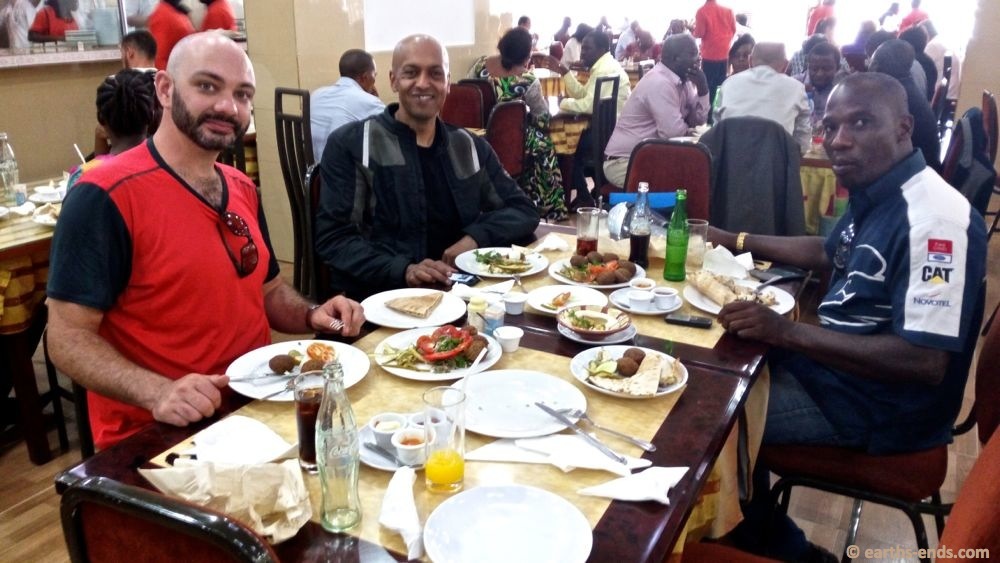
Getting an awesome feed with Farid and Joseph at one of Kin’s most popular Lebanese restaurants.
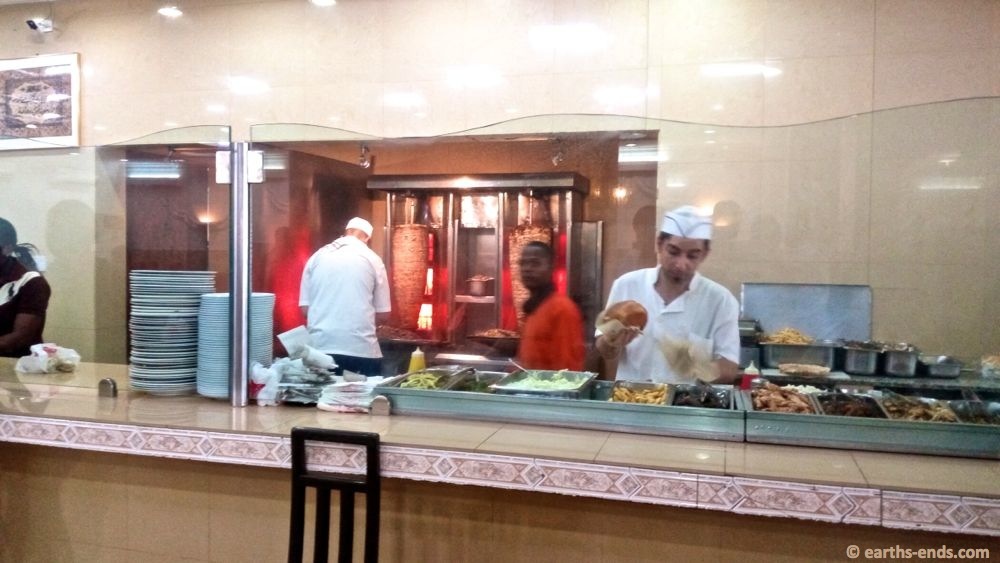
This place was pumping….and surprisingly cheap for these parts.
The lady came with us to the embassy and through her we got an audience with the advisor to the consul and he basically said ‘no worries’ we could get the visa despite not having an air ticket, address or invitation letter as if officially required. All we then had to do was pay the small fortune for the visas (US$150 each plus a little USD10 “payment” to the front desk administrator to not decelerate the process) and pick them up the next day.
We went to celebrate our visa win with yet more pizza. Once we hit the first bit of tar after our Congo crossing Mick and I had started discussing in detail all the food we were going to eat when we got to Kinshasa. We had lofty food goals. We agreed we would eat one entire pizza after the next before hitting some French patisseries hard. It therefore came as a surprise when it came to it we could only get 2/3 of the way through one thin crust pizza, working together. Our stomachs had shrunk that much on the trip. That night we caught a look at ourselves and noted how much weight we’d lost in the last 10 days. We’d guess we had both lost more than 5kg.
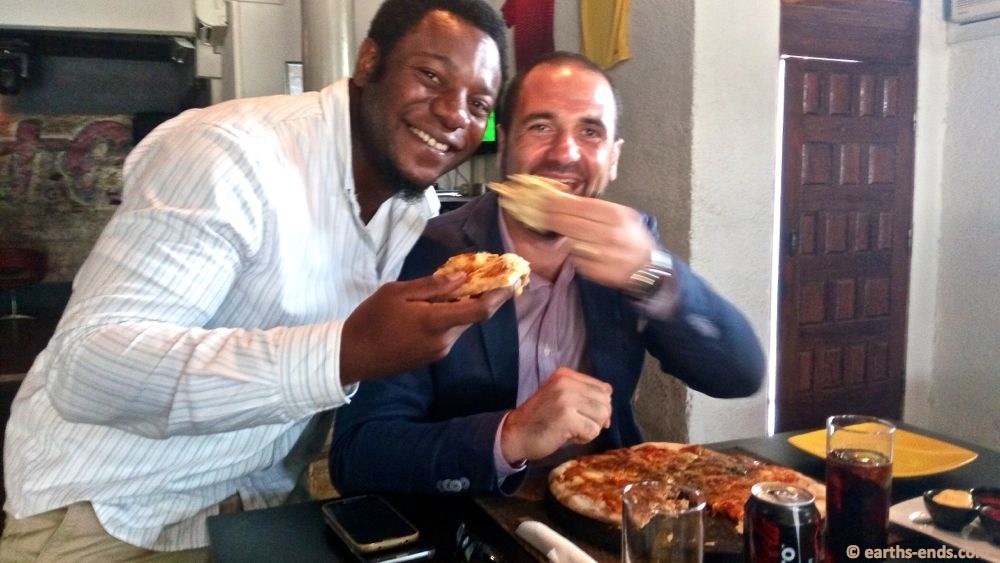
Patrick and Alberto
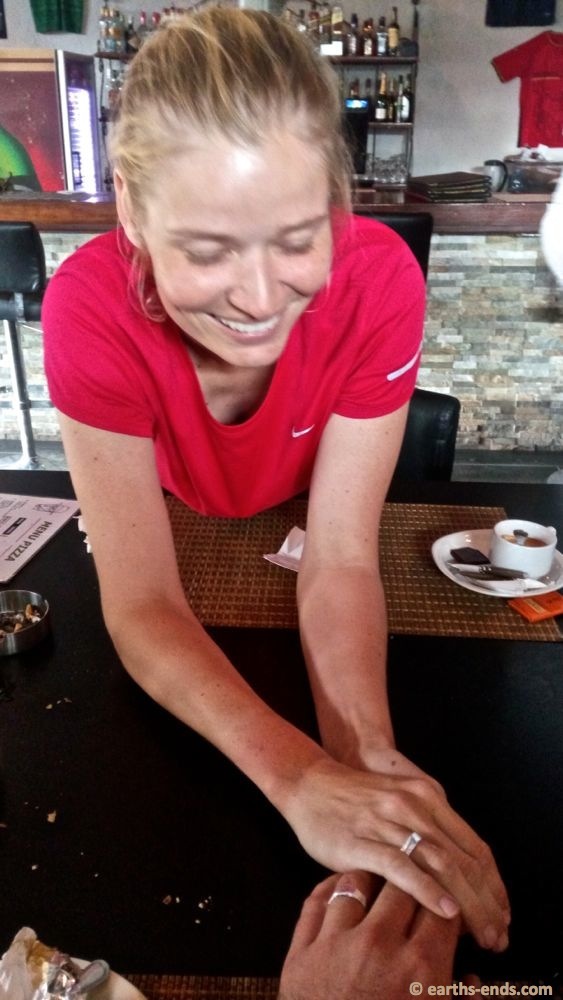
When the group found out we were engaged they fashion some rings out of tin foil and insisted on a very public faux marriage in the restaurant.
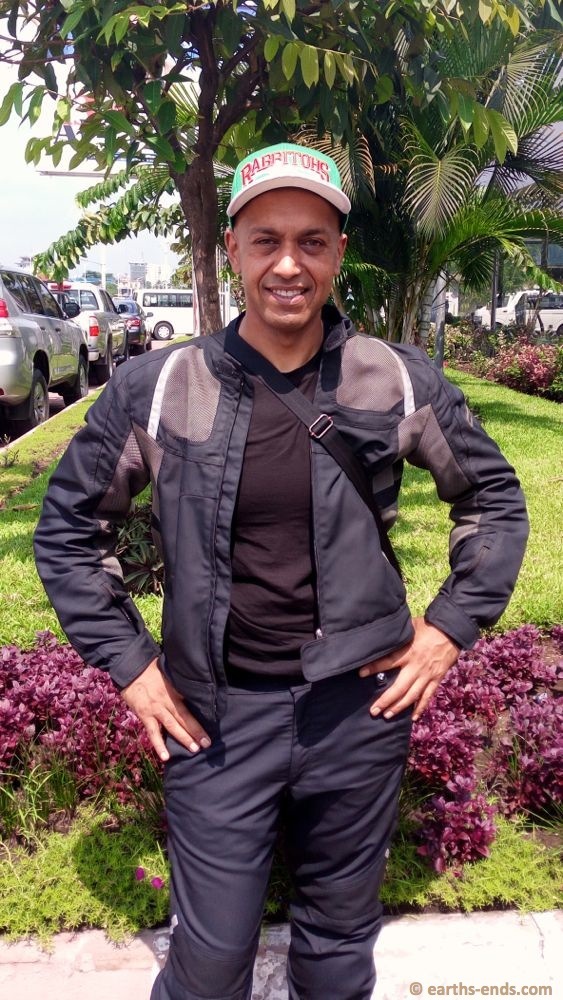
Farid sporting a South Sydney Rabbitohs cap
With most of the logistics sorted Mick then set about getting the bikes in order while I got a blog uploaded while the wifi was good. We were quite impressed with ourselves managing to get two blogs written and uploaded while in DRC. Oh how our discipline has waned since.
The bike work required was more extensive than we had expected. The off-road crossing did an absolute number on the bikes. Mick changed the old chains and sprockets over as they were completely trashed. Mick was gob-smacked at the condition of the chains in particular. Mick ordered new chains and sprockets while we were in Ethiopia to pick up in Zambia (the challenges of overlanding logistics in Africa), the intention being to pick up the chains and sprockets in Lusaka and put them on before crossing into DRC.
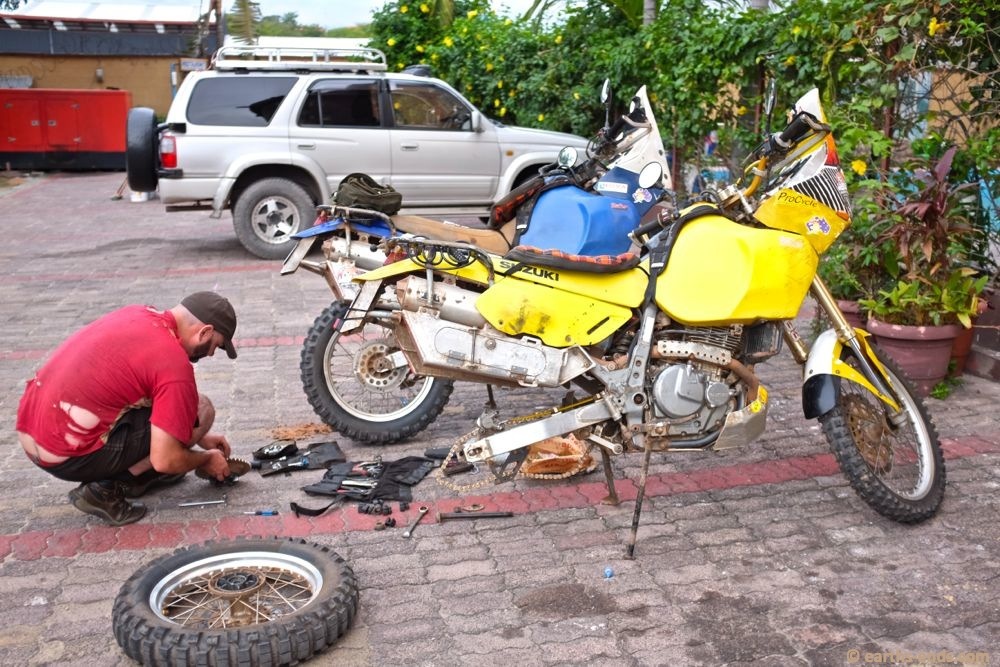
Mick getting my bike in order. Swapping chains and sprockets.
At the time of arranging for our mate to bring a bunch of new consumables to Lusaka from South Africa, our current chains had 22,000km on them. By the time we got to Zambia they’d have about 30,000km and Mick figured they would be ready for a change. Yet when we arrived in Zambia the chains were in extremely good nick. They looked like they could easily go another 4,5 maybe even 7000km, no worries.
So we were faced with two unattractive options; carry about 9kg worth of new chains and sprockets across DRC, or save weight and ditch expensive consumables earlier than necessary, and then rapidly wear brand new chains and sprockets through 1500kms of sand and mud. In the end Mick opted to take the weight hit and squeeze all the life from our current chains and sprockets while preserving our new gear for the other-side of the Congo. However, just 2500km later in Kinshasa, they were completely and utterly knackered. It appears 2500kms of DR Congo does 3 times damage of regular riding.

Not great….
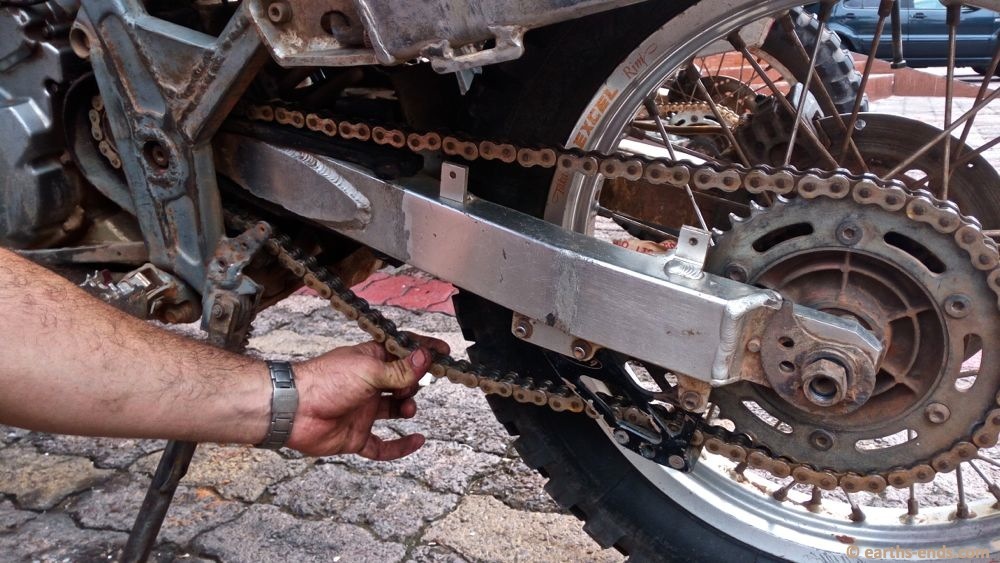
Also knackered.
Mick also changed both our front and rear brakes. Once again they were in great condition when we started the crossing. Now they were totally shot. My rear brakes were utterly gone, the mud not only took the pads but took the rear caliper rubber slide pin bushes as well, damaging the caliper and the slide pins in the process. Mick replaced these bushes, plus both bikes rear brake pads and my front pads all from spares he’d been carrying.
After getting my bike in a respectable state, Mick took his bike apart to inspect the damage wrought on the trail. His bike had been getting hotter than normal while riding into town, which pointed to trouble. Cleaning the mud out of he oil cooler helped, but didn’t resolve the problem. On top of that, his new clutch was slipping.
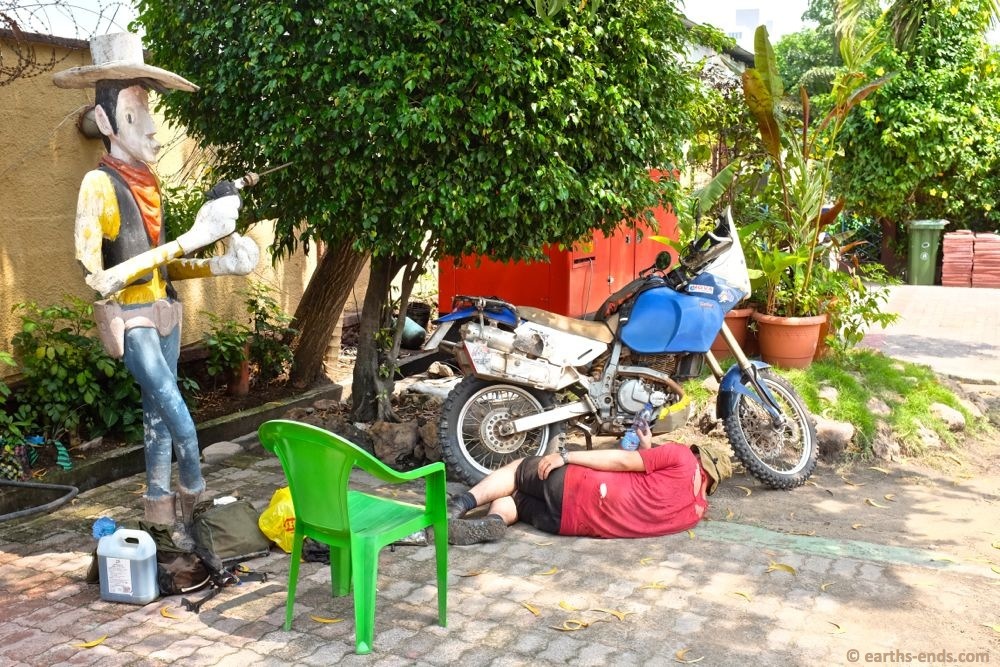
Not the first or last time we would sully a nice hotel car park by turning it into a workshop.
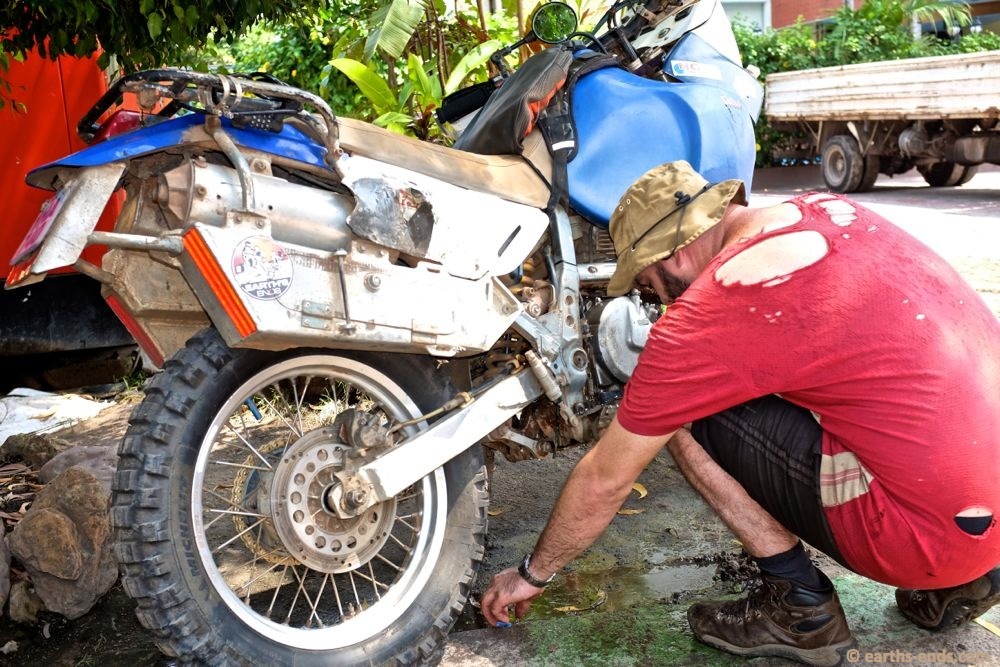
First up he took out the clutch and cleaned up all the grooves in the clutch fingers with sandpaper, and also filed off the sharp edges of the clutch basket’s broken finger. We also roughed up the clutch plates with sandpaper. Next up Mick pulled out the oil filter and immediately realised something he had failed to consider while undertaking his roadside clutch repair days back. The heat, crowds and exhaustion led to a lapse in judgment that went on to dog Mick’s bike for months and months.
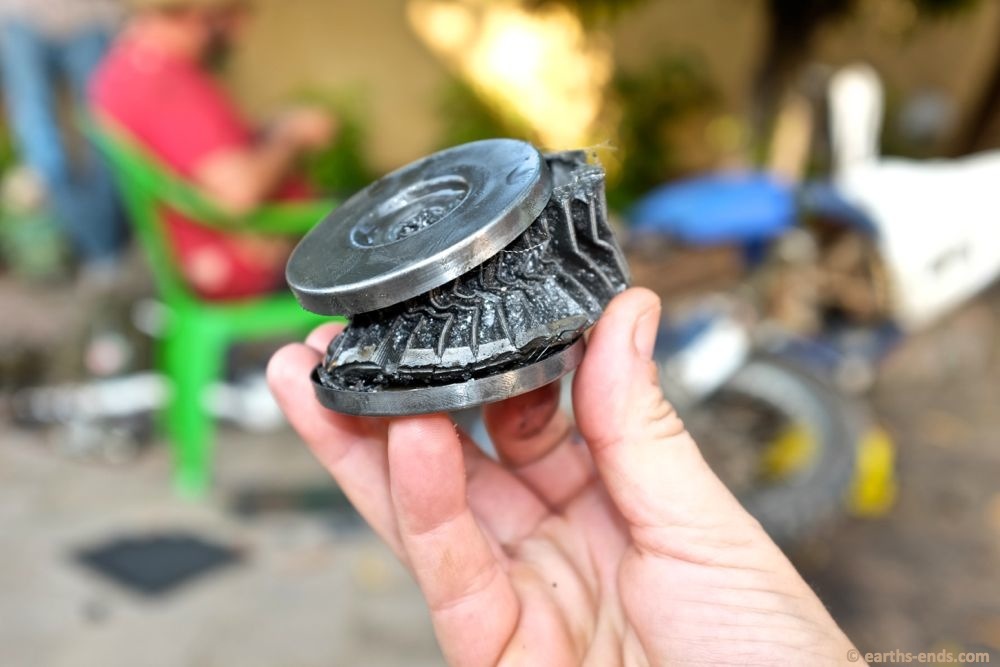
Stuffed oil filter full of bits of clutch. It is pulled apart a bit here as Mick wanted to see if anything got past the screen.
The filter was completely destroyed, having become so full of debris from the damaged clutch that it blocked the filter to the point the pressure collapsed it. It certainly explained why the bike was getting uncharacteristically hot. Mick kicked himself for not doing a proper oil change and removing the metal filled oil while we had the chance in Kikwit. Instead we somehow forgot about it and rode the 525km to Kin. Mick couldn’t believe his oversight, I could – we were just so physically and mentally exhausted and not thinking properly. First things first then; we needed a new oil filter.
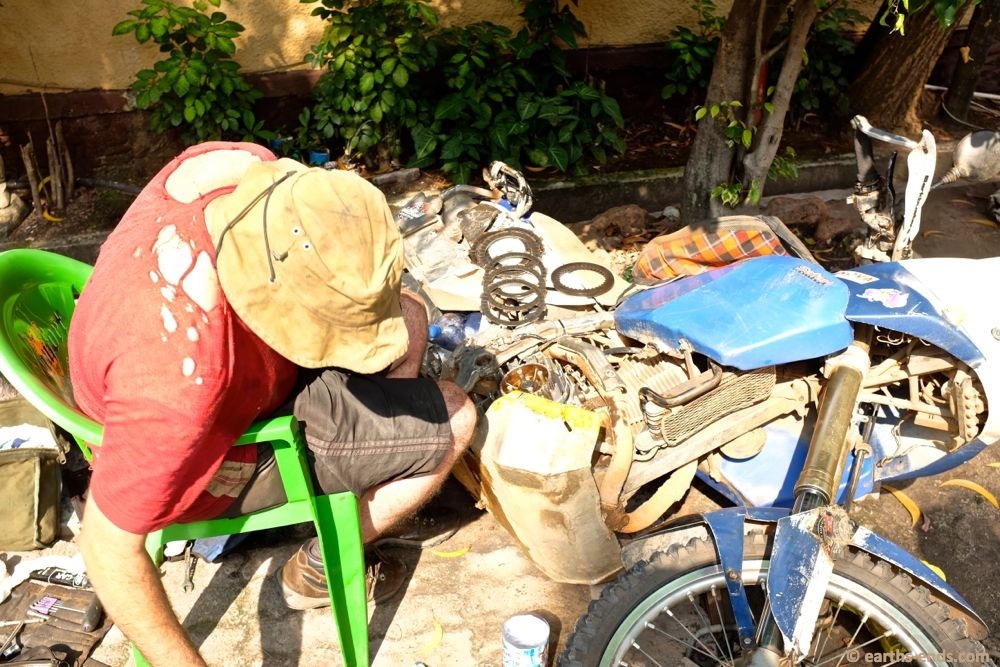
Mick seriously thinking this shirt is still has good life in it.
I went off with Patrick and Christine to try and source a new filter. We hit a few of the Kinshasa’s bike shops with no success – Africa, in general, simply does not provide service to bikes bigger than about 150cc. The oil filter search granted the opportunity to see that less polished parts of Kinshasa than what we were exposed to in the glossy centre ville. We drove past markets and down streets full of secondhand clothing stalls. The individual stores were immaculately organised and all specialised in a different type of clothing. Stores were perhaps 2.5m wide with their wares displayed prominently on propped up sections of canvas that extended high above, creating 12ft walls of clothing. I saw stall after stall of high-visibility work uniforms, domestic staff uniforms, school uniforms then walls of countless, pristine white martial arts uniforms; tae kwon do uniforms from a club in Miami, a Karate uniform from another club from Germany.
Absolutely everywhere you go in Kinshasa you see members of the ‘marche ambulant’ – the walking market place. This would have to be the most common form of employment in the city. It’s a tough existence that has people spending all day walking the city with a collection of goods and the hope of running into a person looking to purchase that precise item. You see this kind of thing all over Africa, but like with everything, the Kinshasa version is more extreme.
You’d see people selling sunglasses, a pair of dress pants, some straw baskets, phone chargers, belts, steering wheel covers, bottles of water, packets of tissues… anything you could imagine really.
We saw one man selling a huge oil painting of a river scene. His instincts for a sale were so strongly developed he seemed to sense the moment I looked at him from the second floor of an open-air restaurant on the other side of the street. He looked up at me and raised the painting in view of a sale. I couldn’t help but wonder what his chances were of coming across someone in town who happened to be in the market for a 4-foot oil painting. Would be trying to sell this thing for weeks? Months? Or would fate smile kindly and line him up with someone who just so happened to be in the market for a huge ass painting of the Congo River?
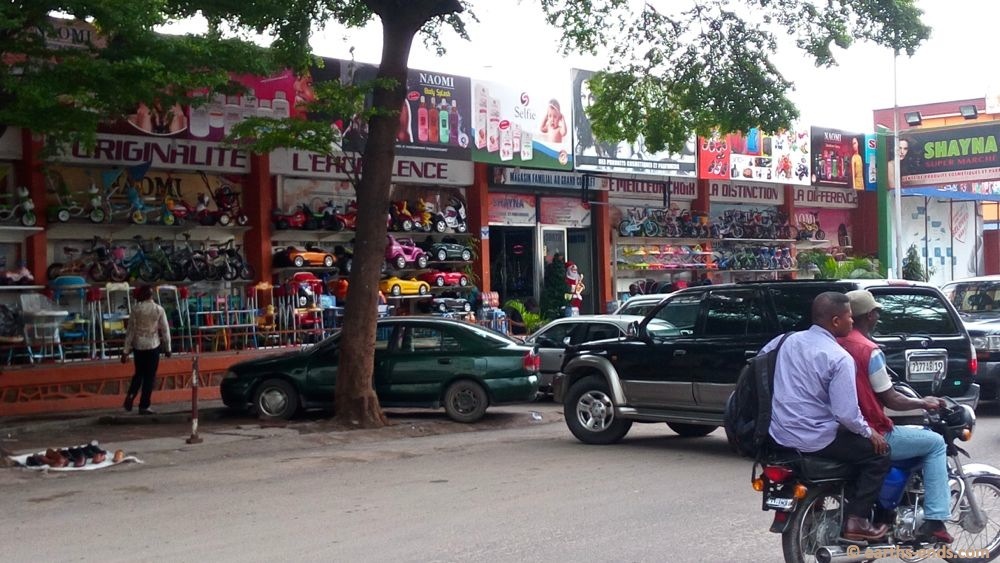
A downtown road side toy shop.
One of the best books on the DRC is David Van Reybrouck’s, Congo: The Epic History of a People. In it he shares a story of the daily life of a mobile phone credit seller that is so illustrative of the hard work and difficult existence of a member of Kinshasa’s walking market place.
The story centers around a guy named Beko, in his early twenties. He is one of Kin’s many mobile phone credit sellers. He works from 6am to 8pm, 6 days a week. On Sunday he attends church so only works from 11am to 8pm. On a good day he might sell $100 worth of credit of which $8 would go to him. But he has to pay off police up to 4 times a day to turn a blind eye to his selling in the street, which is not officially permitted. He either pays the bribes that can total up to $1.50 a day or he has his phone credit confiscated.
His bus trips to and from the city costs hours of his time and about $1.50. A simple meal for lunch might also cost him about a dollar or dollar fifty. He pays his aunt $1 a day in rent… leaving him with what now… around 3 to 4 bucks depending on bribes.. which he uses to support his brothers and sisters of whom he is the sole breadwinner. And remember – this is all on a good day. He has a university degree in education. Stories like this conflict with our general reality of effort yielding reward. That’s just not how things go here in DRC. Fate (and connections) seems to play a greater part in determining what opportunities someone has.
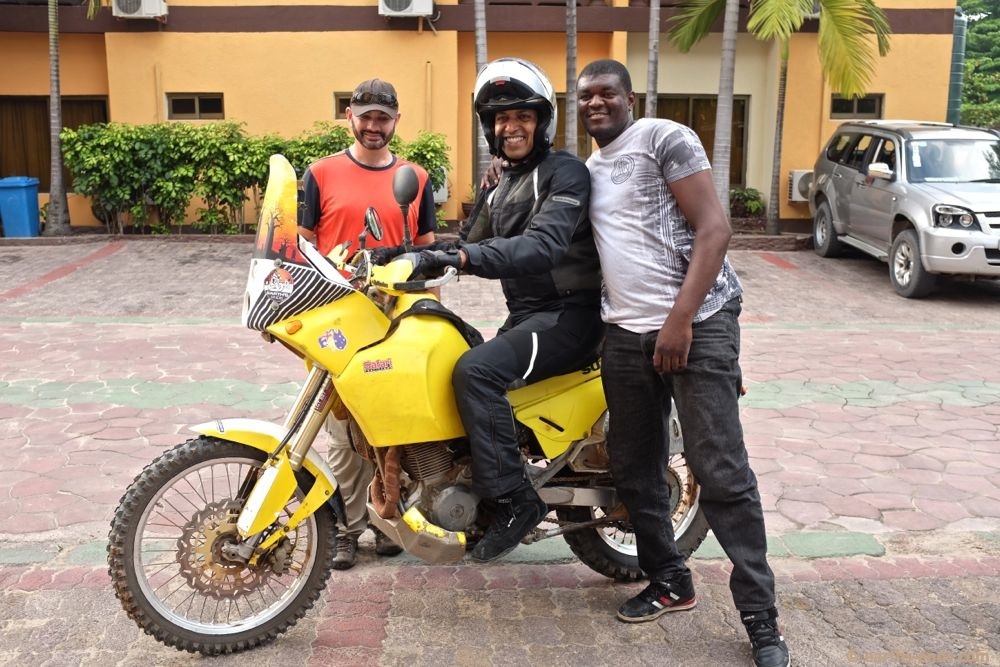
Farid taking my tired old bike for a spin. And another club member dropping in for a visit and to offer any mechanical help. This guy is DRC’s top BMW mechanic and takes care of the government’s fleet of bikes.
Anyway back to the oil filter search. It didn’t take long before we discovered a member of the bike group who was prepared to give us of his own oil filters from his Suzuki XF650 Freewind, which uses the same filter. He and his bike are based in Kisangani, far in the interior of DRC, but he was going to use his ample influence to get the oil filter on the morning plane to Kinshasa for us. There is nothing like the solidarity among bikers. We were touched. But we told him to hold on to his filter for a day or so while we continue to scout the second-hand bike markets. We didn’t want him left without spares of his own.
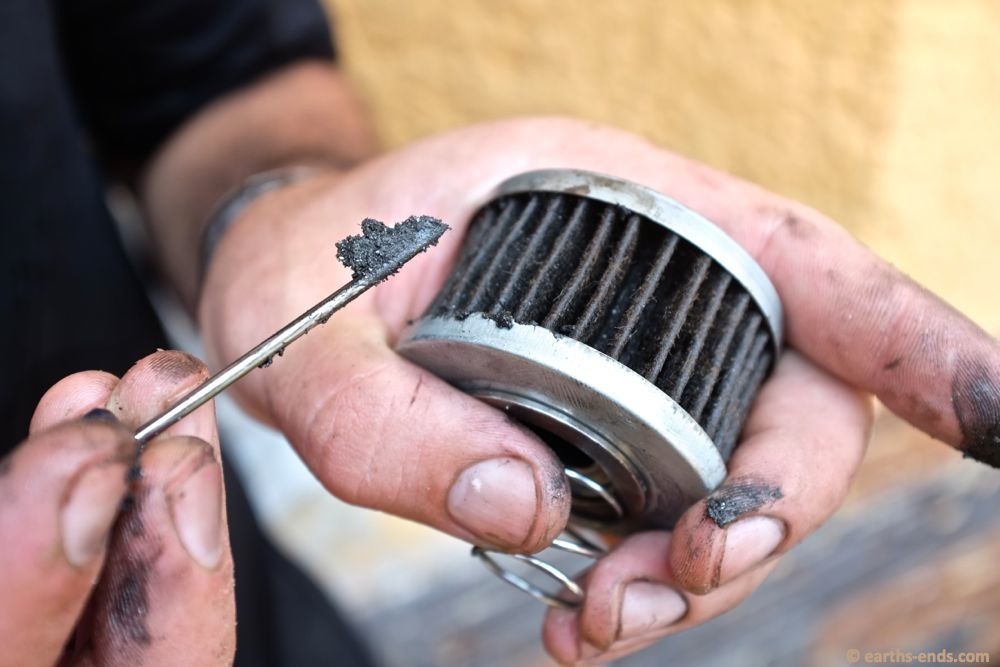
Our not like new second hand replacement. Beggars can’t be choosers.
As luck would have it another member of the bike club, Farid, spent the next morning successfully chasing a secondhand oil filter. It was over-used and utterly filthy and set us back an outrageous $US30, beaten done from a truly criminal $40. But this is Kinshasa and that’s what you pay. The stench of our desperation wouldn’t have helped.
That afternoon Farid delivered our passports complete with our new Cameroon visas. I cannot stress to you what an extreme achievement it is getting two Central/West African visas sorted in 2 days. Nothing in this part of the world is ever that easy! We shouldn’t have been all that surprised as there were indicators here and there that our new biker mates had some impressive connections in this town. One such friend of the club is none other that President Joseph Kabila himself. Kabila is a motorbike enthusiast but hitting the streets on Kinshasa on one of his fleet of bikes has long been off the cards for him. However he still appreciates bikes and it is for this reason the club has been known to pull up out front of Kabila’s residence before a group ride and rev their engines for him and get the big fella’s wave before setting off. He obviously likes this gesture, because if he didn’t…
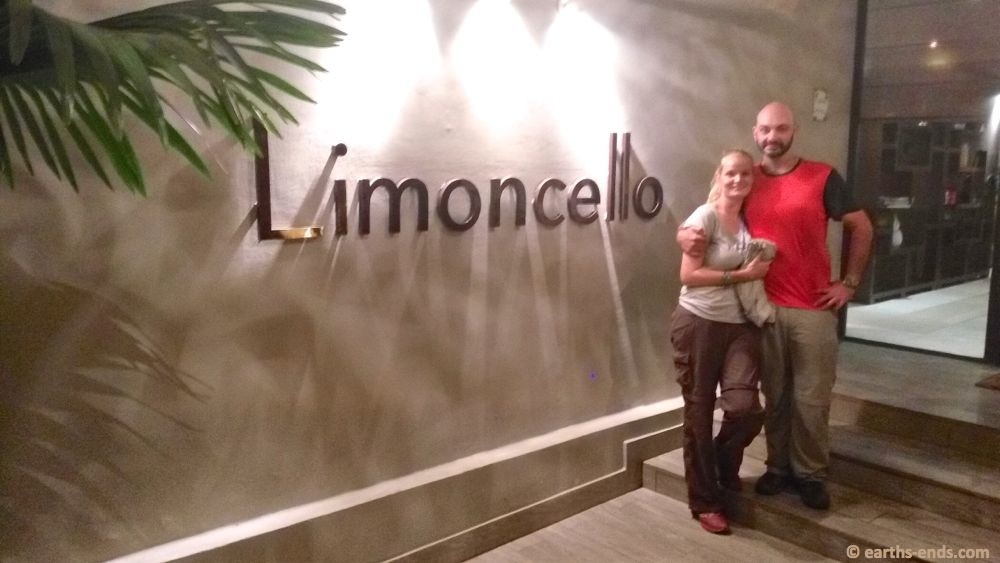
Bike club members Alberto and Farid took us out to one of Kin’s best restaurants. We were embarrassed by our overly casual attire but excited for Italian food.
With so much in order it was time to celebrate. That night we were picked up by some bikers and taken to a niteclub of Farid’s friend. We stayed at the club until a little after 2am, which was a pretty epic achievement for us as we are total non-party types.
While at the club we met an English husband and wife that are getting involved in gold mining over here. We were both impressed and befuddled that they would jump into such a specialised industry in a complicated country with no previous experience in DRC or even Africa, no established network of contacts and no background whatsoever in gold or mining to speak of. Despite appearing to have no idea what they were doing, Mick seemed to think their actual business model was sound… so good luck to them we thought. We had a feeling they’d need it, we never asked if they liked rollercoasters, but we hope they do because with no technical knowledge they were going to get taken for a serious ride. Without good sampling data and a strong background in geo-statistics, production reconciliations would be impossible and their business partners would be free to take as big a part of the pie as they dared. Blind Freddie could see DRC is the kind of place that chews up and spits out the uninitiated, naïve or even the experienced expert. I’d imaging the chances were much higher for losing your shirt (if not more) than making your fortune here.
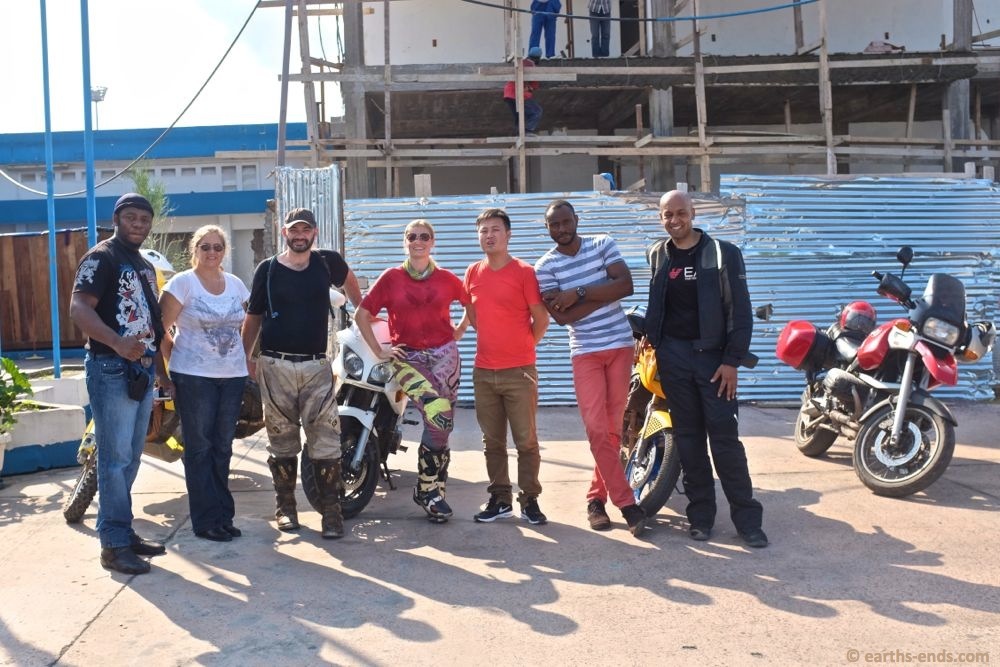
A bunch of the club members came out to see us off.
Still we couldn’t deny being utterly drawn to the place; the opportunity, the risk, the knowledge that this place might be too tough for us. We will never be the types to chase fortune, but chasing an adventure or a challenge is a different matter altogether. We started to daydream of what we might be able to do as experienced mining people here. We couldn’t help but be excited by one of the biker’s upcoming gold dredging project and enjoyed giving advice on what he should be doing with it. He offered us jobs, but we were still enjoying being unemployed… and we weren’t silly enough to think working in DRC would be easy.
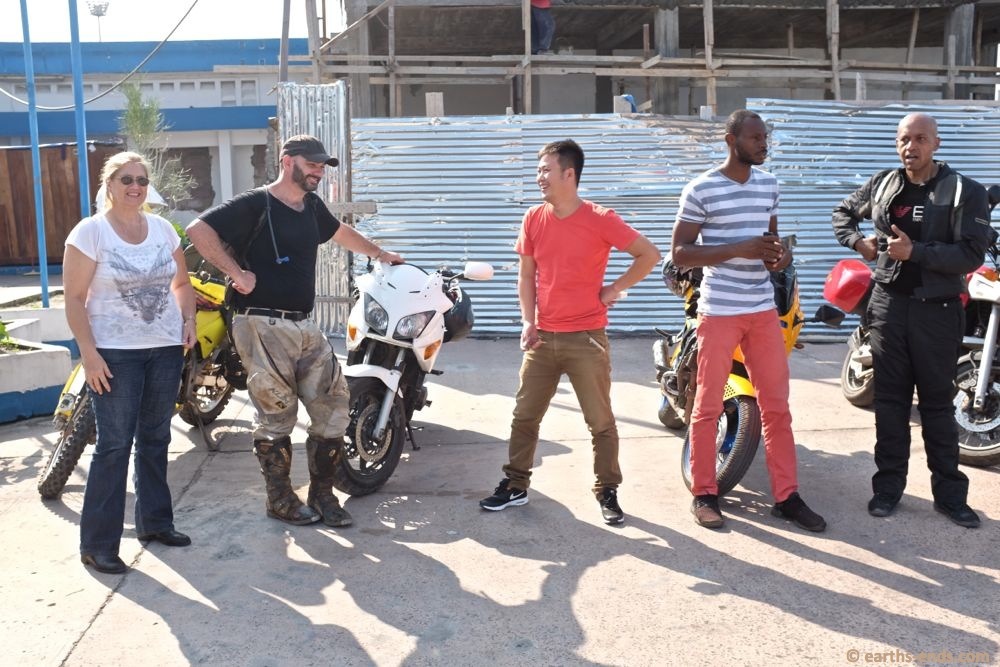
While our paperwork was getting processed we just chatted….
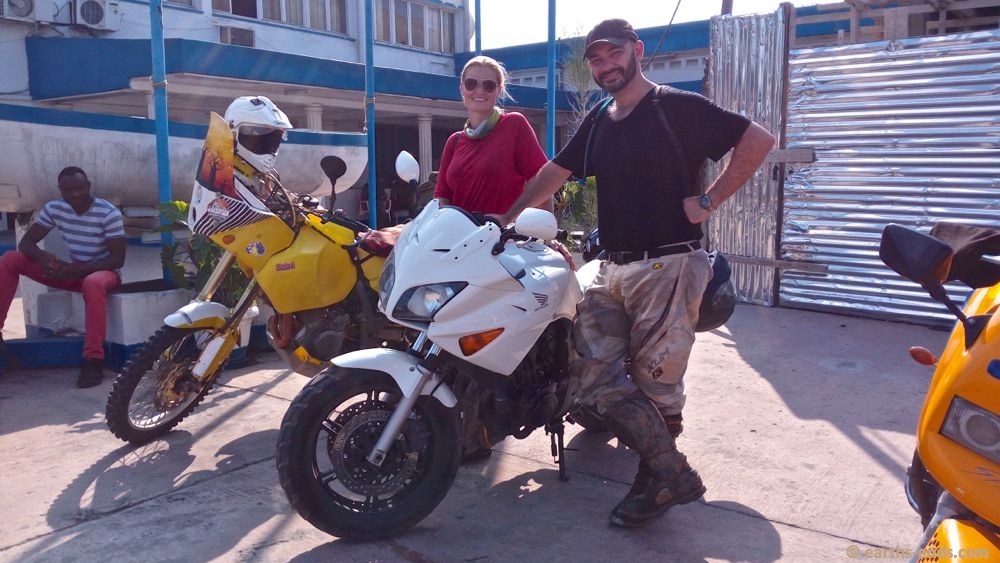
..and posed with nicer bikes than our own.
Another member of the bike club entertained us with stories of the artisanal mining exploits (in this case, panning and dredging for alluvial gold) of friends of his in the DR Congo. He spoke about how he knew or knew-of people that had made a lot of money and others that had lost a lot of money… that is really how gold fossicking tends to go when people literally just run on luck. And with that another day in Kinshasa passed.
After more time and toil the bikes were in ok condition once more. And with Kinshasa burning a hole in our pocket it seemed the time to move on to Republic of Congo, our 15th African country.
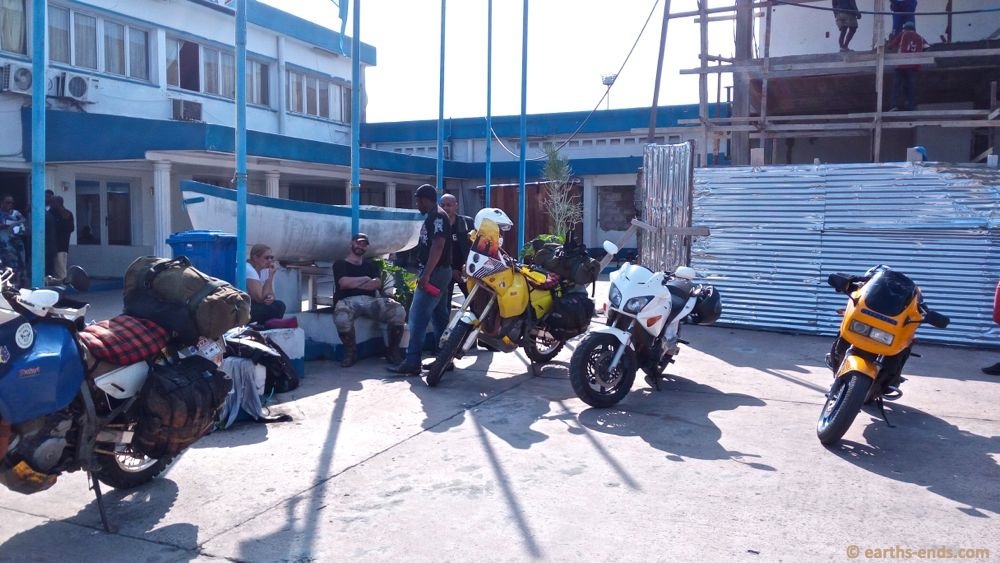
More waiting at the port.
Continuing their campaign of incredible hospitality, a bunch of the bike club members met us at ‘the beach’ to see us off. Boris had arranged for a contact to help us on each side of the crossing and I am embarrassed to say we didn’t even lift a finger to get our paperwork settled. So with no effort on our side we were soon on the boat with the bikes and making our way to Republic of Congo.
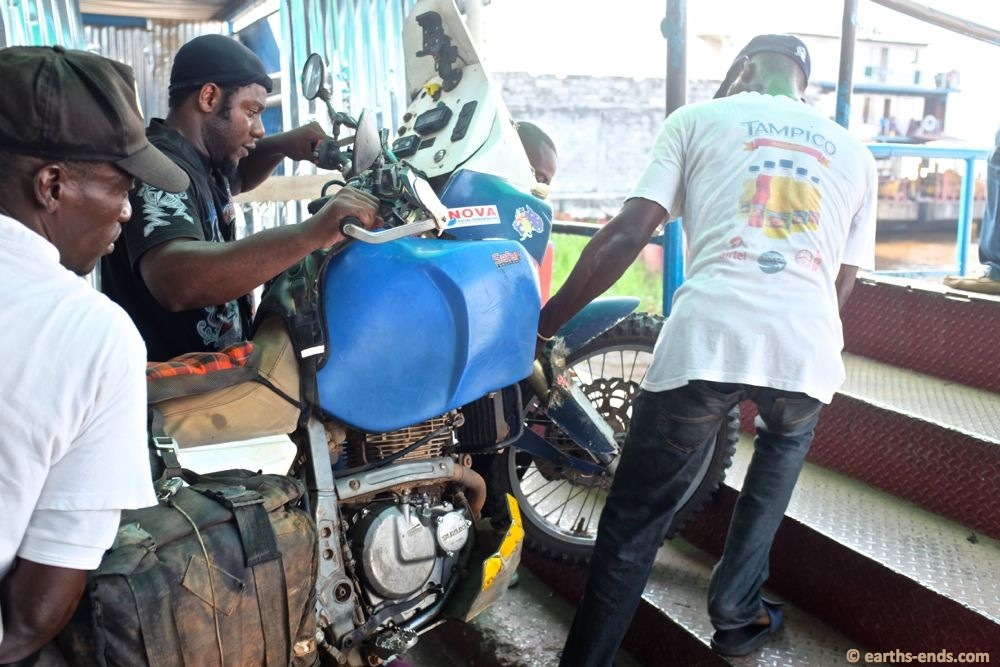
Now the interesting part of getting the bike on to the boat.
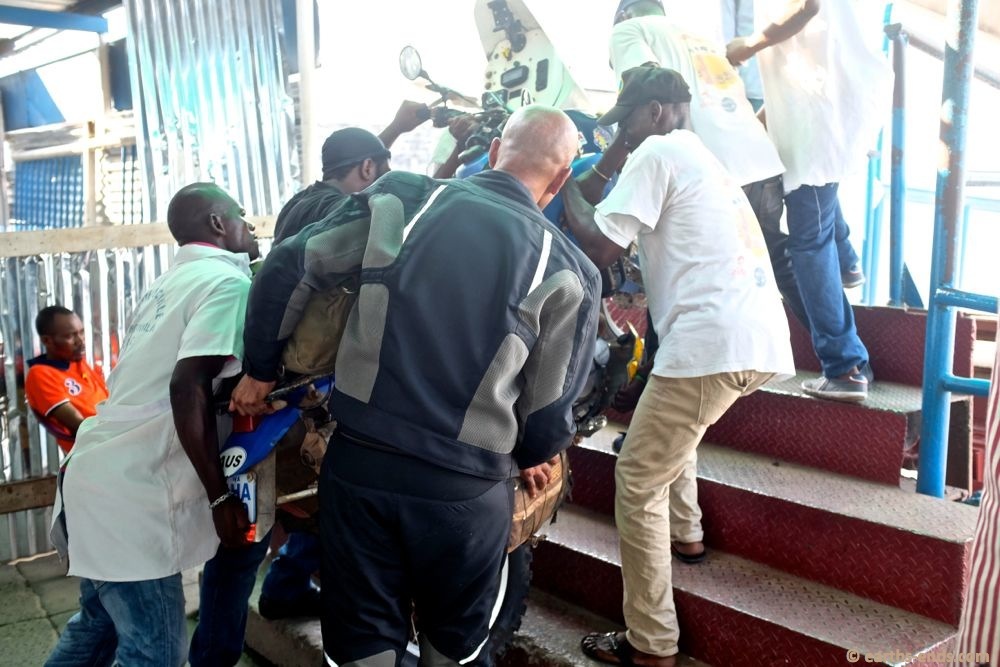
Not easy work in this heat.
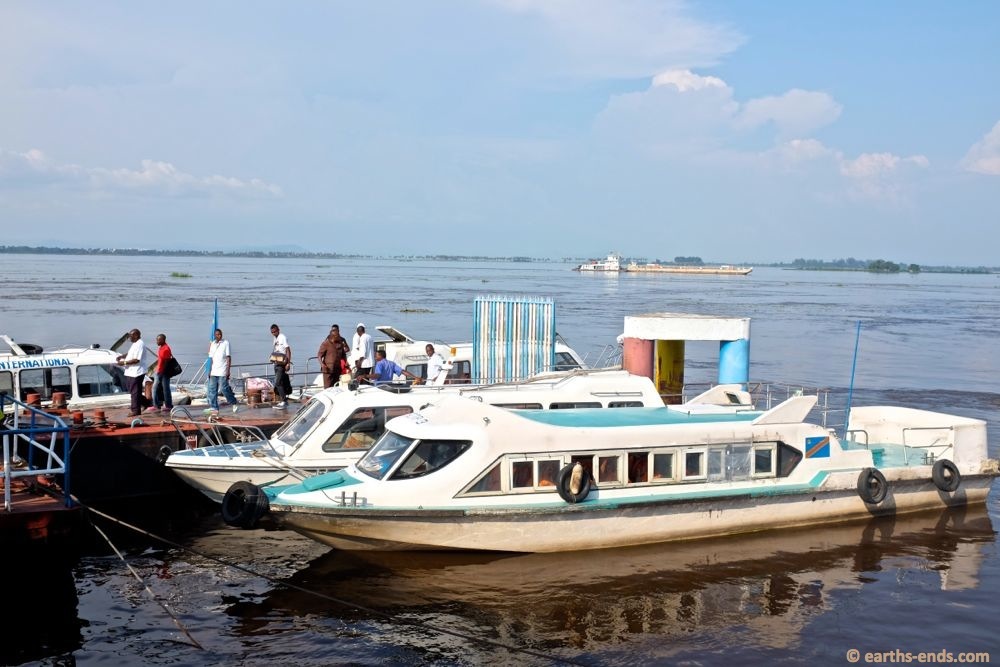
Our private charter boat.
It was a little emotional (for me at least) to be leaving such warm company and the country that had provided us with some of the most rewarding and vivid moments of the trip, if not our lives. Melancholy descended on the boat ride, though Mick might never admit to such a thing.
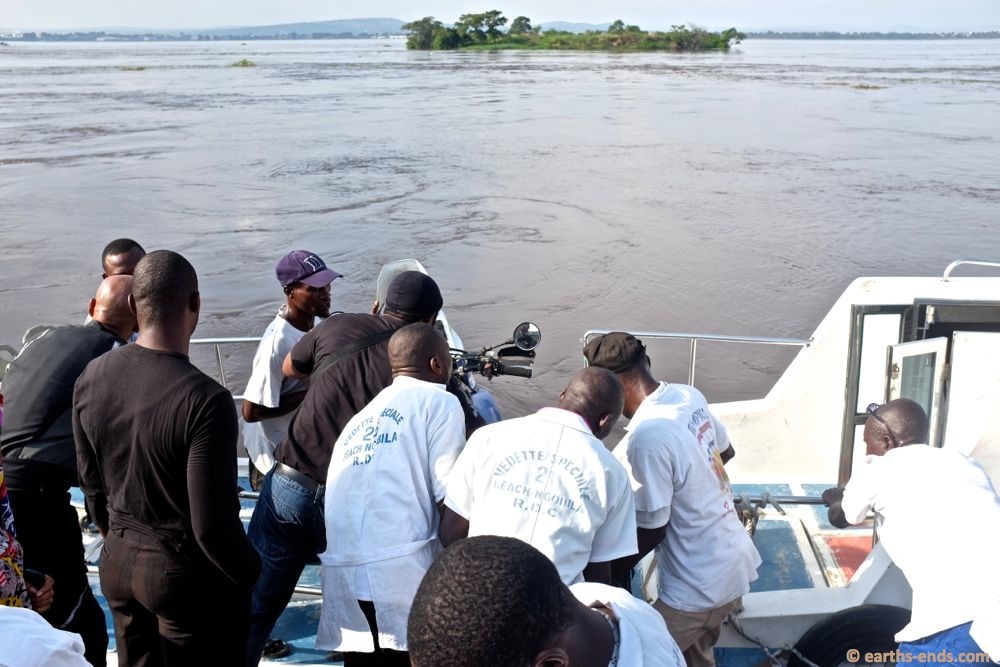
That Congo River has some current to it.
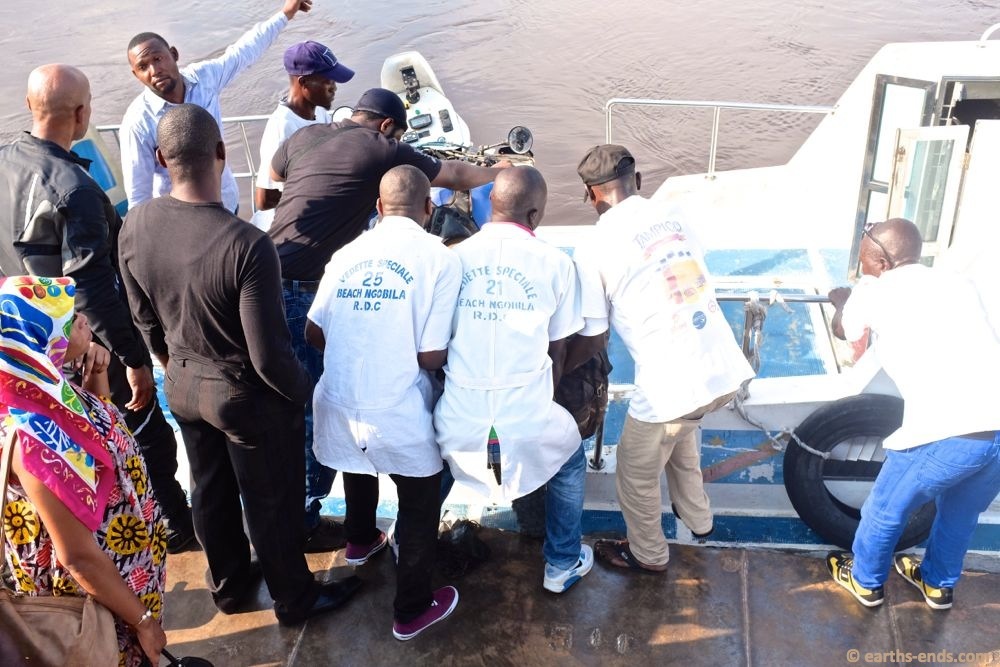
Yet more man-handling.
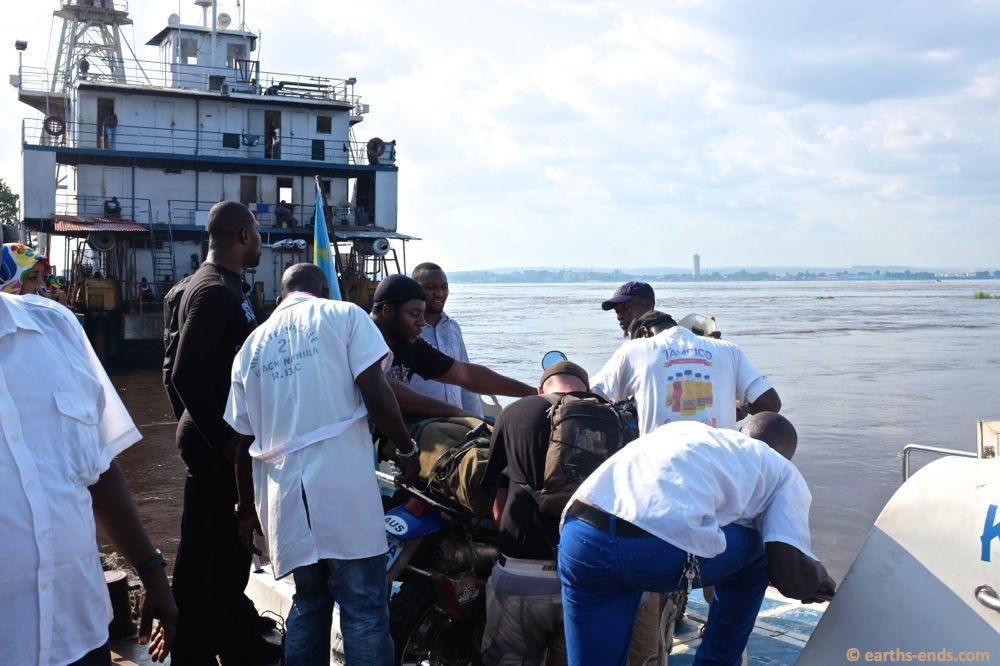
Our gloomy mood was not just a matter of struggling to say goodbye but also struggling to imagine a better outcome for this place that captured our imagination so completely. As ever the political climate in DRC at that time was not inspiring confidence and hinted at yet more turmoil and bloodshed in the near future. When we were there, rumours abounded that President Kabila’s was going to alter the constitution to allow him to serve more terms at the helm of government. Early protests to the move were met with fierce retaliation by the military with reports of up to almost 50 killed (but rumours of hundreds killed) along Kinshasa’s pristine new Chinese built boulevard we had so admired 10 months later. The fact that as I write a year and a half later the election has still not been held has confirmed the truth of Kabila’s intent to stay in power. Little good, therefore, can be expected to come from this situation. The most likely of outcomes are too sad to ponder really.
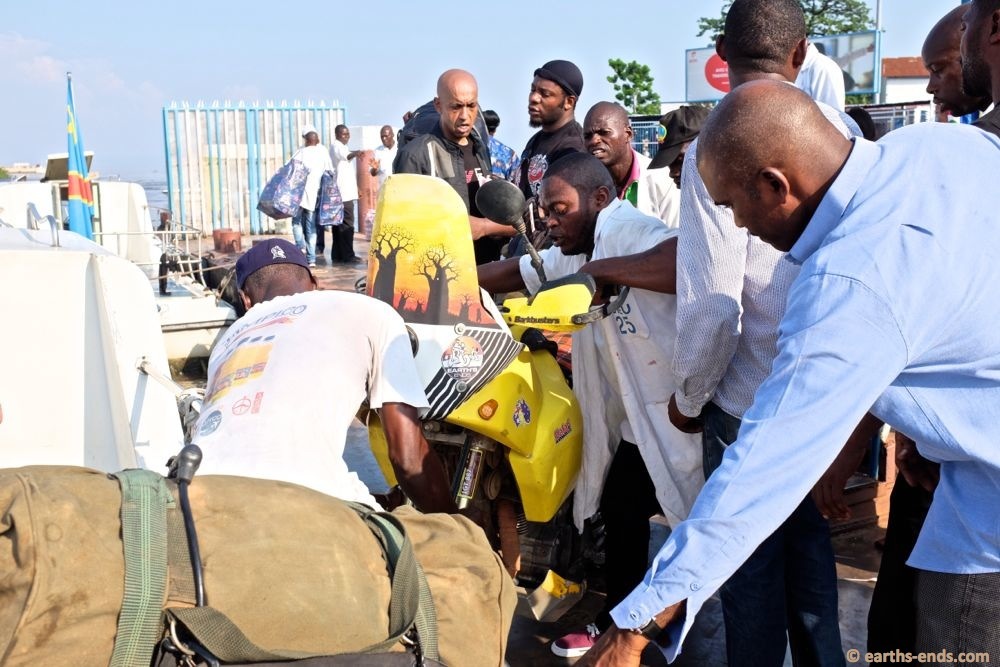
Look how hard that bloke is working. I think the guys were paid $5 each to get the bikes on and off.
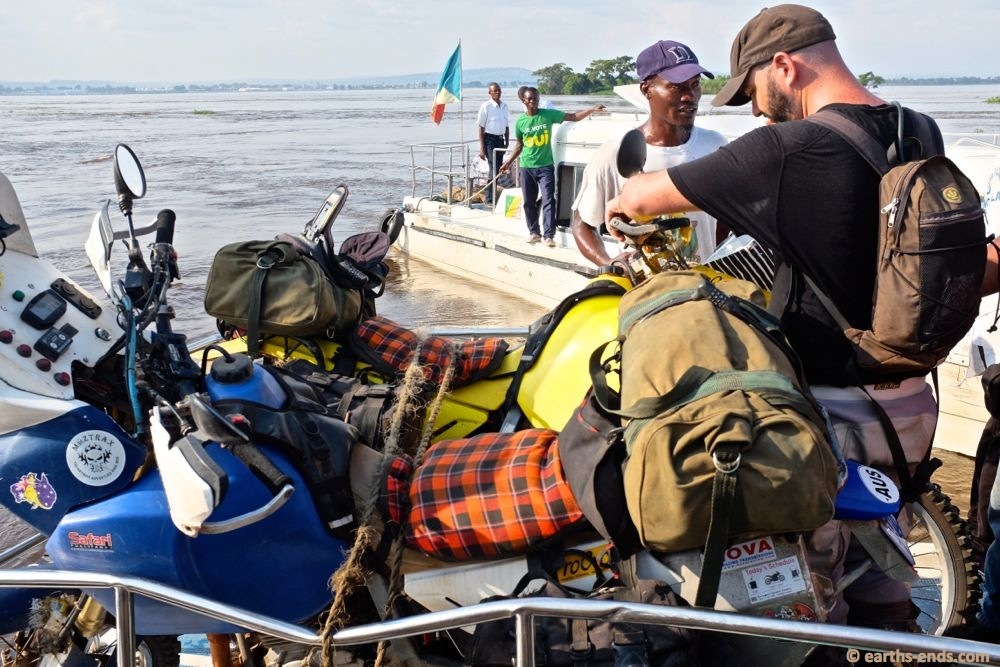
Getting the bikes as secure as possible with one old rope.
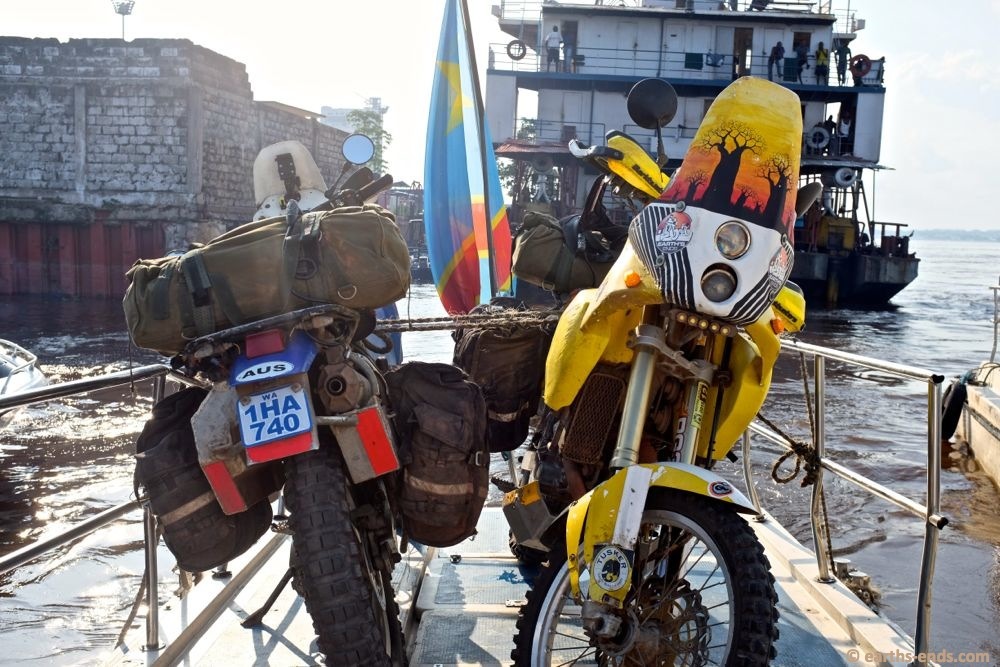
Ready to roll….or should I say cruise?
As I think about the crossing now I can’t help but recall the tale of the Crocodile and the Scorpion that we have come across a number of times in our DRC background research. The tale is a popular parable for DRC problems but has been used to illustrate similar and varying problems elsewhere in the world. The original author is said to be Roald Dahl who wrote it to describe the situation in the Middle East.
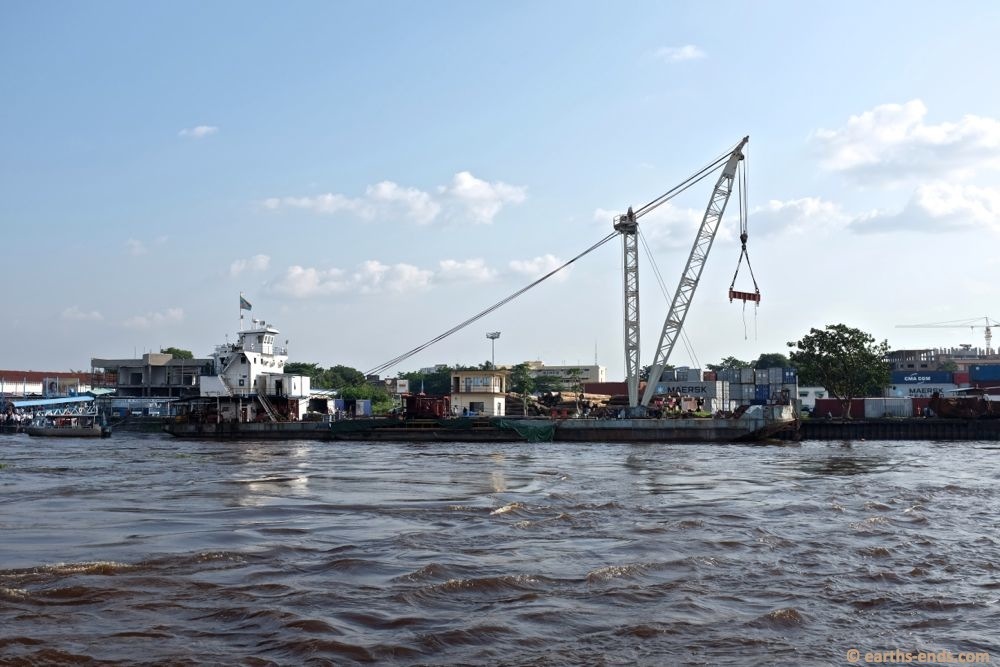
Congo River scenes.
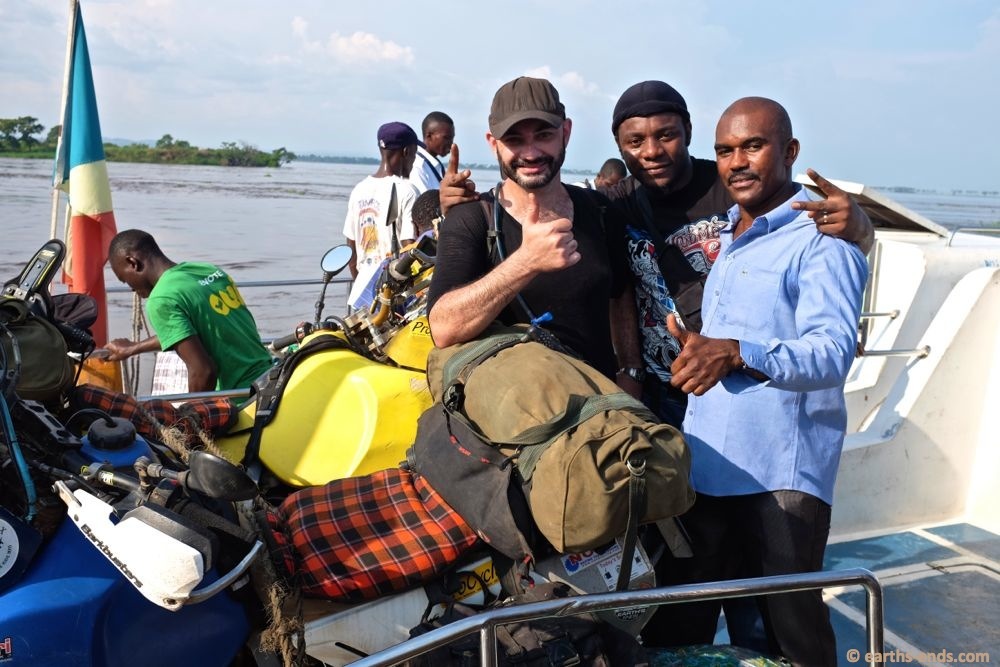
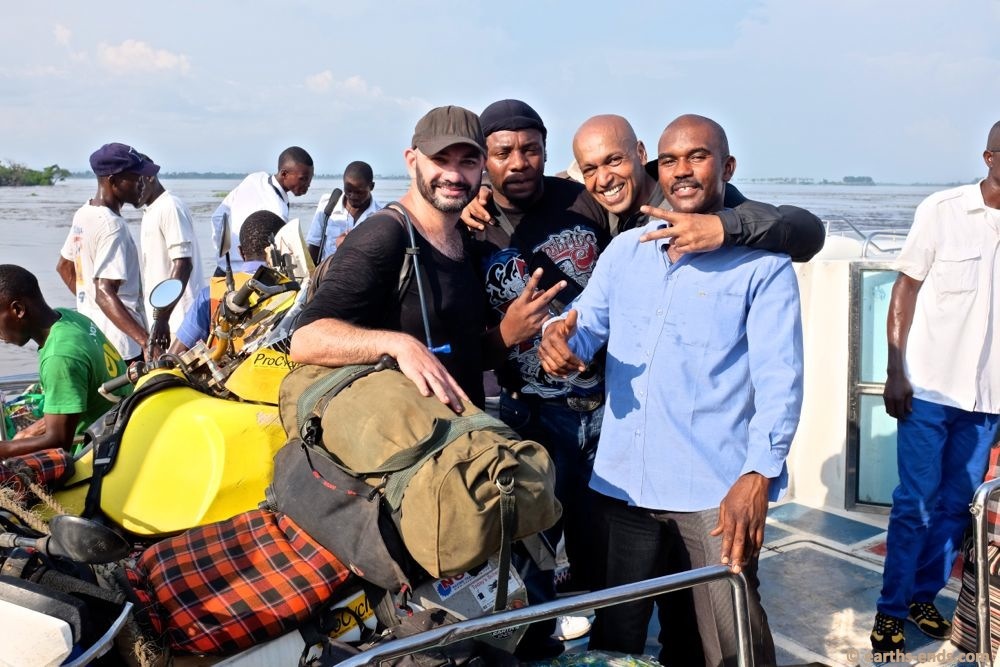
Last pics with members of our favourite motorbike club.
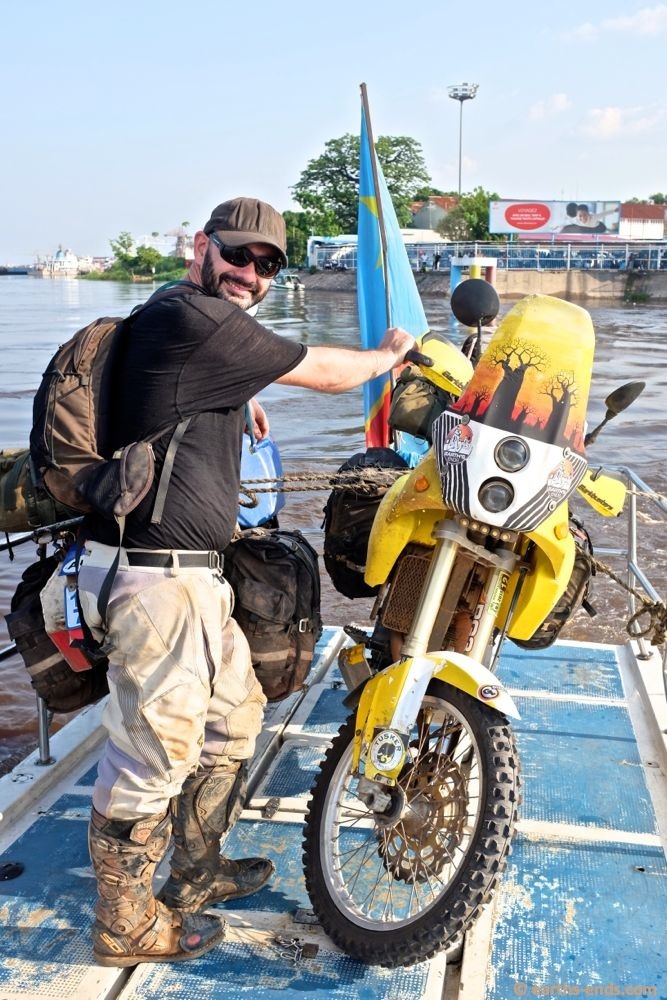
And just like that….we were gone.
It goes like this:
One day a scorpion on Kin side of the Congo River desired nothing more than to travel to the Brazza side of the river. He flagged down a passing crocodile and requested a lift to the other side. The crocodile was having none of it and told the scorpion he wouldn’t dream of taking him on his back across the river. “I know all about you scorpions, I’m not going to take you on my back only for you to sting me and drown me along the way.” The Scorpion responds that he would never think of doing such a thing, “why, if I stung you then not only would you drown but so would I. I would never do that.” Convinced by the Scorpion’s logic he relented and agreed to take him to the other bank.
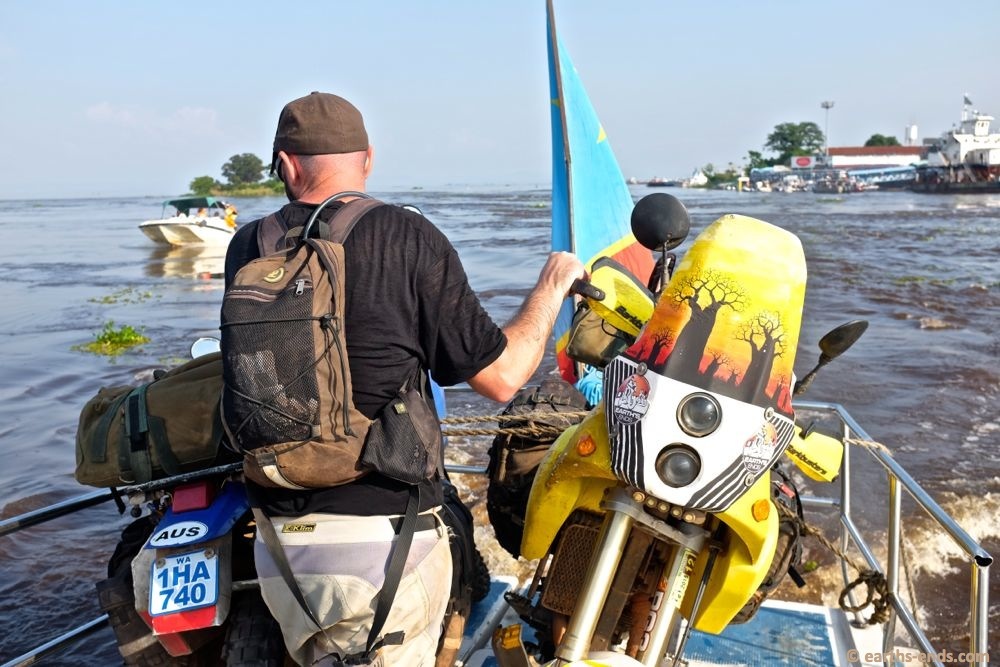
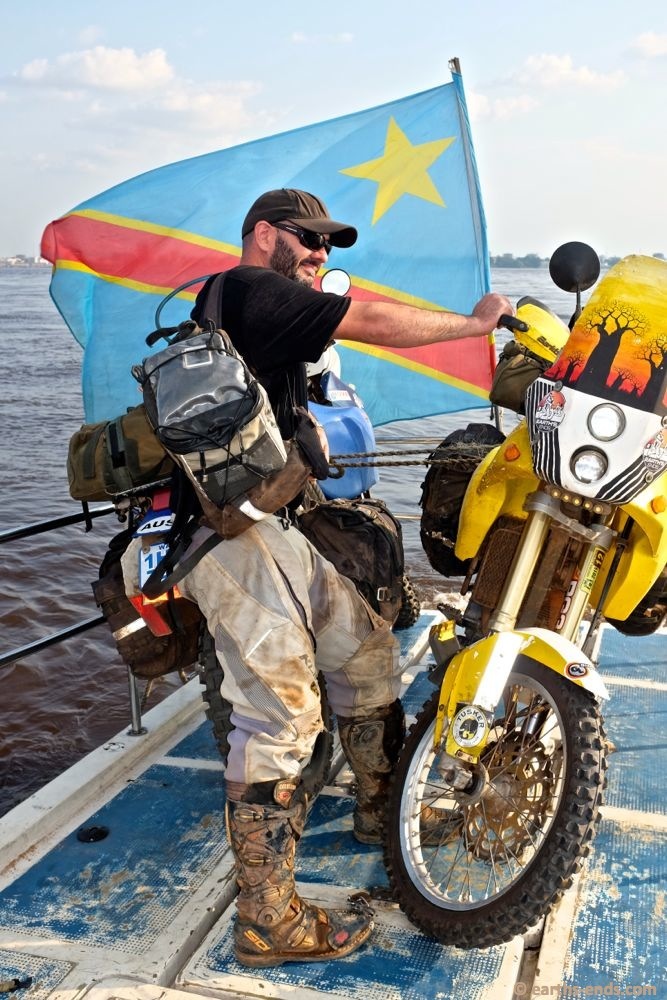
The crossing was passing merrily as they approached the other bank when suddenly the crocodile felt a sharp sting in his neck. The crocodile yelled at the scorpion, demanding to know why he had done this. “Now we will both surely drown,” cried the crocodile. As the venom overwhelmed the crocodile and he started to sink beneath the river, the scorpion whispered into his ear, “this is Congo, don’t try to understand.”

Blog 71 by Mick: Day 8 on the Dirt – The Last of the N1…
Day 8, and final day, of off-road riding
115km off-road and 102km on-road from the Construction Camp to Kikwit
We were relaxed when we left. We had been reliably informed by the guys in the construction camp that Kikwit was only about 8 or 9 hours away by car depending on the efficiency of the many checkpoints, including both the necessary paperwork and inevitable shakedown we would have to endure. We hoped and expected that on the bikes it would only be about 6 hours; we would not only be able to travel faster on the track but expected to weasel our way through the bribery game a little faster than the SinoHydro guys who have such a huge target on their backs. So we gave ourselves a casual morning start and left around 11am, far more pleasant than the 7 and 8am starts we had been enduring on the trail.
We got out the gate and straight into it… some deep sandy ruts which were thankfully reasonably firm from the overnight rain. There was a village in a river valley about 2km away which we had been told would be our first checkpoint and probable shakedown for the day. We had been warned that being so close to the construction camp, they had constant exposure to the construction workers and had gotten accustomed to getting their cut of the action. Oh joy… We were excited…

The trail just outside the construction camp gates. The valley in front was where we were heading.
I volunteered to take the bitter pill first up and deal with the checkpoint formalities, in this case both Police and DGM (Department of Immigration, essentially). The coppers waved me up to the DGM hut first and as I entered I managed to fabricate a smile from somewhere. I handed over our passports and showed our visas to the DGM official, and was waved to sit down in the corner like a very naughty boy. I did what I was told but could see where this was heading… old mate was a hardarse and was putting me in my place.

Firm ruts to start the day…
A few minutes later he waved me up to his desk again to ask for our invitation letters, which we had used before in our “distract with useless documents” strategy but had never actually been directly ask for. I took it as a bad sign, but showed him the forms and sat down again nonetheless. A few minutes later, what I had been waiting for finally started. He sighed, he looked up at me, he sighed again at the documents, he looked up again and mentioned something about “un problem”. If this had happened in the preceding days of the trip I would have definitely stuck to my “softly softly” approach, but both physically and mentally fatigued, with the Kikwit and Kinshasa finish line in sight, and thoroughly sick of this bullshit, I fought fire with fire.
I got up and walked over his desk, and went through all the documents one by one. “Mate, there is no problem. The passports are valid. The visas are valid. The invitation letters are valid. We have come from Lubumbashi with no problem. There is no problem. Fill in your fucking forms, and let me go”. All in English and all in a tone of outright disrespect, which in fairness was all he deserved. I then went and sat down again.
This pissed him off, majorly; it probably wasn’t a smart move on my behalf but I was completely out of patience with guys like this. Frustration levels aside, it is a valid (if risky) strategy for dealing with hardarses like this. It had worked before for us and in this instance it worked again. The game is essentially one of intimidation; if you can demonstrate that you are not intimidated – they realise you wont be easily manipulated into paying a bribe, the game is thus over and you win. He filled in his forms and gave our documentation back and told me to get out. Fine by me.

Tan waiting out at the bikes with some local people… This lady wanted a photo.
Back at the bikes Tan was surrounded by curious and friendly locals, and I told her what had happened in the little hut. We loaded up to go and the DGM guy came down to check us and the bikes. I did my best to smooth over our little confrontation, and said to him “merci, au’revoir” and offered my hand out to shake his. He rejected me, to huge boos and hisses from the crowd. The anti-establishment culture of the local people was not in his favour!

The view more or less for the next few hours. Lots of green…
We crossed the river after a quick and easy talk to the police; the usual questions of where we had been, where we were going, plus a double check we had checked in with the DGM, and they cheerfully waved us on. It was strange how these interactions with Police and DGM were a complete mixed bag; sometimes very easy, but sometimes not, sometimes very friendly… but sometimes not.

On the new foundations was generally pretty good, but not always. About 20m back from me there was a big erosion ditch which I only saw a the last moment.
Over the river we rolled straight into another checkpoint… Tan volunteered for this one while I chilled with the bikes and chatted (very badly mind you, my French is woeful) with a few moto taxi guys as they came through. When she returned she explained that we had just changed provinces when we crossed the river, hence the checkpoints each side of it. The police were friendly and good natured and came out to check out the bikes and bid us farewell as we left.

I had to pull left and ended up in the mud at speed and went down… more mud on the pants… and everything else. It was sticky shit, the Michelin Deserts struggled to clear it.

More views… more palms.
The road was generally pretty decent from here, most of it was actually a formed road and not just wheel tracks bashed through the jungle and savannah, although in some places the foundations had been heavily eroded by the rain while it waited for tarring. And the heavy storm from the night before had reaped significant havoc where it could. Any part of the road that was low or lacked decent drainage was a complete mess.

Moving along, the majority of this section was easy going on well prepped foundation…

…but… there were some massive mud holes to negotiate too.

…and kilometres of slippery red shit like this…
We soldiered on without too many dramas, just lots and lots of mud, a spill each, and another checkpoint of note. We entered a little town and got waved over to the side of the road by an extremely stroppy looking fellow. He was a physically big man who looked like he had a block of concrete for a chest, a length of 2” rebar for a spine and had a voice like a ship’s foghorn, he was built like the proverbial brick shithouse. Simply put, this dude was very intimidating. He demanded we park the bikes on the side of the road exactly as directed, demanded we switch them off, demanded we dismount, demanded we take our helmets off and demanded we follow him into his hut. As anyone sensible would do in such a situation, I volunteered to stay outside and look after the bikes…

Tan grabbing a photo of me

Lots of rain during the night had filled all the little creeks with red silted water.

Red mud… everybody’s favourite.
Seriously though, it made sense for Tanya to go in. Firstly, her communication skills in French were orders of magnitude better than mine. But more importantly, talking with a foreign woman seemed to really destabilise these serious officials and in many occasions it seemed to smooth things over quite well. We have had a few situations where the machismo culture meant she struggled to get things done, whereas I could walk in, get people’s attention and start to organise things pretty quickly. But outside of those situations, most times Tanya was able to keep things on the ‘straight and narrow’ and moving along without issue. So when shit got real, our go-to plan was generally to ‘send in the blonde’.

Tan stopped at the bottom of what looked a very slippery climb to scope it out, and realised she just happened to be in an enormous boghole.

… oh well, only one thing for it…

… more roost…

… and more… slowly getting there…

Nearly out!

Local lads liked the show!
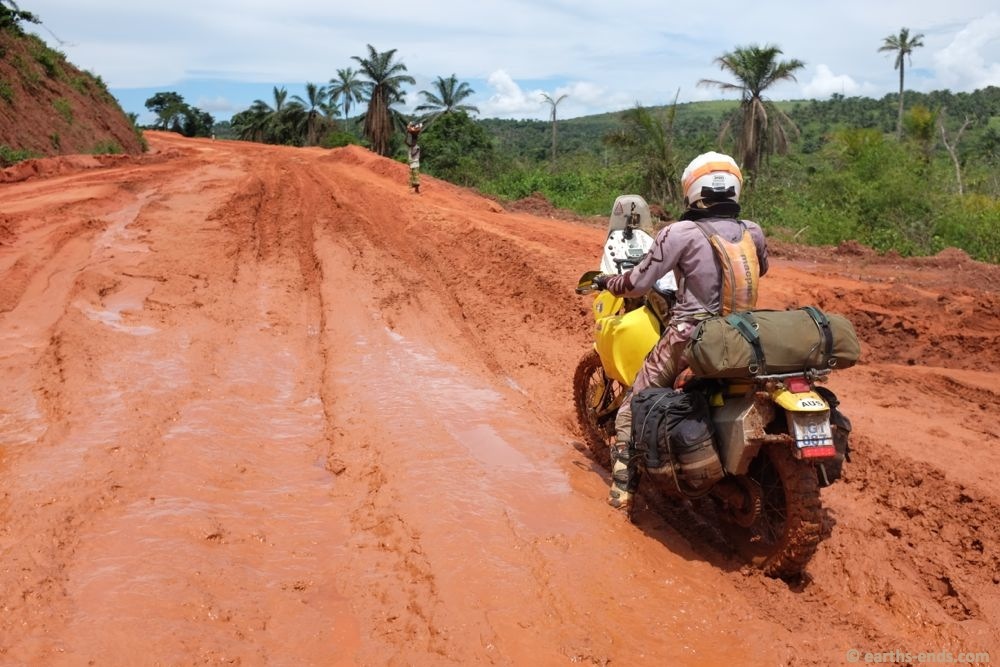
The slippery climb up – was fine in the end.

Bluey waiting patiently for Tanya to finish roosting half of Congo into orbit.
Interestingly enough, Tanya soon reported this particular fellow who looked as hard as nails and which we guessed would be tough as hell, was actually just incredibly officious and took his profession with extreme seriousness. He asked direct questions, fastidiously reviewed our paperwork and wrote down our details with precision. Tan said the whole time she was in the shack she was mentally rehearsing everything she would say when the kickback demand came… but it never did. Tan was gobsmacked as she had never been so intimidated. In the past our mental response to any request for payment was “get stuffed, I’m not giving you anything.” Not so this time, Tan thought “nup… this guy is getting paid.” But just like that he said we were free to go and wished us well.

More mud and some slippery bits.

The SinoHydro construction crew had moved some mountains.

Lots of this… was nice…
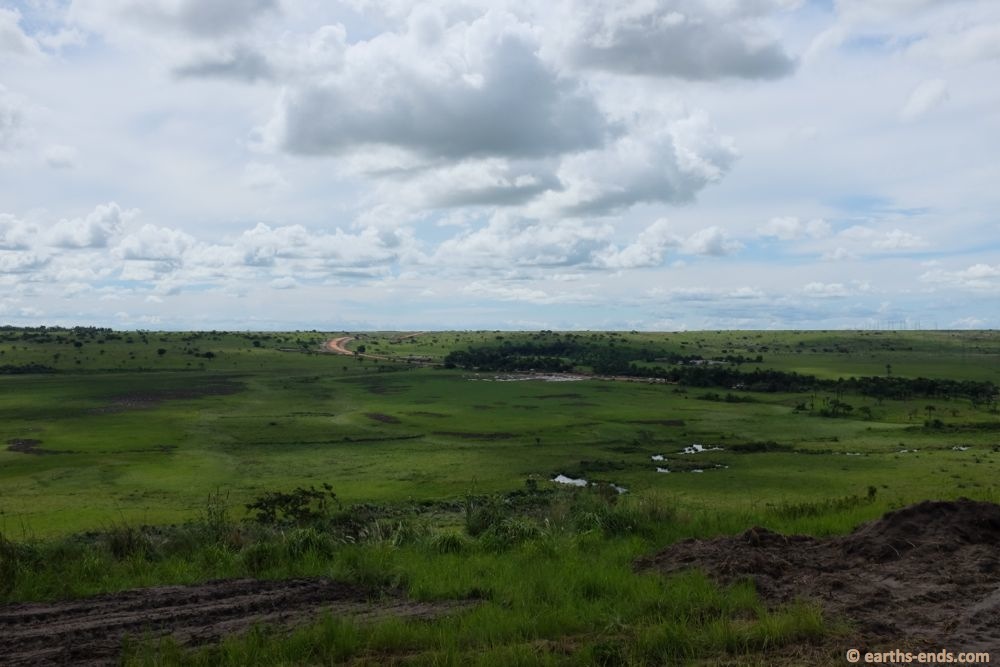
Amazing and seemingly endless savannah.

Some well and truly rooted highway foundation…
This, in retrospect, was one of the reasons we were so off-balance during our time in Congo – you just never knew where you stood. You never knew what to expect. Sure, we could expect and prepare for the worst, but to be then treated very hospitably after pumping yourself up for a “battle of the bribe” only made the fear of being pulled into a side room for some ritual intimidation and a bribe, plus the minutes of mental fortification to prepare, seem bloody silly and destabilised you for the next interaction.

Oh joy, after so much easy riding on the built up highway foundation, to be dumped into some hardcore ruts was pretty demoralising. After this section of old track we missed the turnoff to get back onto the highway foundation on the otherside of the valley, maybe 3 kms away (up ontop of the plain near those powerlines), and ended up riding on the old section for another 10km or so before we ran out of patience and found a good place to bush bash across to it.

Getting ready to roll.

Little bridge over a creek in the valley bottom.

Lots of this was ridden this day.

Making our way around a bogged 6×6 on the old track.

Real stuck…
Back on the bikes, the storm of the previous night was obviously very widespread as the road was wet all the way until the end of the dirt, which we arrived at… just like that. It was over. 1500kms of off-road riding through one of the most perennially unstable countries in modern history… and here we found ourselves, at the end of it all. One of the longest and toughest adv routes on the planet and we were finished with it. It was surreal to consider… We had dreamed about this route before even arriving in Africa; I had read about other people’s trips and scoured Google Earth looking at all the trails and all the grass-roofed villages that we might one day ride past… And now we had done it.

Tan riding some slimy mud.

Good form for maximum control.

And then… boom. It was all over.
It is hard to explain… to achieve a goal that once seemed so difficult to both access and then achieve, so foreign, so alien, so unimaginable, so… so… many things. And for you to then appear at the end of it all after being so focused in the moment… Yep, difficult to explain. You kinda had to be there…

Old track on the right, foundation for the new highway on the left and me in middle.

Tan was keen for a sit down.
Which, very sadly, is an experience I think no other adv riders will get the opportunity to appreciate… granted there will be plenty of other DRC routes available, but the classic Lubumbashi-Kinshasa ‘N1 mudfest’ is essentially at an end. For when we were there in November 2015; of the roughly 450km of track they had been contracted to build between the end of the tar and Kananga, the Chinese Construction crew had completed about 100km of foundations, a few token kilometres or tar, and another 100km or so of pre-work (basically just flattened and widened the track). 240km or so was untouched. However, that should not be the case now, at time of writing.

Tan: “Do something for a photo” Me: “Why?” “Because, you cant just stand there” “Why?” “Because! Just do something” “Like what?” “Look happy” “Meh…”
They were scheduled to finish within 2 to 2.5 years, which would mean the highway to Kananga should be completely tarred within 6-12 months from now, more or less. That’s all things going as planned… which let’s face it in DRC is by no means a sure thing. They also told us that on the other side of Kananga, near Mbuji Mayi, there is a second construction crew from a separate Chinese company who is scheduled to finish the Kananga to Kolwezi leg in the same timeframe. It hit us much later, after we had enough time to digest our trip and the words of the SinoHydro management team, and then seeing the degradation of the security situation in Kasai Province, that we were maybe the last overlanders to cross the Congo along that route and to experience it in nearly all of its revered madness. We suspect no-one would have crossed in the weeks after us as the wet season well and truly hit as we were crossing, plus we had a good ear to the ground about overlanders in Central Africa at the time. By the start of the following dry-season in June 2016, Kasai was going well and truly to shit. By the end of the dry season in November 2016, Kasai was a dangerous place and deteriorating into mass violence as the Congo is known to do. We believe the situation is no better now in July 2017.

Before pulling out the compressor, I figured I better quickly check that this was the legitimate start of the tar and not some random short little section like we encountered before the Construction camp.
We have thought many times about the people we met in those villages, that small village of the old blind chief and the second one with the singing ladies and the English teacher with the handwritten dictionary – what has happened to these people? The UN has estimated that 1.3 million people in Kasai Province have been displaced by the violence in the last year. 1,300,000 people. That’s equivalent to the population of Adelaide, all forced to flee… It is quite probable that those people we met are no longer able to safely live in their homes anymore. They possibly have moved away from the N1 and deeper into the jungle, or moved to the villages of family members, or worse. 3000 people are estimated to have been murdered in the chaos in Kasai, mostly between Kananga and Tshikapa, exactly where those villages were. Hopefully our village hosts are not within that 3000.

The bike caked in mud while we pumped up our tyres
I should add here that it is not just local Congolese who have been affected. Two foreign UN workers have been murdered in the mayhem, quite probably by members of the government in an attempt to frame and incriminate the local militias. It’s a long story which I wont go into (a quick Google search will dig up the gory details for those who are interested) but it does graphically demonstrate what we had gathered in our research before going and definitely felt while we were there; the middle of the Congo is a wild and lawless place where anything can happen. It can be extremely violent… of the many police who have been caught up in the current fighting; including 40 who were decapitated after an ambush by local militias. What is happening right now in Kasai is essentially guerilla warfare with a strong terrorist flavour; each side (the Kabila Government in Kinshasa and the local political elites/warlords) is fighting for control and innocent people are just a form of blood currency that is traded back and forth. This made travelling this remotely in the Congo, especially in Kasai Province from Kananga to the end of the tar near Kikwit, quite stressful. I’ve never felt so out of control of my immediate situation, nor been so acutely aware that my well-being was dependent on those around me and my ability to maintain whatever relationship we had.

Tans was no better, totally layered in congo mud.
Best way I could describe it would maybe like being in a canoe in the middle of ocean with no paddle; sure, you can steer it and even propel it a bit by paddling with your hands with sufficient determination, but in the grand scheme of things you are just a guest of the ocean and she will do with you what she damn well pleases; all you can really do is ride the current and try to pop out the other side. That’s kind of what being in the middle of Congo feels like. Kasai is a disconcerting place… to put it mildly. But shockingly it is historically one of the less unstable parts of the country.
This mental worry really took us by surprise. When leaving Zambia we had prepared for the difficult riding; the ruts, mud and sand which Pat had warned us off in Lusaka. And we had prepared as best we could for the bribery as well; but the mental worry of constantly evaluating the risk of our immediate situation is what we did not anticipate and is what ultimately fatigued us the most. The riding was tough, but not very difficult and definitely ridable for confident intermediate adv riders on a well set up mid-sized adv bike (~650cc). The endurance needed for tackling 1500kms of off-road riding was certainly a factor, especially combined with the lack of decent food. But it was the mental aspect which was most fatiguing; the enormous wealth disparity, the constant crowding of the locals, the considerable cultural differences and communication difficulties, the history of crime especially of extreme violence, the threat of the Police and DGM and the realisation that they aren’t there to help anyone but themselves, in fact its probably safe to say it is the Police who are the most dangerous of all. As I said above – it is a very disconcerting place.
Anyway…. Back at the end of the dirt we tried our best to savour the moment, then pumped up our tyres, saddled up and pushed on the last 100kms or so to Kikwit. The road was pretty woeful, with large sections of deep potholes, but thankfully it was still far quicker than even on the best sections of the dirt we had ridden in the previous days. It wasn’t long before we noticed the level of development and general wealth increased enormously, with little towns full of better dressed people, normal 2WD cars and properly constructed buildings. It was in one of these towns that we had our final checkpoint of the day. Tan took this one after the success of dealing with the last serious fellow, but looked to be in a spot of bother before a toilet related lightning strike came to the rescue.

Riding past many pot-holes… actually the pot-holes all kinda joined up into what might be better described as a pot-canyon.
In the office there was a serious senior policeman who seemed to run the station, with a younger policeman who spoke decent English as an offsider. Tan spoke with the younger guy who was pleasant and friendly, but looked a little worried after an exchange with his boss in a local language. He confided with her “my boss says I must ask something from you, some money, to pass”. Tanya replied with our usual spiel about how “we are just tourists and have traveled so far without paying bribes and we travel by bike because we don’t have a lot of money and yada yada yada”.

In Kikwit I fixed an oil leak; there was a bit of sand under the copper washer of the oil line banjo bolt from having the bike apart on the ground. It is impossible to keep stuff clean in such a situation. Pulled it off, cleaned it and put it back together and she was sweet.
The young guy seemed ashamed to be asking and apologised that he was doing so. Tanya could see that the “smile and refuse” technique wasn’t going so well as the younger guy politely pressed on regarding the ‘need’ for us to pay. To add to things she also started to experience the tell tale signs of a very crook gut. Tanya bought herself bit of time and told them she wasn’t feeling well. They gave her a seat and there she sat frantically scanning the nearby area for a place that would afford a measure of privacy. No luck…people were everywhere. At the moment of this sad realisation, the large amount of spicy and oily Chinese food we had gorged ourselves on for the previous two meals all seemed to simultaneously arrive at some critical, digestive threshold… with a corresponding expression of panic crossing Tanya’s face. The immediate sweat, expression of shock, and futile looking for a private place well communicated the gravity of her situation.
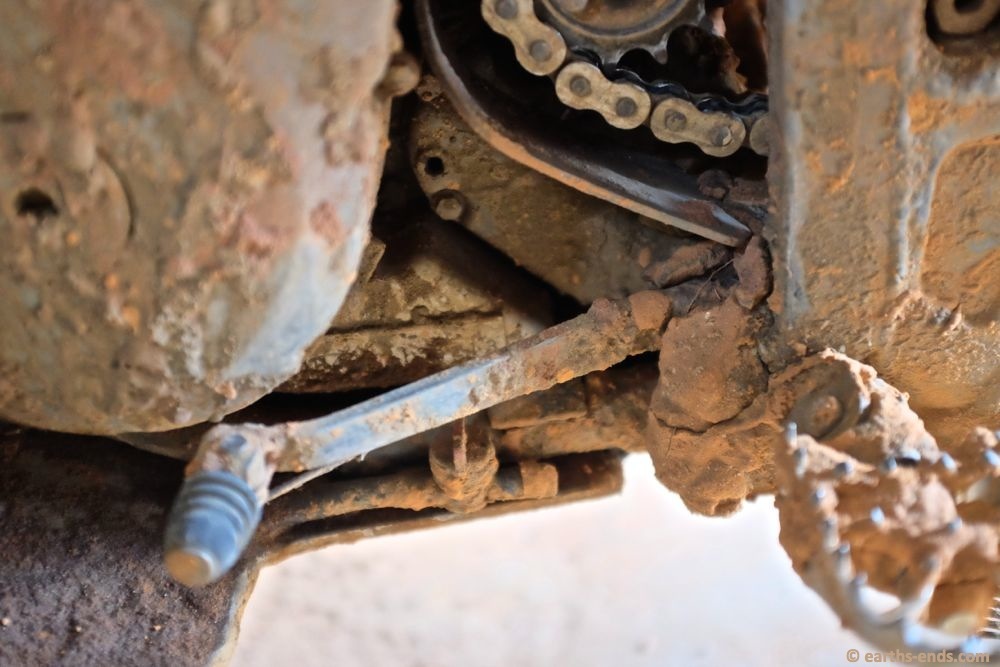
In Kikwit, Tanya complained that changing gears was really difficult – this is like what I found. This is actually my bike (I cleaned Tans before thinking – oops, that would have been a good photo), but it had more or less the same issue although I could still change gears no dramas. Hers however had dried up nearly solid.
The old policeman, probably very well accustomed to the repercussions of poor hygiene, rapidly assessed the potential consequences of the situation and the effects it was about to have on his office. With a perceptible look of sympathy he pushed all of our paperwork into Tanya’s hand and shoo’ed her out of the office. It was a fluked masterstroke; we had by freak chance developed probably the most efficient technique yet for dealing with bribery; in addition to the classic “smile and refuse”, the effective “distract with paperwork/gps/camera etc”, the amusing “good wife/bad husband”, and the risky “play hardball”, we now had discovered the for-experts-only “threaten to shit one’s pants.” Tanya vowed to use it again in the future yet wondered if it was a moment that could ever be successfully acted… perhaps only Meryl Streep was up to the task.
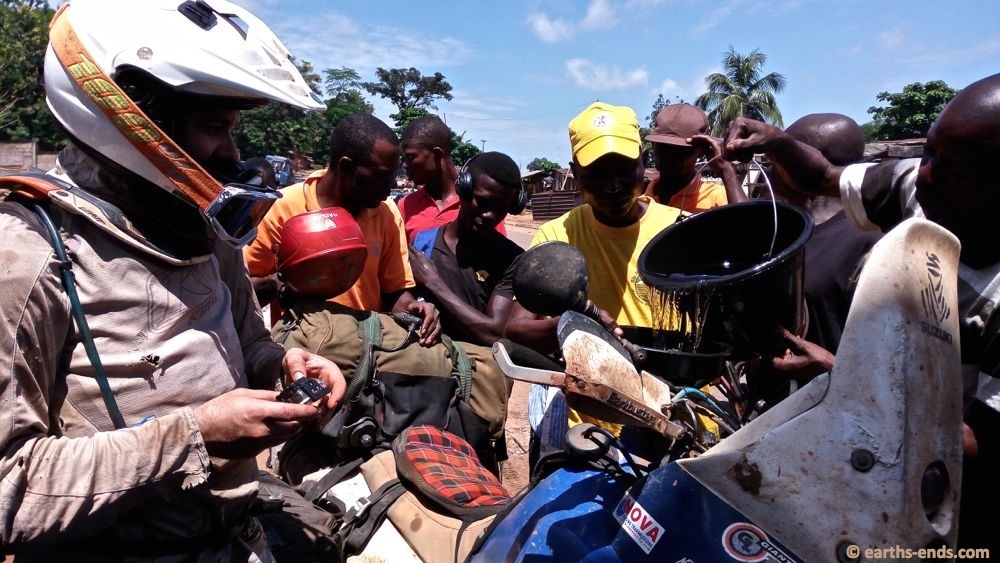
Buying petrol off the black market in Kikwit. They did us in for about 3 litres I’d guess, but at the time I just could be stuffed fighting for it.
With such an emergency in motion, we left town hard on the gas. Which was a shame, as it was a hive of activity in comparison to where we had been. There were people cooking food in little roadside stalls, sellers walking up and down selling things like chewing gum and phone chargers, goats being slaughtered and bled into the gutter, scooters overloaded with live chickens and cars so full of fruit that passengers where forced to sit on the roof and even the bonnet. Watching a guy hang on to a bonnet at 80kph while no doubt severely inhibiting the view of the driver was quite unique I can tell you! I should also note: Tan did not shit her pants… a few minutes out of town we made an emergency stop at a secluded roadside location.
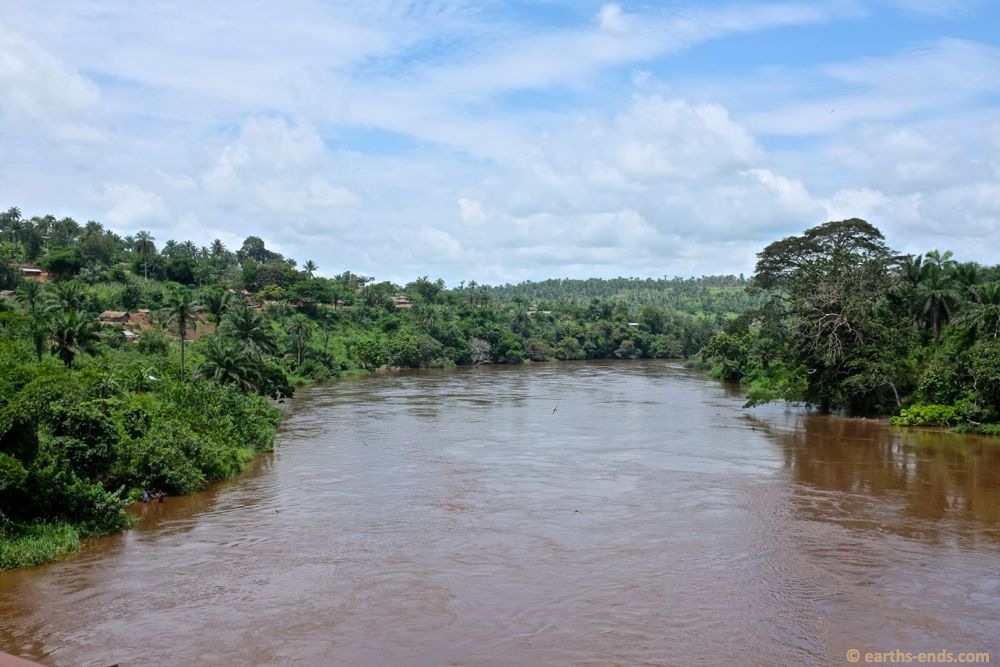
Its amazing in Congo – you ride for 1500kms and cross many streams, creeks and decent sized rivers like this one, and due to the shape of the Congo Basin, EVERY ONE of these waterways are actually just tributaries feeding the mighty Congo River. They all drain north (kinda) into the second biggest river on Earth after the Amazon, both in terms of length and girth… oops… I mean volume.
We pulled into Kikwit late in the afternoon and started our search for a hotel. Its safe to say that Kikwit doesn’t get a lot of hotel traffic, as after we found 3 hotels on the same intersection, all three managers desperately came out and we ended up running an impromptu dutch auction in the middle of the street. One hotel came down from an optimistic USD170 to $60, another from an idiotic USD220 to $50, while the third modestly quoted in local francs at the equivalent of $42. That is where we went, showered and slept.
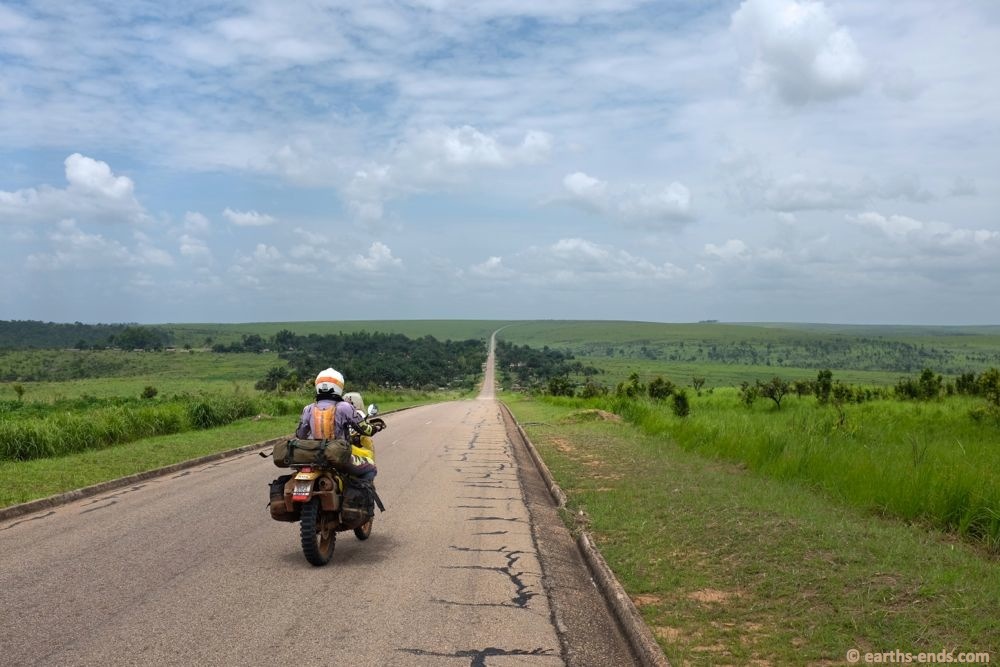
Amazingly fertile savannah as far as the eye can see. If Congo ever got its shit together it could be an Agricultural POWERHOUSE!
We had 525kms of tar to go to Kinshasa, so left after a cruisy breakfast and a visit to the fuel black market. On the way into Kikwit I had actually run completely out of fuel and was forced to empty the stove bottle into the tank so we could look for some hotels. Tanya had an extra litre or 2 than me so I’m guessing with the bike on its side fixing the clutch I must have lost some fuel out the breather. Anyway, we were basically dead empty so got 30 litres per bike after negotiating a decent rate, and realised straight away we were getting ripped off with the measurements. I put up a bit of a protest but to be honest we were so fatigued by this point I just could not be arsed arguing anymore; I guessed we were about 3 litres short but we just paid up and left.
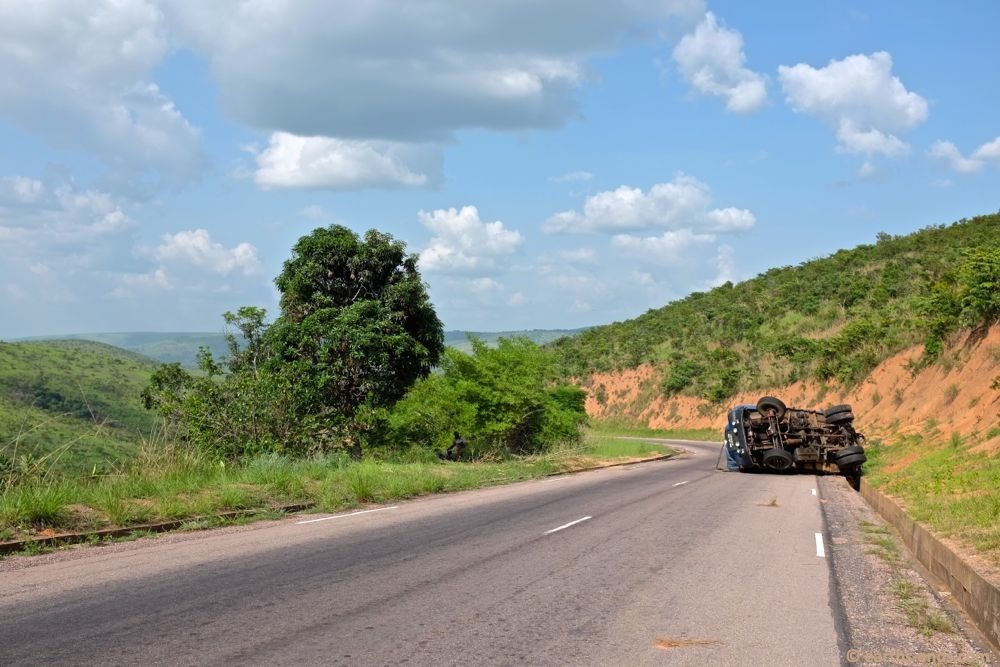
Once on the tar… we saw a lot of things like this. Overloaded Trucks trying to get up hills and stall, lack brakes and roll back and roll over. You can see the guy on the left in the bush is actually there to guard the truck.
We had prepared ourselves for many checkpoints as we neared the capital, but we never saw another one. Maybe the older policeman from the last one had rung ahead and warned them about the foreign chick with intestinal issues? Not sure, but we were relieved nonetheless. Along the way we grabbed a few extra litres of fuel to make up for what we were missing and made it to the outskirts of Kinshasa where we had organised to meet up with the Bikers Kinshasa, the local biker club. We had been chatting with them a bit and they were keen to hear of our experiences after crossing the country without an airplane – the usual mode of transport for Congo.
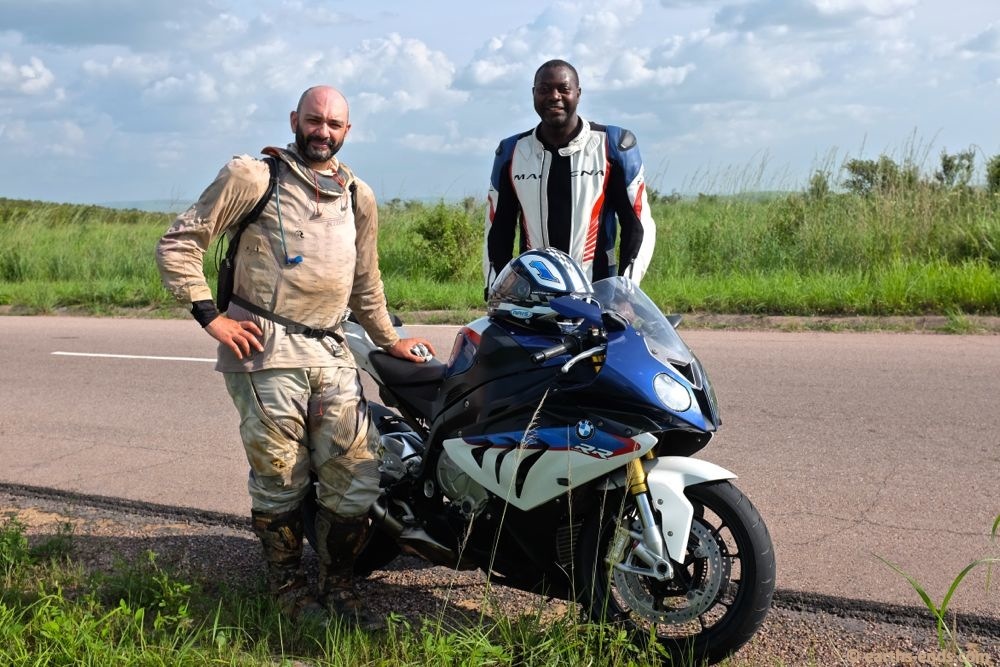
We stopped on the side of the road for a snack when I heard an Inline 4 ripping down the hill with serious intent… I waved him down and out of a helmet popped this fellow, Arsene, on a bling’n S1000RR. Arsene spoke really good English and we had a roadside chat. Turns out Arsene was a member of Bikers Kinshasa and was on his way to the rendezvous on the outskirts of Kinshasa, but at a considerably higher rate of knots than us. “For you, it will be 2 hours” he said, “but for me, only 1 hour… maybe 55 minutes”.
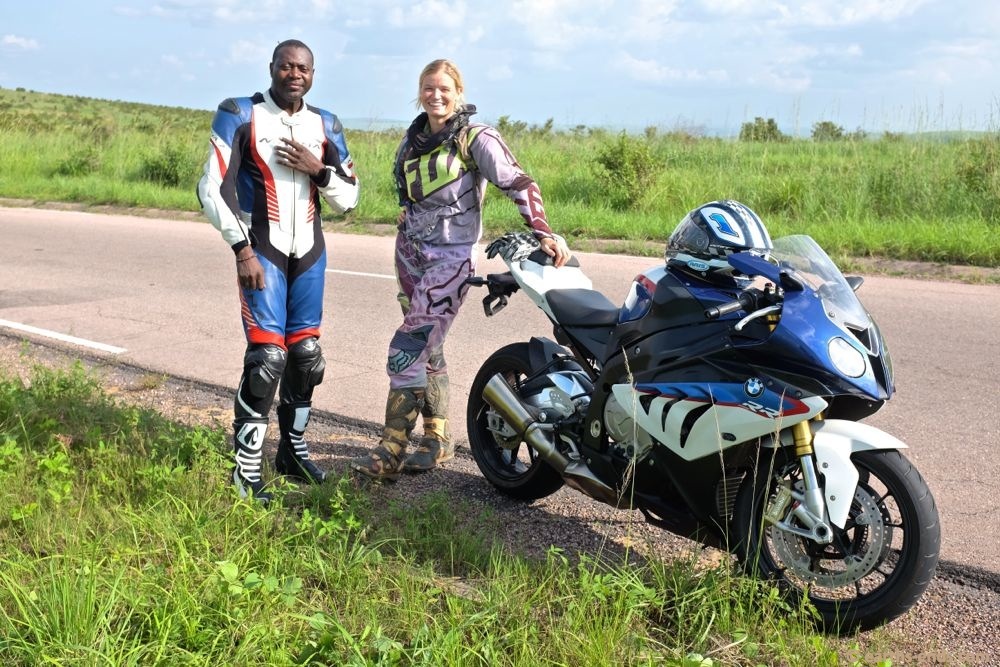
Tan posing with the best looking bike we’ve seen since I sold my MV Agusta F4.
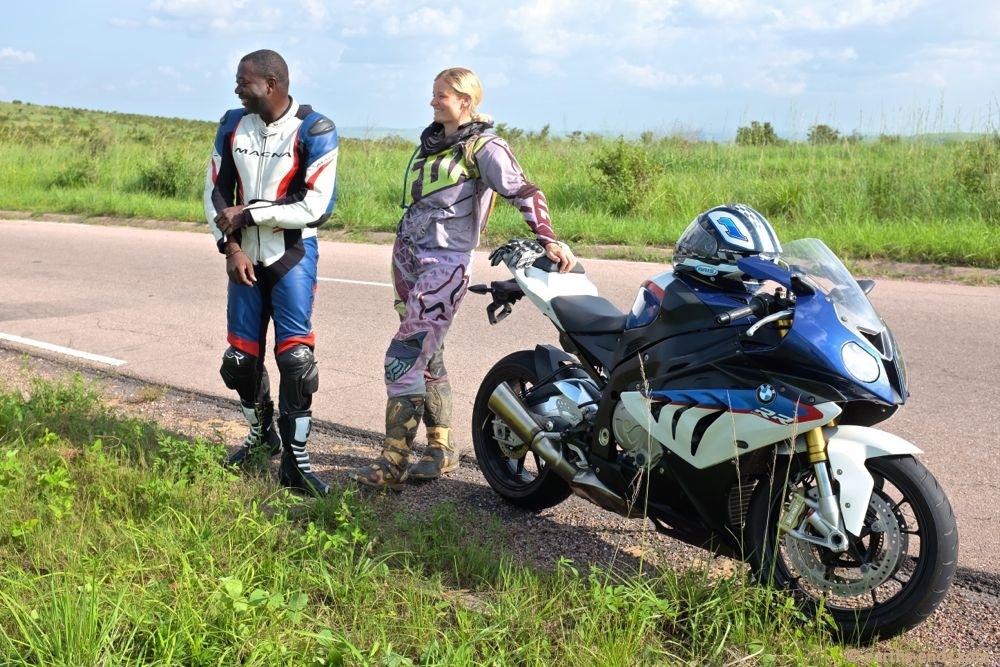
“Muahahahaha! Look at those heaps of shit! 40hp? Muahahaha!
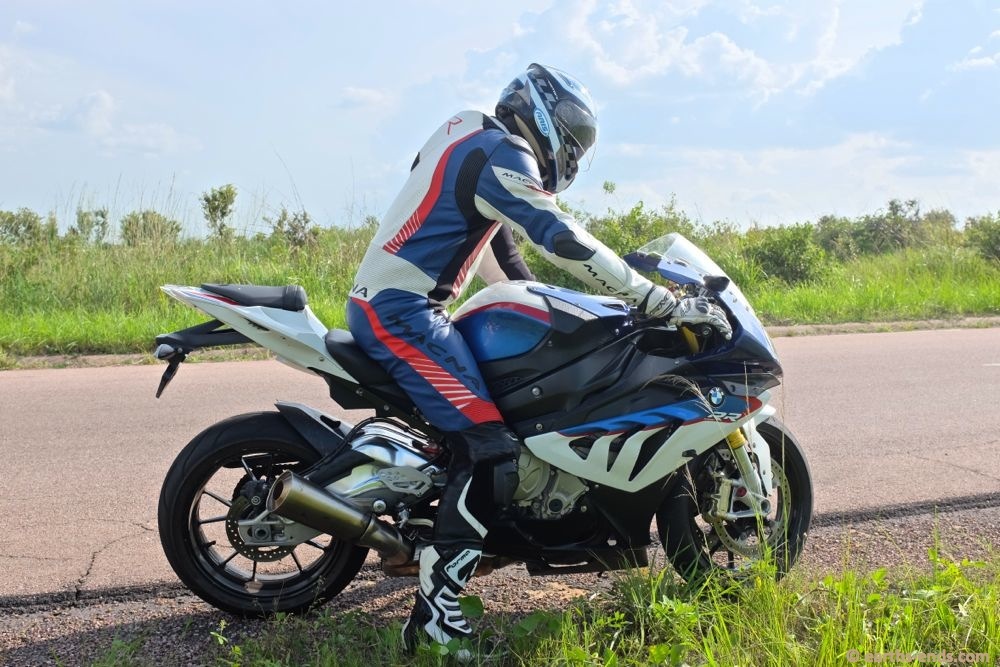
Arsene on the move…
After some introductions, we hit the road as the sun was getting low and Kinshasa traffic is mad enough in the daylight, to be entering the city in the dark was an extra level of risk we didn’t really need, but did end up experiencing. It is a sprawling city of 10 million people (likely more with informal settlements) with old infrastructure and a distinct lack of road rules, or at very least adherence to road rules. Everyone hit some unseen pot holes, including one of the members on a lovely Moto Guzzi who managed to put a massive dent in each of his rims on a square edged crater.
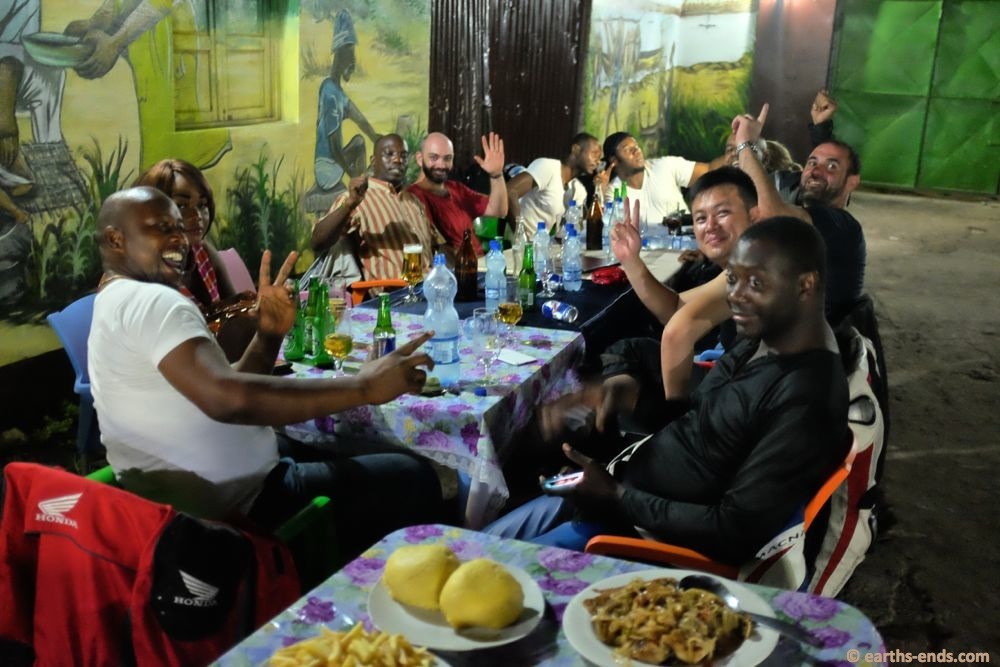
Meeting heaps of the BK (Bikers Kinshasa) guys in Kinshasa
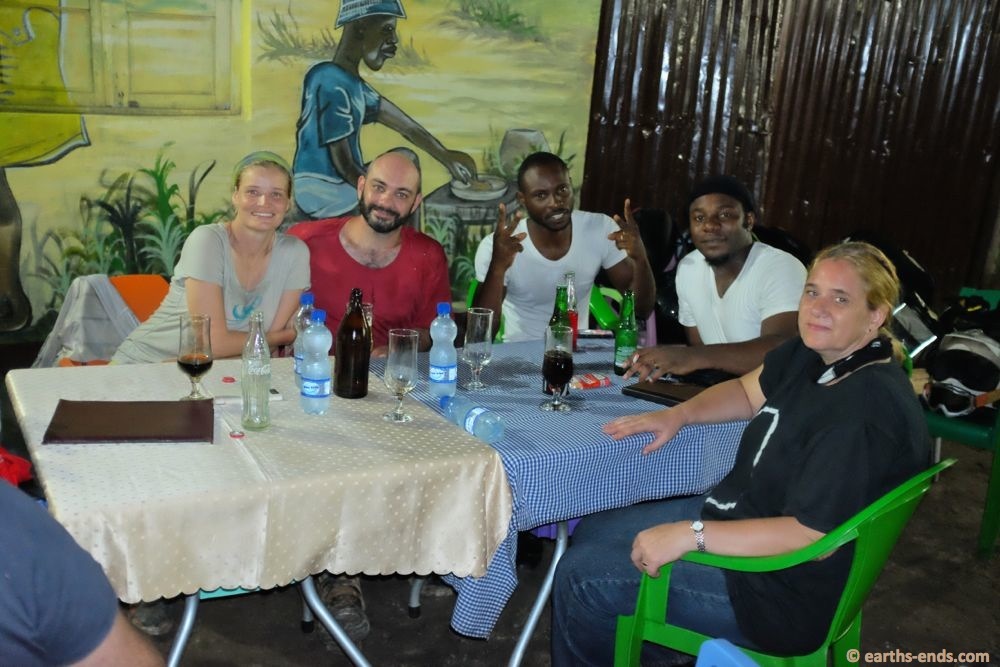
Igor, Patrick and his wife Christine
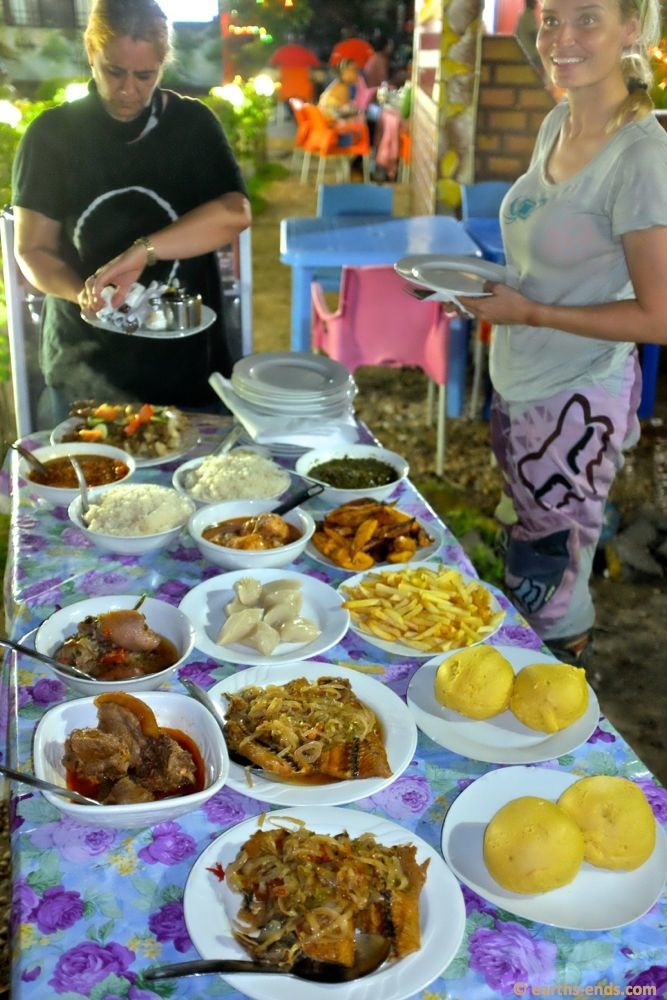
Tan looking a bit malnourished
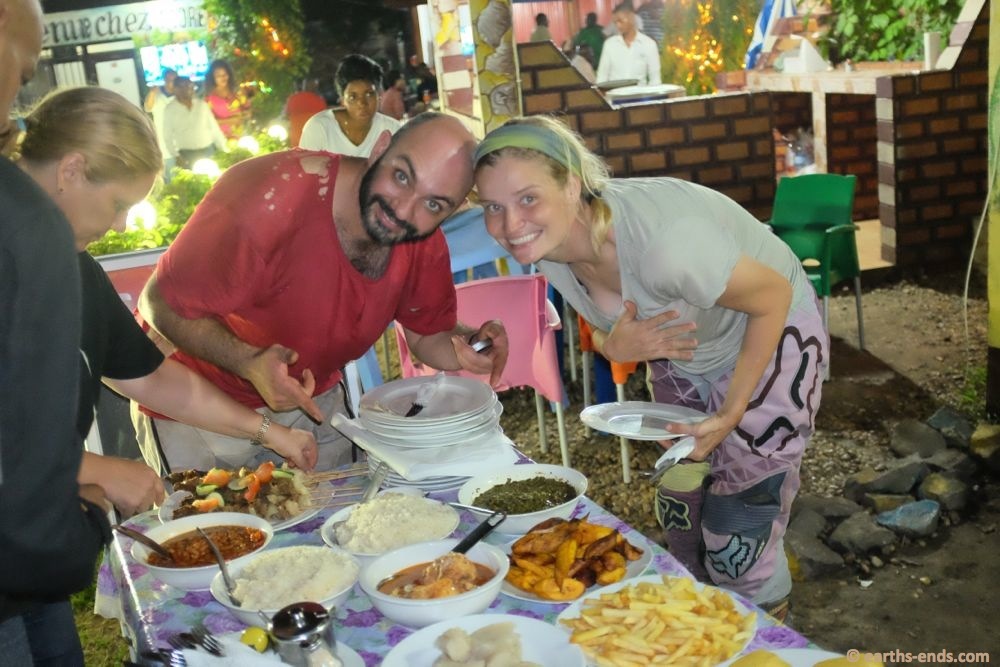
So excited for proper food…
But entering the city under the protection of the Bikers Kinshasa was a revelation, the lead bike would enter a busy intersection, revving his motor like mad to attract attention, hold up a hand to stop traffic and we would all roll through. They would then race past us in traffic to make sure we didn’t end up at the front of the procession… it was a well practiced and coordinated maneuver. And just like that, we were at a Congolese Restaurant in downtown Kinshasa, surrounded by bikers and getting filled up with beer and local food. What a welcome!
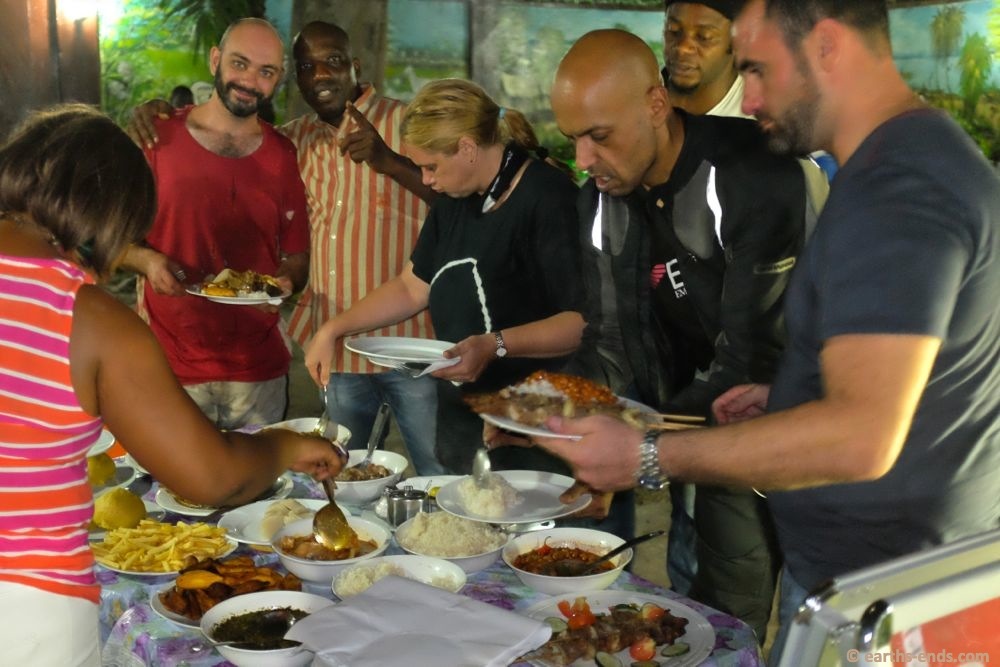
Joseph and I
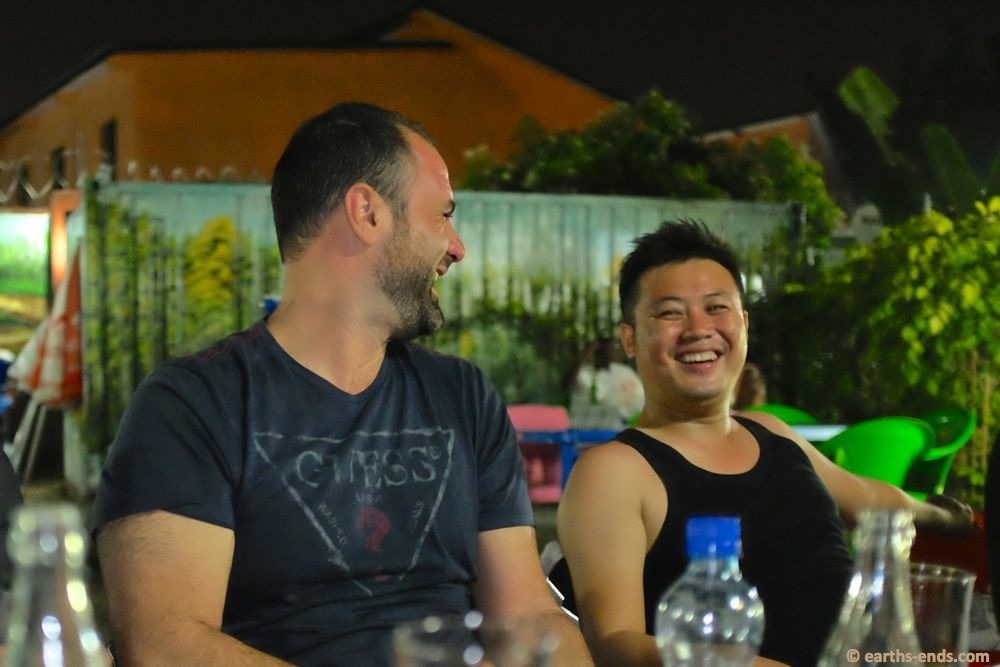
Alberto and Chen talking shit.
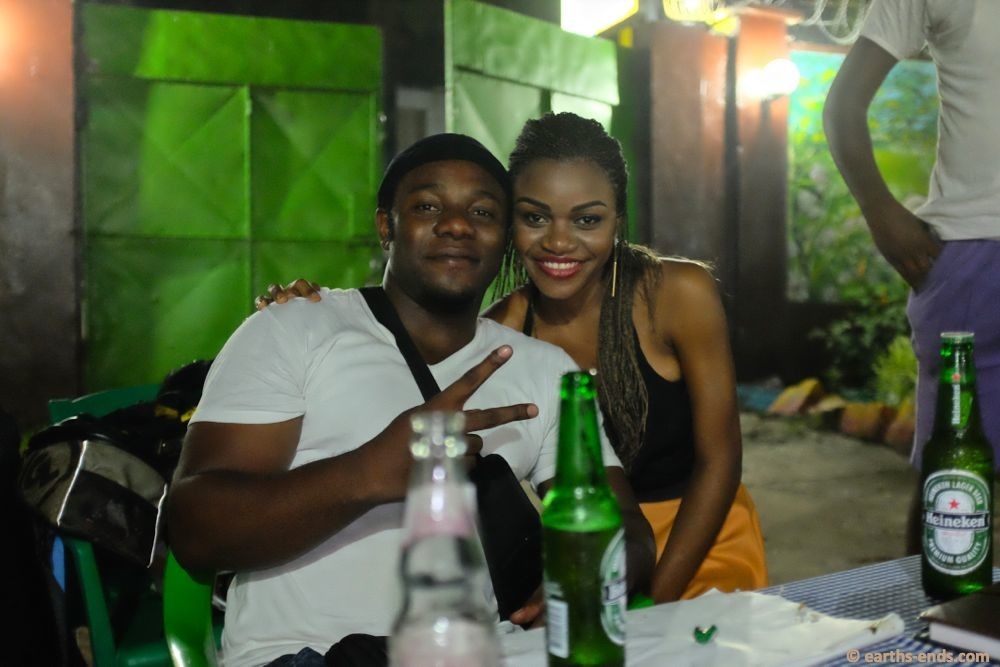
Patrick, secretary of BK, and his sister.
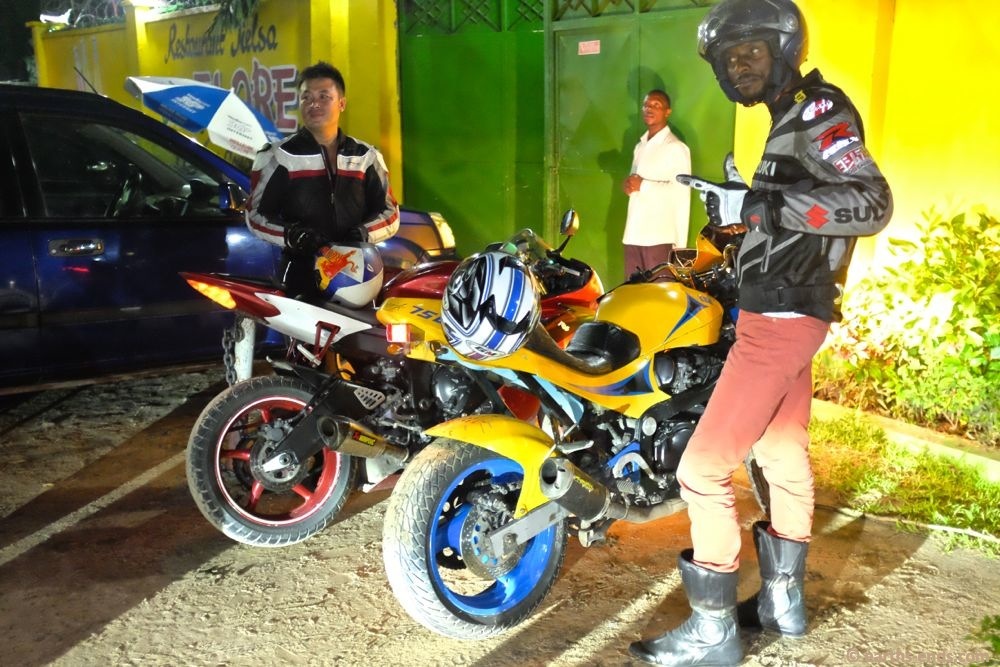
On the way to our Hotel, Chen on his R6 and Igor on his older GSX750. The old Suzi had a great note – heaps of induction noise through those carbies.
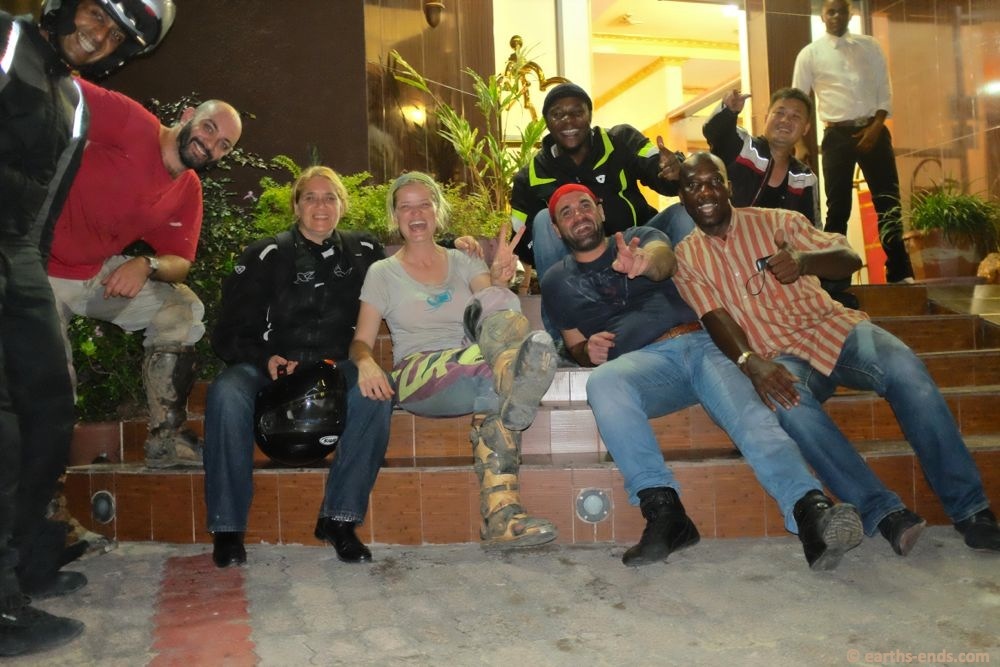
Checking into our hotel, we were exhausted but everyone was in party mode!

Blog 70 by Tan: Day 7 (pm) on the Dirt – The Great Road of China
Following on from the last post:
But first a bit on the Chinese in Africa. We have previously been asked by blog followers of our opinion on the ‘Chinese in Africa’ and now (and blogs to follow) seems a good time to answer. Chinese activity on the African continent is a hot topic at the moment and a subject I am quite interested in. Unfortunately a lot of what you come across on the subject is remarkably rubbish reporting – totally partial, wracked with hypocrisy and for this day and age surprisingly riddled with borderline or outright race based prejudices.
But what is certain is that China represents an alternative to the status quo of business, power and diplomacy in Africa. This makes them unpopular with many and results in accusations of ‘neo-colonialism’ rather hilariously levelled by actual former colonisers in Africa, aiming to do the same thing as the Chinese. But of course when they do it, it is called business or globalisation.
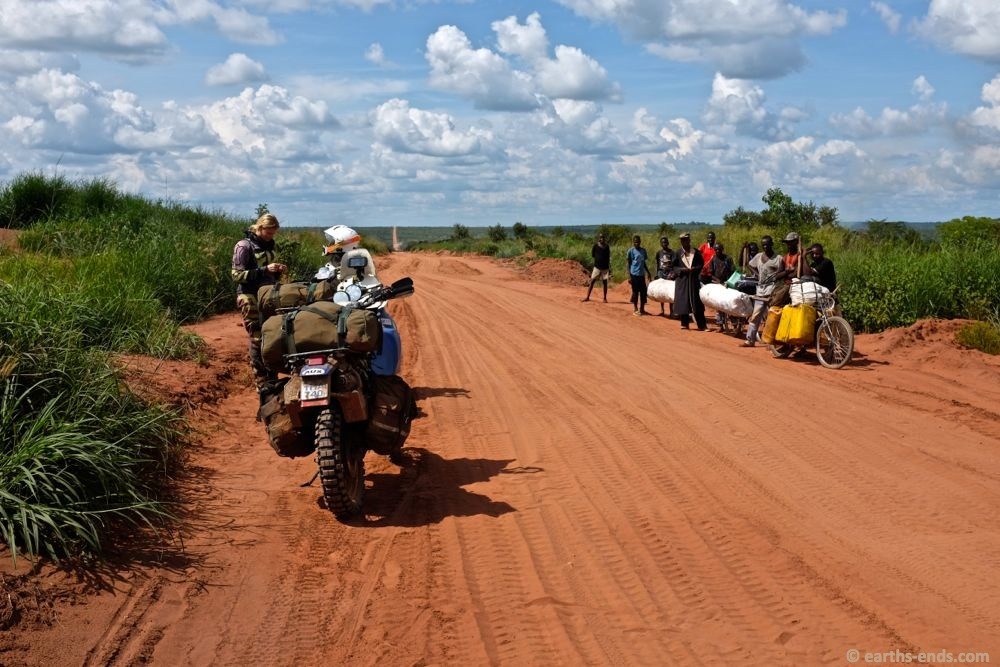
We stopped for a bit of lunch, crackers and a tin of tuna. And soon enough some bike porters accumulated to check us out. One of them was a fella in a full-length coat and it was a scorcher of a day.
Personally, I am open-minded for the potential benefit of the closening of ties between African and Chinese governments. And this for me mostly boils down to 2 main reasons. Firstly, it seems that China sees and communicates a place for Africa in the world economy. China is in the midst of an ambitious project of physically linking world markets through its One Belt, One Road project. They plan to connect both ends of the Eurasian landmass, Africa and Oceania through an overland route (the road) and a maritime route (the belt.) They say these routes will promote trade and cultural exchange, regional cooperation, growth, development, prosperity and all that jazz. People who like the idea say it will allow poor countries to get infrastructure and a place in world markets. Critics say that it is China’s plan for economic and strategic domination of the countries along these routes and that they are just pursuing their own interests. It’s likely all these things. Given the Chinese plan to spend between 4 and 8 trillion dollars on the project perhaps it is not all that strange to imagine they may want to benefit from it.
Anyway that is all a bit heavy but what it means for Africa is pretty significant. The Chinese see the African market as crucial to their future prosperity and they have a great deal to gain from Africa’s economic development, East Africa especially. In this plan East Africa would become a crucial trade hub of the region.
People miss the mark when they depict China as wanting nothing more than to export Africa’s raw materials. Sure there is that, but then there is the not so small matter of Africa’s predicted population of 2.4 billion people by 2050. The Chinese didn’t fail to notice the Global Financial Crisis curbing Europe and the United States demand for Chinese goods. Relying on these increasingly debt-ridden and stagnating countries to continue their hitherto copious consumption is a risk the Chinese economy can’t bare. So they are looking for other markets. And Africa is a huge market in want of anything cheaply priced the Chinese might have to sell. China has a lot to gain from African’s doing well and with a planned 4-8 trillion worth of chips on the table perhaps we can believe them when they say it.
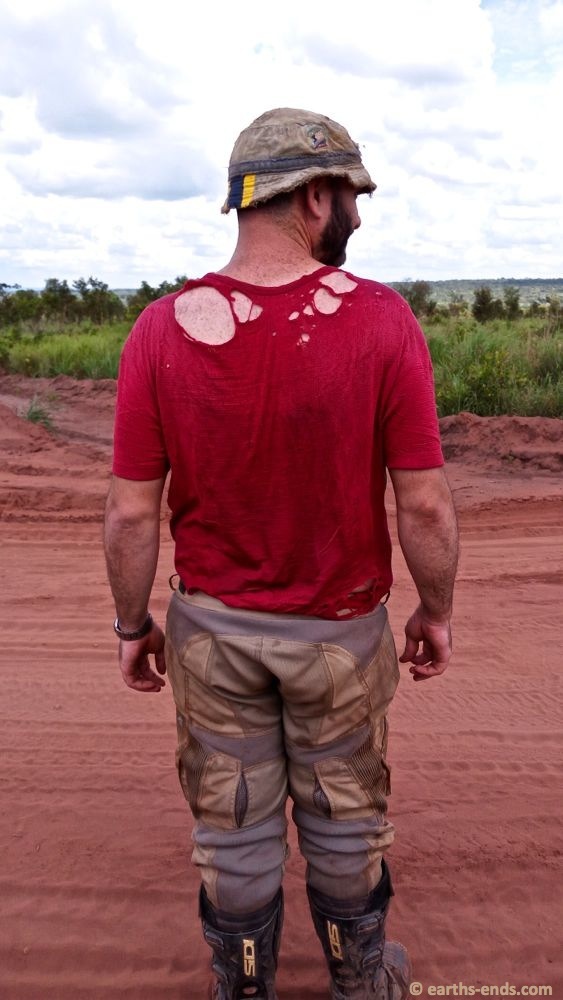
Mick starting to look a bit rough.
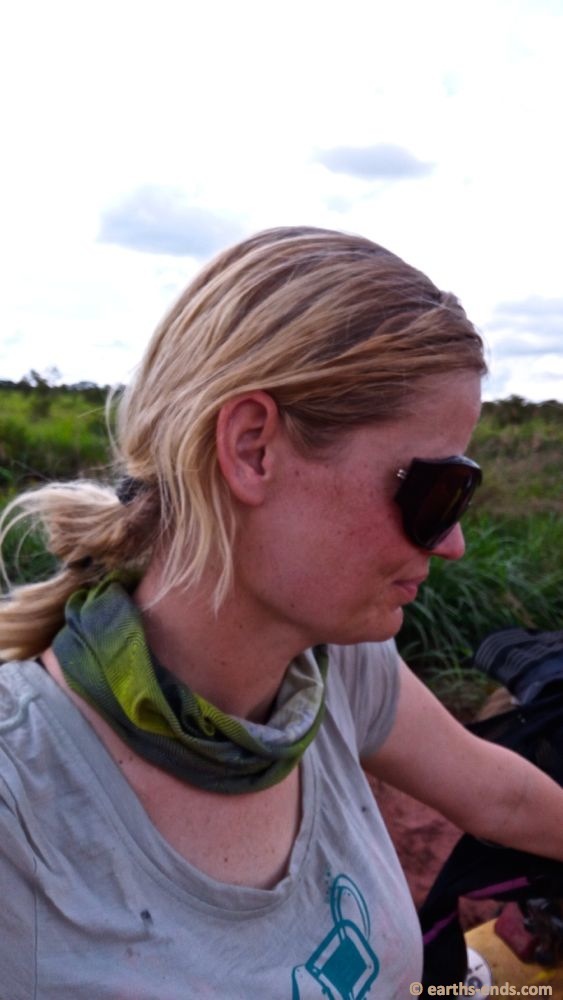
I was no better.
Contrast that with what the US and Europe want and imagine for Africa in the future. What vision are they selling? What place in the world do they see for Africa? They just don’t seem to be offering Africa another role other than that of permanent reliance. The Chinese are presenting an alternate to perpetual dependency and the respect of seeing a place for Africa in the global economy. Whether they can pull it off is a whole ‘nother matter all together… but from that point alone I understand the appeal of what the Chinese are proposing for Africa. Let us not forget that 40 years ago China was poorer than almost every African country of the time…
My second reason for being open minded about the Chinese in Africa is the way Chinese infrastructure deals are executed. Such deals are typically funded by a Chinese bank such as China EXIM bank (a government bank that is not run for profit but is supposed to avoid losses). Anyway the bank will come up with a deal to fund an infrastructure project such as a $500 million road project in Ethiopia for example, and that will typically (though not always) get granted to a Chinese construction company. And here is the kicker – the money goes directly from the Chinese bank to the Chinese construction company. The government of that country doesn’t get their hands anywhere near the cash. What they do get, however, is a road.
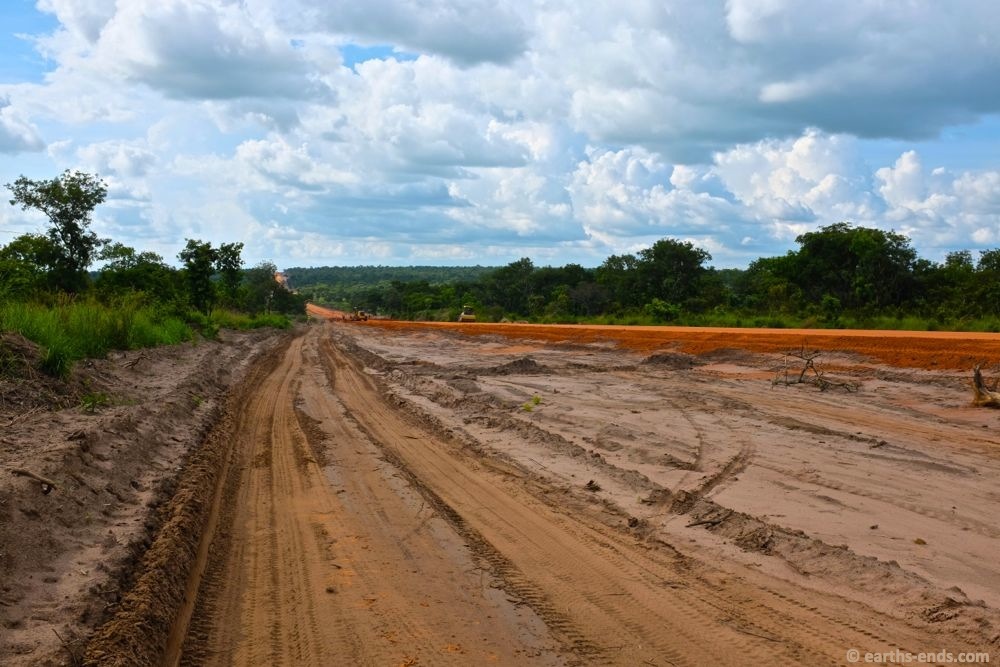
The Chinese are afoot.
Compare that the experience of the Marsibit-Moyale road in Kenya that had been paid for in full by the IMF and European Union and never got built. What happened to the money, you ask? It disappeared, as large cash sums have been known to do in Kenya from time to time. With the road still wanting, what did the foreign donors do but fund the project once more, this time one would assume with the added request that “umm, seriously don’t just steal the money again, hey!” And guess what happened? That money also disappeared, and the road didn’t get built once more. But as of last year it seems that third time is a charm and the road is recently completed. I’ll let you guess where the money came from and who constructed it. I know the debt involved in these projects could be a huge problem in the future. But rather have debt and a road than debt and no road.
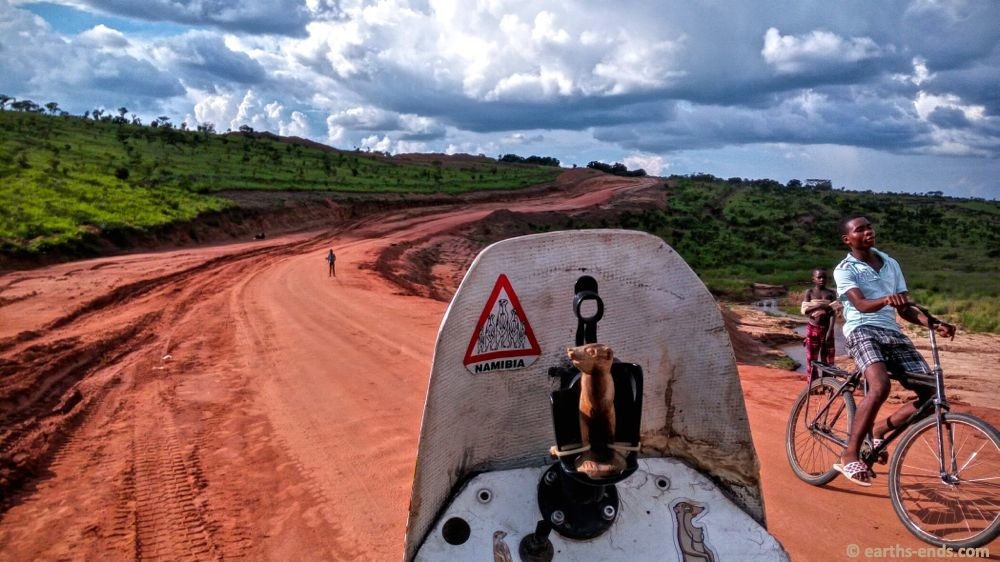
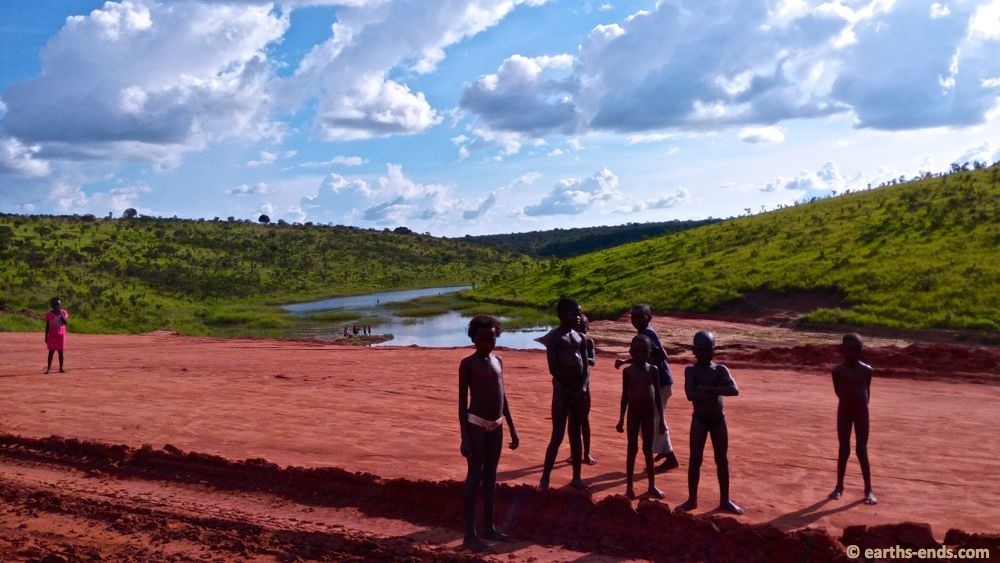
I am not saying that Chinese are benevolent and great and doing totally above board things in Africa. I’m just saying a lot of published opinion is really skewed on the issue. Ask an African what they think on the Chinese and it is bound to be far more reliable. They’ll tell you what’s good (the affordable goods, the infrastructure, that they work hard) and what’s bad (the government back-handers, they often don’t pay the correct wages, they seem to take way more than they give).
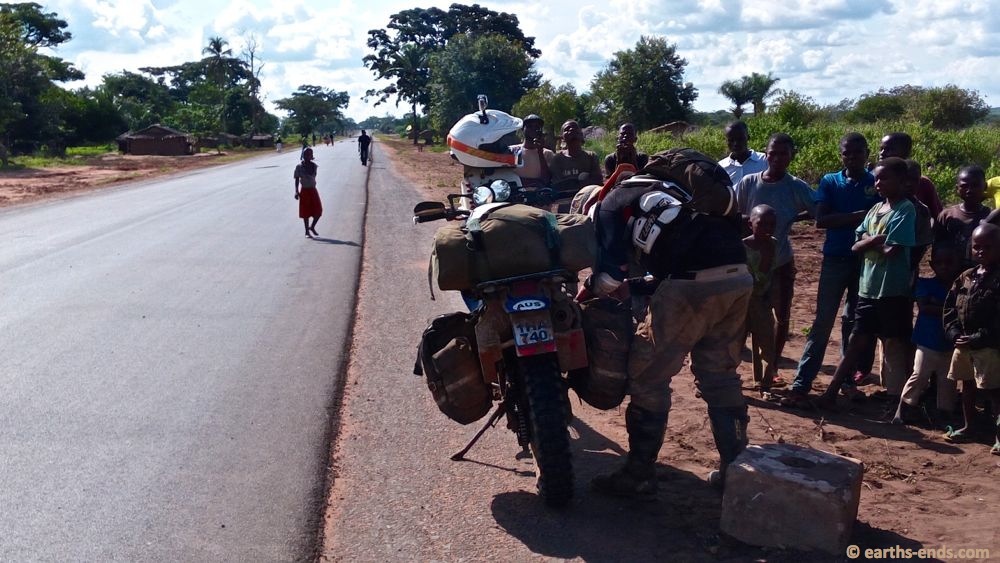
And then…we came across a pristine bit of tar. It was as surprising as it was annoying. We had been running low pressures and not knowing how long the tar would go for figured we’d better break out the compressor as the last think we wanted in this heat and humidity was a pinch flat. Thankfully the tar road was about 8km in length so justified the effort of pumping up the tyres.
Anyways back to us. As the day rolled on we came across the centre of Chinese road building activity. The scale of the work was huge and it was clear that the famed Kinshasa-Lubumbashi route was on the verge of never being the same again. A two-lane tar highway is well in the works. We were glad it wasn’t ready for us and we were instead following sandy, muddy tracks past the hive of activity that Sino-Hydro, one of the world’s largest construction companies, had gotten under ways.
Through the afternoon we had passed two 4WDs full of Chinese guys a couple of times. Each time we passed each other we would wave, such was the excitement of having a vehicle to share the trail with. A whiles later we started to scout for a good place to camp before the heavens opened.
Despite the lovely two nights spent with hospitable villagers we were both hoping to avoid another village stay. We really didn’t feel up to the overwhelming experience of excited hosts. After the exhaustion and stress of the day, I wanted nothing more than to find a quiet place to camp in secret. But the populated area we were still in seemed more likely to serve up an audience of a hundred rather than the glorious anonymity our minds needed.
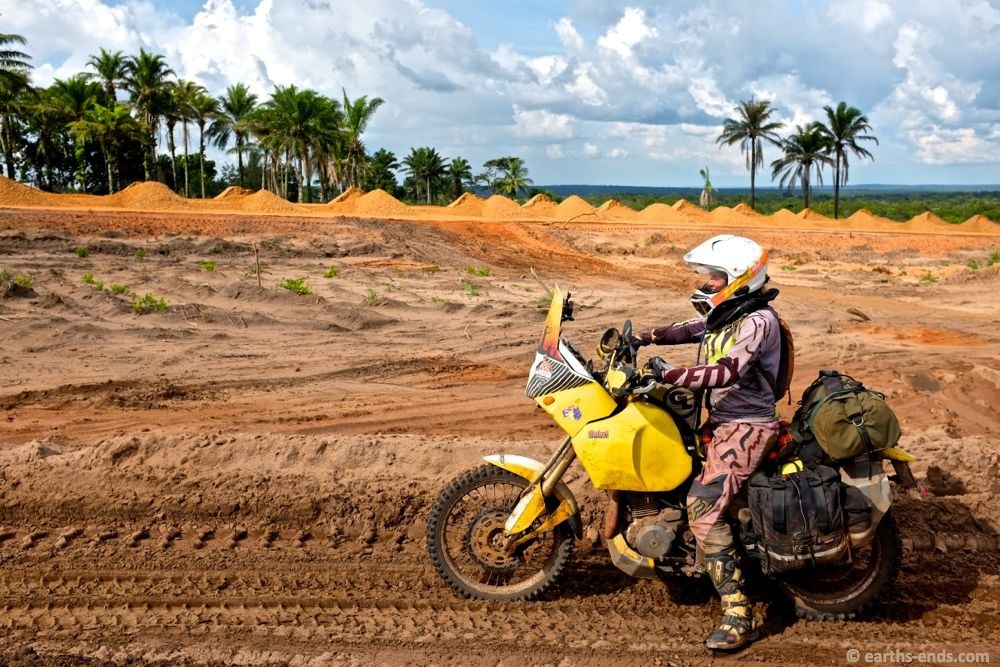
The road building was well underway. Not long now and people will be crossing the DRC on BMW 1200GS and wondering what all the fuss of the route is about.
But then another possibility presented itself as we rode past the Chinese road construction camp. I suggested to Mick that we might be able to camp on their grounds for the night… if we were lucky. I didn’t know if they would go for it as Chinese state owned enterprises in Africa tend to be rigid and privacy focused; fiercely so, which doesn’t help to dispel the ridiculous rumours they are Chinese prisoners at work or that more generally they were up to ‘something’/no good. I’d heard of other travellers making such requests and getting rejected out of hand. However I thought we might be in luck as I speak pretty decent Chinese from years spent living with a Chinese family in China. Mick can understand a lot and can turn more than just the odd phrase too.
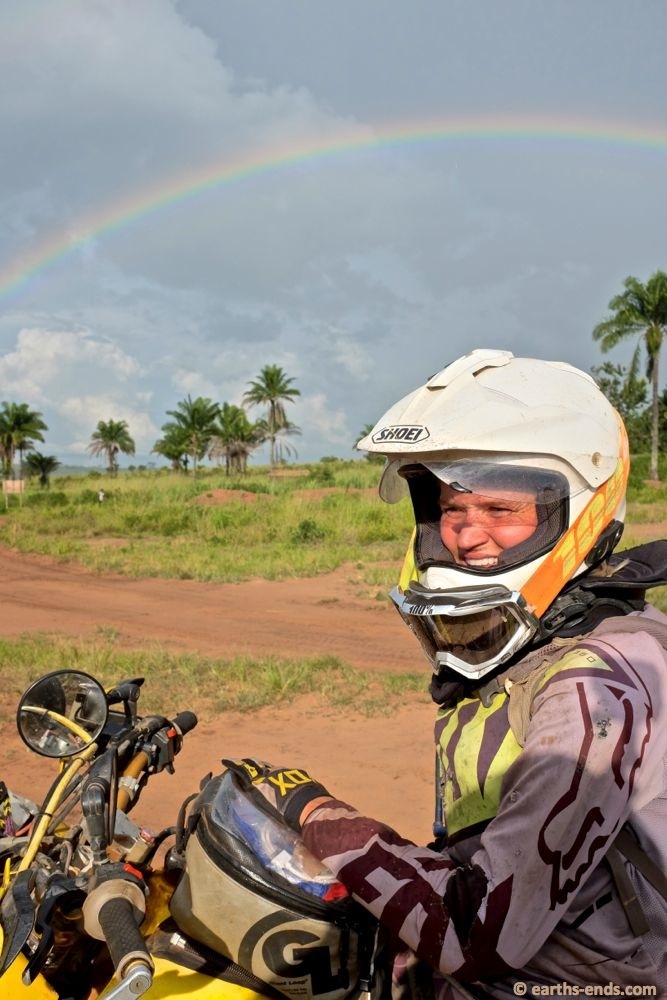
Hot and tired and scouting a place to camp for the night.
After Mick had egged me on for a bit “Come one, just go and ask, the worst they can say is No”, I decided to give it a shot and approached the well-dressed Chinese men who could only have been the boss men. Greeting them in Chinese I explained that we needed somewhere to pitch our tent for the night that would give us some privacy and security. I must confess the reference to crowds of locals and concerns for safety was strategically placed to appeal to the average Chinese consciousness abroad. I need not have worried at all. They were only too keen to host us. And if they were shocked at finding an Australian chick on a motorbike in the middle of nowhere Congo speaking to them in their language, they hid it remarkably well, I must say.
In true Chinese style one of our hosts went immediately to the kitchen and told the chef to cook something for us to eat. As we parked the bikes we saw the chef run out of a the kitchen bearing a huge meat cleaver and no small sense of excitement, urgently requesting to know “what flavours do they like?”
So there we found ourselves, within 15 minutes of arriving, in an air-conditioned dining hall, facing a mountain of Chinese food, drinking gloriously cold cokes and thinking we had died and gone to heaven. It was hard to reconcile the scene before us with those of the previous few days. We had been in the depths of Congo travelling thorough mud, sand and rain, sustaining ourselves on little but nuts, biltong and canned sardines and the promise of well-stocked patisseries awaiting us in Kinshasa. And then this! It was utterly unexpected and I was holding back tears of joy.
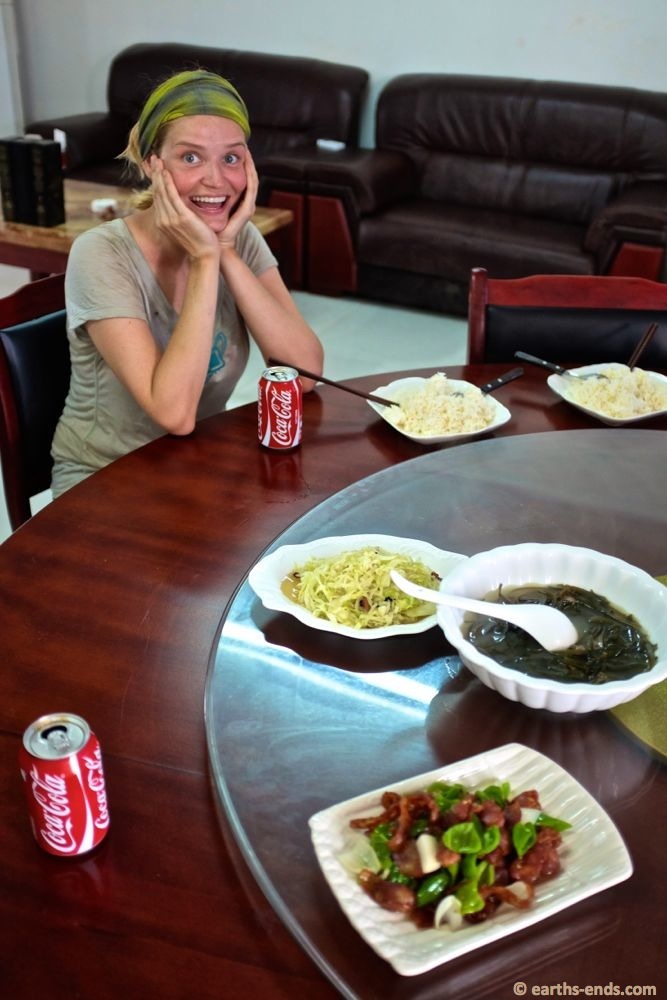
THIS. ACTUALLY. HAPPENED!!!
Over the meal we spoke about the project and its challenges with the company’s 27-year-old head of logistics for DRC. It was exciting to meet a young member of the China-Africa diaspora and Guan was its embodiment. He worked in Africa throughout his university degree and at 21 came to work in Africa full time. He had worked in Republic of Congo and Democratic Republic of Congo, becoming fluent in French in the process. It is partly due to this and his legacy of years in Africa that he has been able to reach such a lofty position at such an early age.
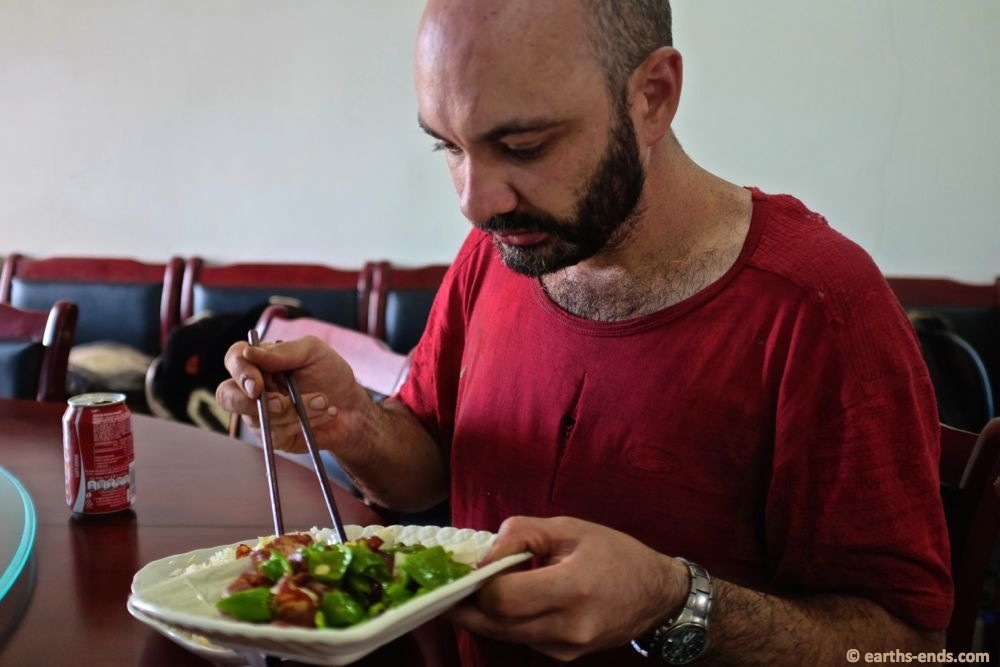
Seriously would you let people that looked like this into your house? Mick looks like a zombie about to tuck into a nice plate o’ brains.
We spoke about our opinions of Africa’s/Congo’s develop prospects. Like most Chinese we met in Africa his opinion fell to the less optimistic end of the spectrum. Guan said the corruption was a huge impediment to Africa’s growth, but also rather astutely I thought, he identified the attitudes of the local population and lack of education as major obstacles to development. Indeed the typical heard ‘black people are lazy’ comment was uttered but it was more nuanced than that. Also I should mention that the average Chinese thinks anyone not willing work 7 days a week and through holidays and perhaps the first few hours of childbirth, are lazy… i.e. all of us.
Anyway Guan said such things as, (and I paraphrase): “How can you motivate people to work hard when they have little concept of how that might pay off for them?” He said, “these people’s lives are so hard and so far from development they can’t imagine a better life because for so long things have been this way?” “How can you tell them work hard and you can one day have a television and nice house if they have never even seen these things before? Many have never even seen electricity?” “How can you tell them you can have a good life when they haven’t seen anyone have a good life before?” “They need education first.”
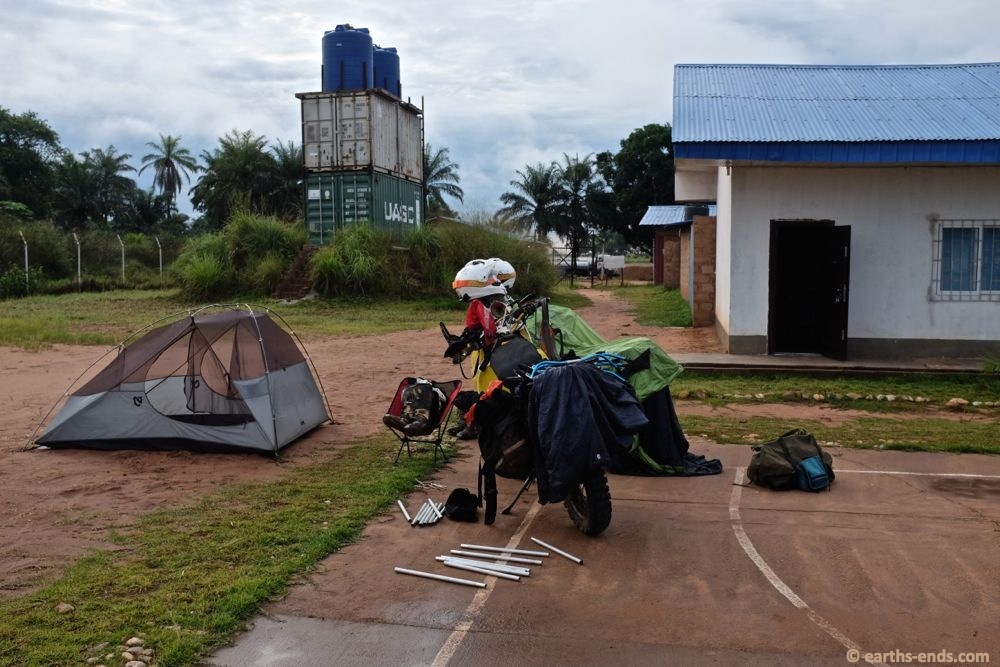
Where we set up camp for the night.
He also lamented the lack of productivity and the high incidence of theft they had to deal with. He shared that they had had workers crash company’s cars and just run off to avoid the consequences and other workers that had simply taken off with the cars never to return. Guan also spoke how he thought that anything could happen in this country at anytime. He said they were probably safe at the camp but felt that ‘anything-anytime’ could happen to them there too. He said their few security guards would be no help, if they were to remain at all. I asked if he felt unsafe in DRC. He didn’t say yes or no, just said once more ‘anything could happen.’ The phrase in itself was the mark of a real Africa-hand.
Guan told us that the project had recently overcome some opposition from the people of a number of small villages along the route that didn’t want the road constructed. With the road in its current bad state, these villages have come to sustain themselves by selling goods to bike porters and high clearance truck drivers and their human cargo. With so few ways to attract money, another business opportunity is to set up road traps near the village then receive payment to dig people out of their troubles. The new road therefore threatened their livelihoods. But Guan said that opposition had largely settled down. I would have loved to know how this was achieved. Perhaps they communicated that the road might bring more car and truck business and would reduce the cost of goods considerably. Perhaps they agreed to construct public works for the villages or gave the chief some money. I don’t know.
What still concerned Guan however was the broader political climate of the country. He said he was very nervous about the upcoming elections (or potential non-elections). Joseph Kabila, the president of DRC, is in the process of changing the constitution to allow him another term… or two or three… or leadership in perpetuity, who knows. We talked about how many African presidents were currently in the process of fiddling with the constitution in this way (at the very least there were 4, I could immediately think of). I then made what I thought to be the rather hilarious joke of saying “See, you can’t say African’s are lazy… look how much those guys like working, they are going to great effort to keep their jobs.” It went down like a lead balloon. In all my years of grappling with the language I have never successfully cracked a joke in Chinese. I have no idea why I thought now in the middle of Congo would be the time and place and politics with racial undertones would be the subject matter. Anyways…
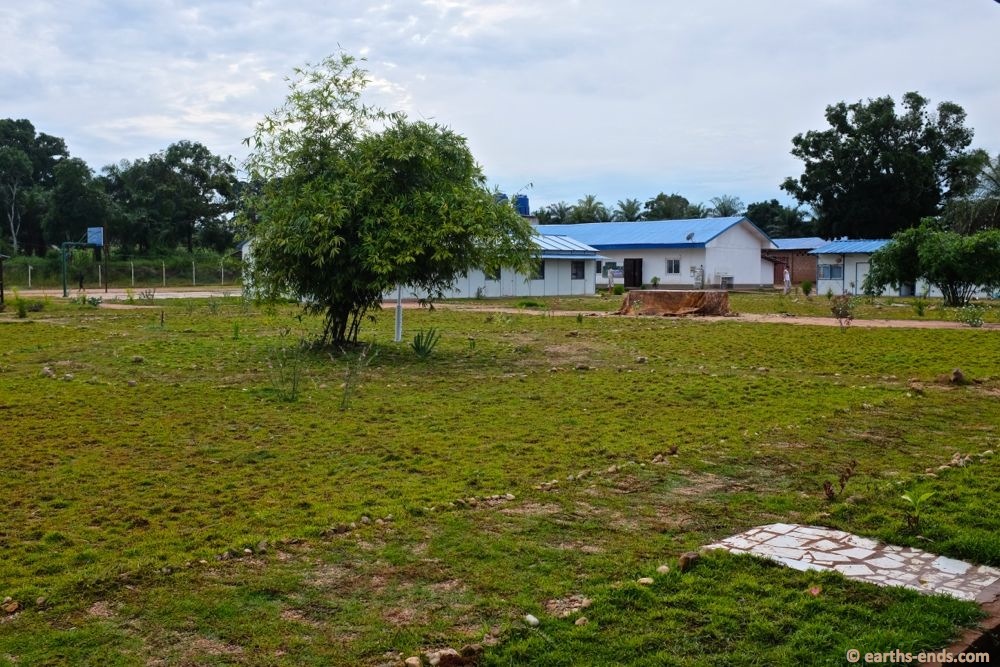
The construction camp.
Guan said how earlier in the year in DRC the opposition party was using anti-Chinese sentiment to undermine the ruling government by targeting Chinese business people. In the face of this, 50 Chinese businesses were destroyed. He encouraged me to search for these news stories on the Internet.
He is adamant that he will move across the river to Brazzaville, Republic of Congo, in the lead up to the elections and will stay there until it was safe to return to Kinshasa. I learned many foreign business people in Kinshasa kept a house on the other side of the river in ‘Brazza’ in case of any ‘flare-ups’ of DRC’s ever-present troubles. I mentioned that anti-Chinese sentiment has been used as a rather effective political tool in Zambia as well. He nodded in agreement. He knew this already. He had his finger on the pulse of the continent and was far from a hapless opportunist fumbling along in the foreign land. He also spoke of the loneliness and isolation of their lives there.
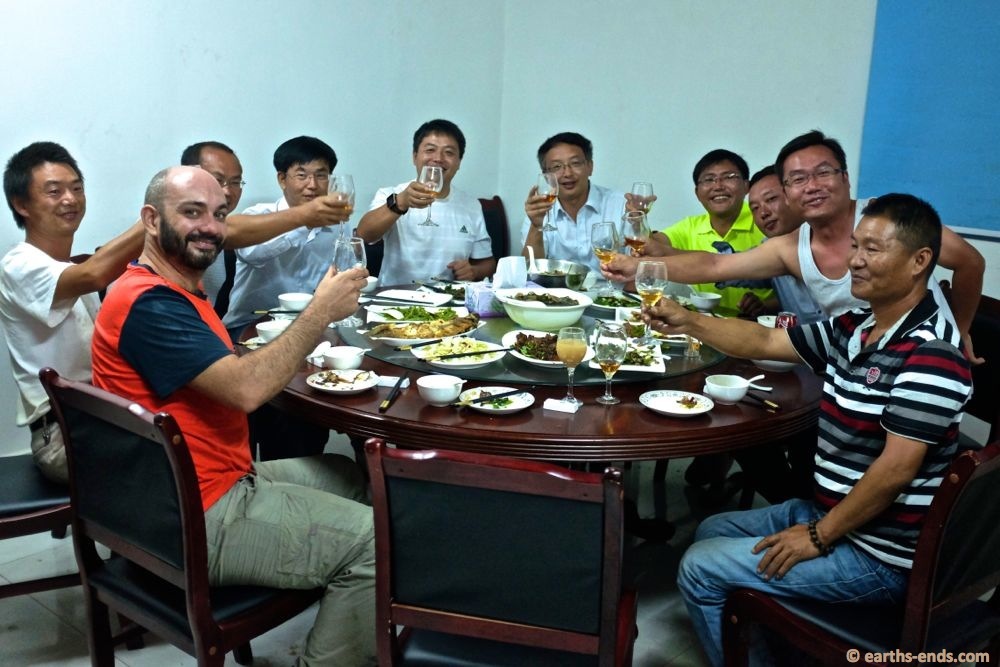
Second dinner – This time a banquet.
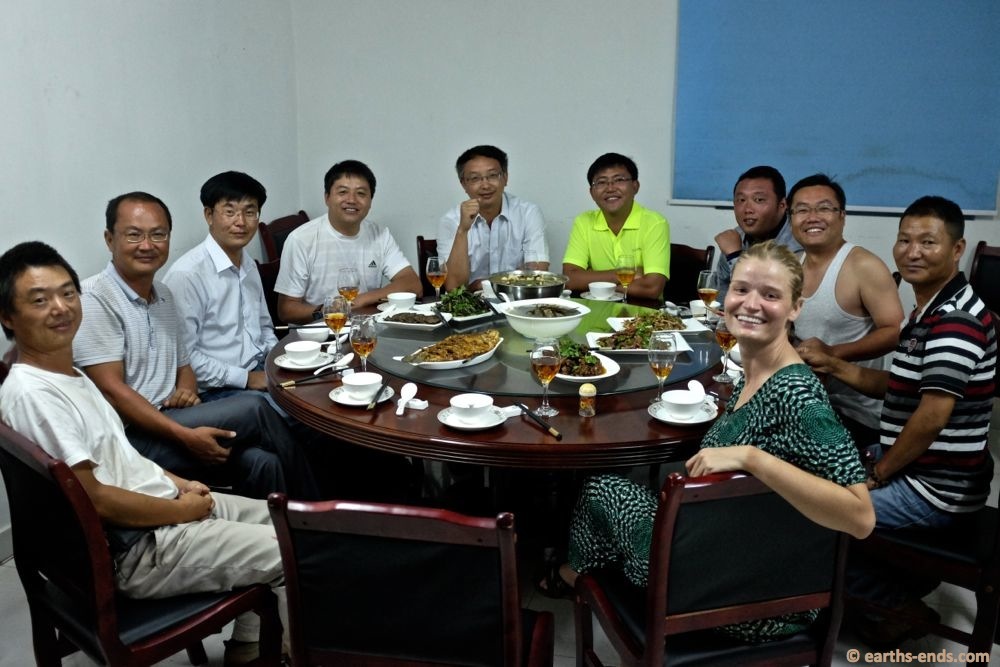
Here I am in the dress Mick loves so much. Funnily enough the Chinese guys commented on how nice it was. See Michael…its fabulous.
Anyway after feeding our faces on authentic Sichuan cuisine and downing a couple of cold cokes each, we went outside and set up our tent on the basketball court. The DRC project manager expressed disappointment that they didn’t have a room to give us in the camp as all the rooms were occupied with the management visit currently taking place. Heads from the Republic of Congo arm of the company were visiting the road-building project and it was all of these guys we had passed in the 4WDs earlier in the afternoon. We told them we were very happy to camp.
That night (a mere 2 or 3 hours later) we were invited to a banquet with the big bosses. It was a night of feasting and stretching my Chinese skills to the limit as the excessive whisky drinking led the conversation down some strange tangents. We went from talking about the company’s mining interests in Australia near the city of Darwin to Darwin’s theory of evolution in the space of 3 seconds. One of the men wanted to know if I believed in Darwin or God? “What was it?” “Monkey or God?” I replied I was a scientist so I had to go with the monkey. Whisky smiles all round.
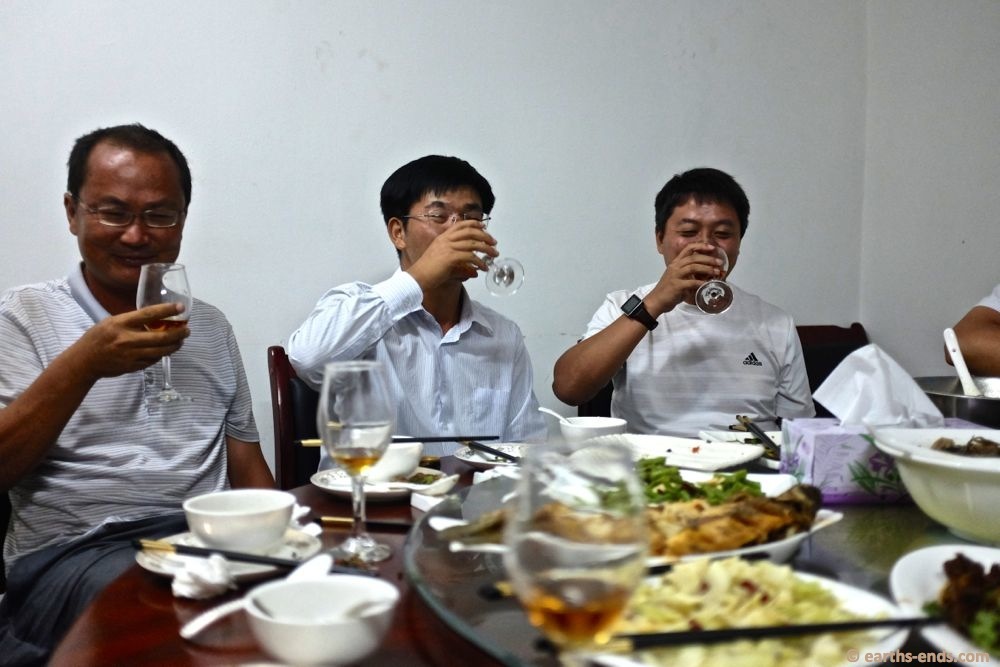
64 The fellas getting trolleyed.
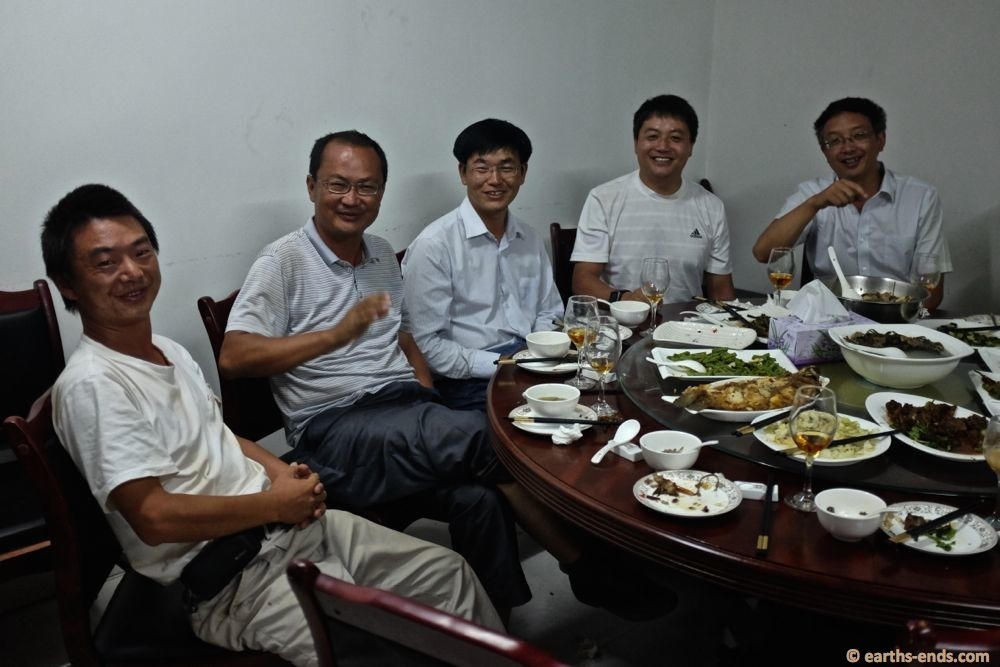
The most important fella at the banquet was the guy in white Adidas shirt (the DRC head of the company) and the fellow to his right (the Republic of Congo head of the company). You can always tell the seniority of people at a Chinese banquet by the seating position. The big man is always at the head of the table, farthest from the door. The second most important to his right, next to his left with decreasing important closest to the doors – which was us. They meant no offence. We were just ring-ins after all. We were just stoked to get food!
During the banquet we were struck by the pure focus of the Chinese on the project. The men were lamenting the time the project was taking. They spoke not so much of the low productivity but more of the challenges of the weather and the lack of good rock for foundations in the local area that required trucking of rocks from on far. They said that in China the same 500km project could be done in 1 year but here the same job is taking 2 ½ years. I said that to me 2 ½ years seemed fast for a 500km section of terrible sandy track. He shook his head and had a look of seriousness when he said… “No. It is too slow.” He looked to be already thinking of the next section of road they would be moving on to (west toward Mbuji-Mayi) and how slow that work would no doubt go.

The fellow on the left wanted to know our thoughts on the evolution. The rest wanted to know about our time in China and where we had travelled there. When we rattled off the different provinces we had visited the guys couldn’t believe we knew the names of any of these places. They were extremely gratified by this.
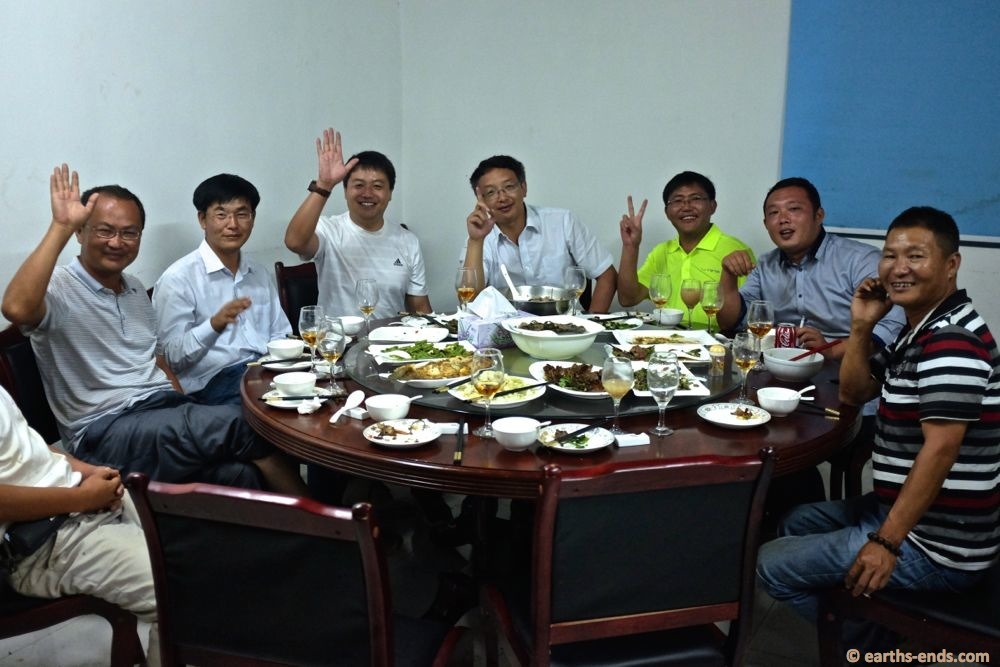
They were a super nice bunch of guys.
It started raining and our hosts were getting worried about our plans to sleep in our tent. Once more they expressed regret that they couldn’t give us a room as the camp was full. We assured them we would be perfectly fine in the tent. However when it started to rain more heavily they would hear no more talk of us sleeping in the tent as the big boss man had determined that to stay in the tent in the rain would be ‘uncomfortable’. They inspected the tent in order to confirm. It was unanimous. It would be ‘uncomfortable’. They then arranged to move someone out of their room to share with another so we would have a room for the night. Resistance from us was futile. And with that we found ourselves sleeping on beds, beneath clean sheets and cozy blankets, in air-conditioned comfort and enjoying our first shower in days. A hot shower no less.
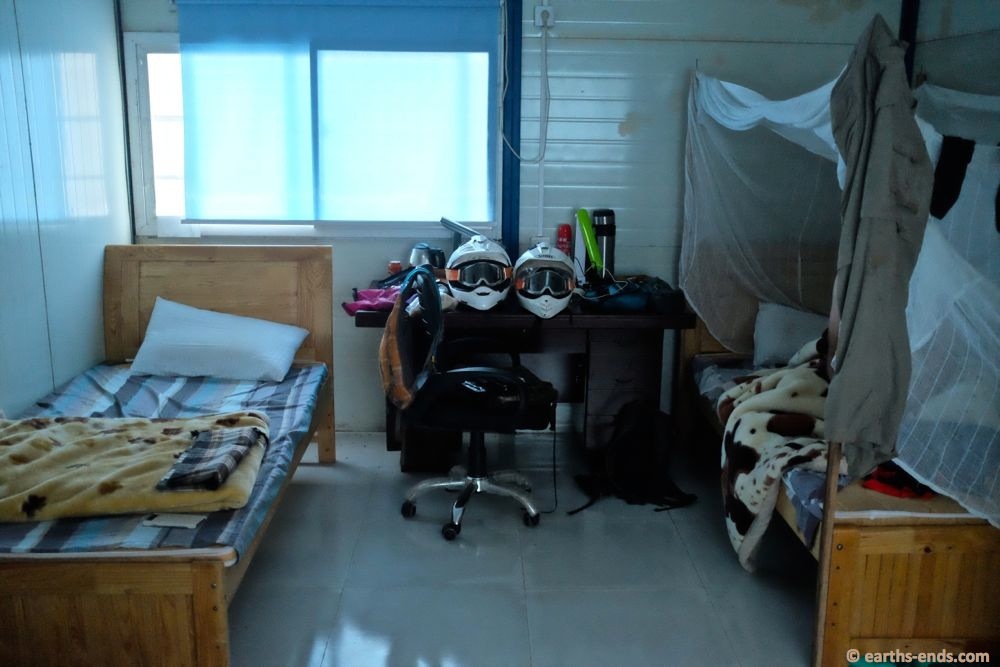
Our room for the night! Can you believe it? We found it interesting to note that everything we saw was sourced from China; soap, toilet paper, toothpaste – you name it.
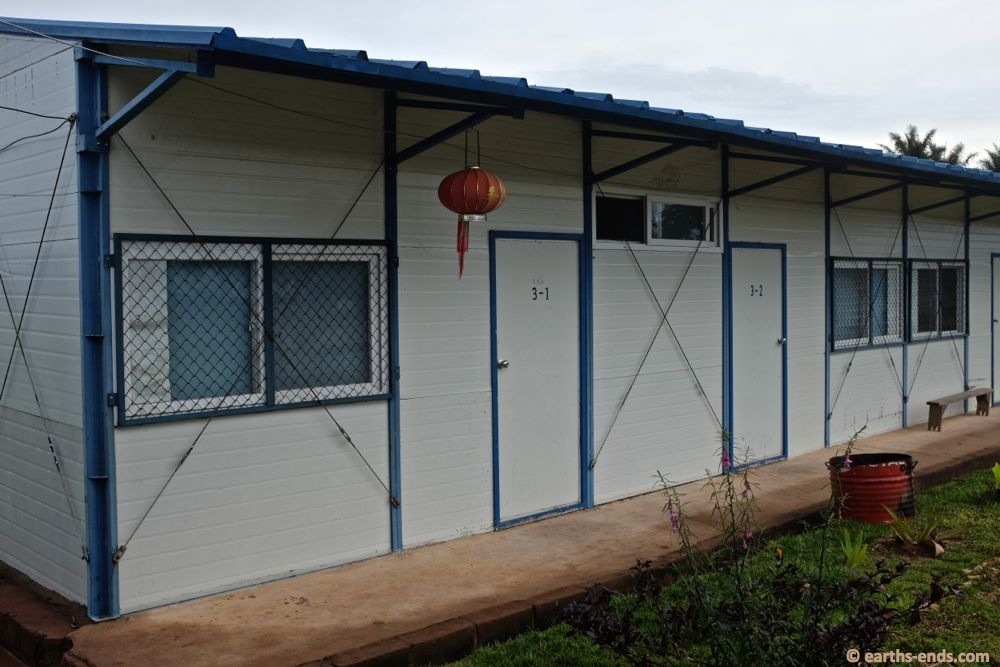
The rooms from the outside. Note the air-conditioner AIR-CONDITIONERRRRRR!!!! INGLISH TEECHAR! AIR-CONDITIONERRRRRR!!!!!!
The room really came into its own later that night when we paid the price for unleashing whisky and copious amounts of authentic, spicy, oily Sichuan cuisine on a digestive system most recently powered on crackers, nuts, biltong and not all that much of it. We made full and extensive use of the en-suite bathroom that night.
Yet despite these personal difficulties we both agreed the booze and two rounds of Chinese meals was worth it. We went to bed exhausted, full as ticks, clean as whistles and pissed as parrots. Both Mick and I reported waking multiple times in the night from the awareness of how incredibly comfortable we were.
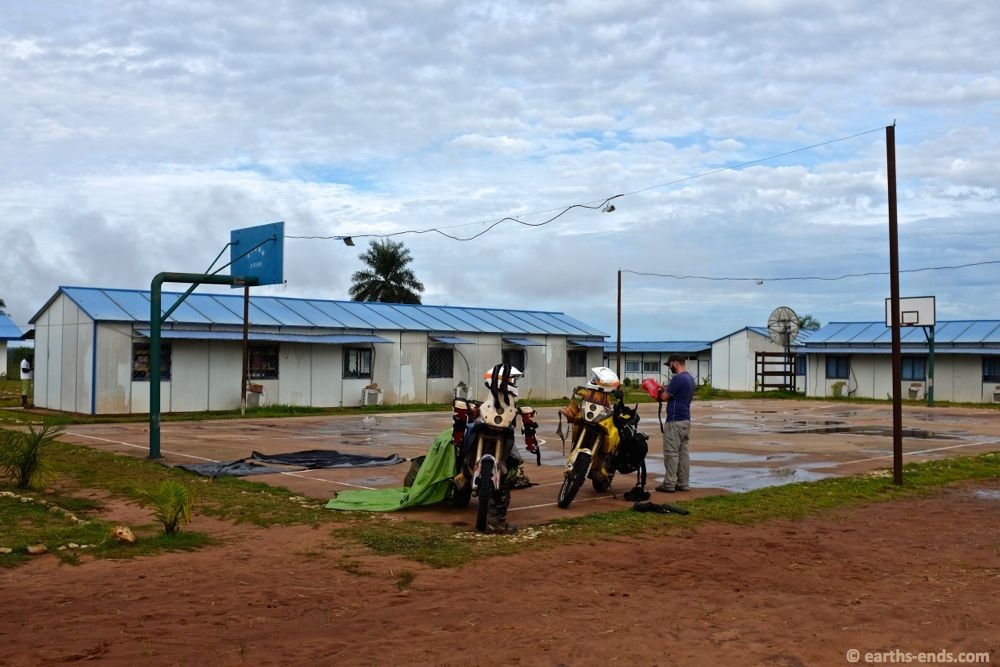
Packing up our wet and unused tent the next morning.
The next morning we hung out in the kitchen with the chef while the big bosses were sleeping off hangovers from a night that raged on for a long time after we retried to bed. The chef was a gregarious fellow who had good relations with his kitchen staff. He had taught them a lot of Chinese language and proudly told us that his two Congolese assistant cooks knew how to make every Chinese dish he prepared in the camp and their Chinese names. He also spoke French, once again challenging the stereotype that the Chinese don’t learn the language when they settle over here.
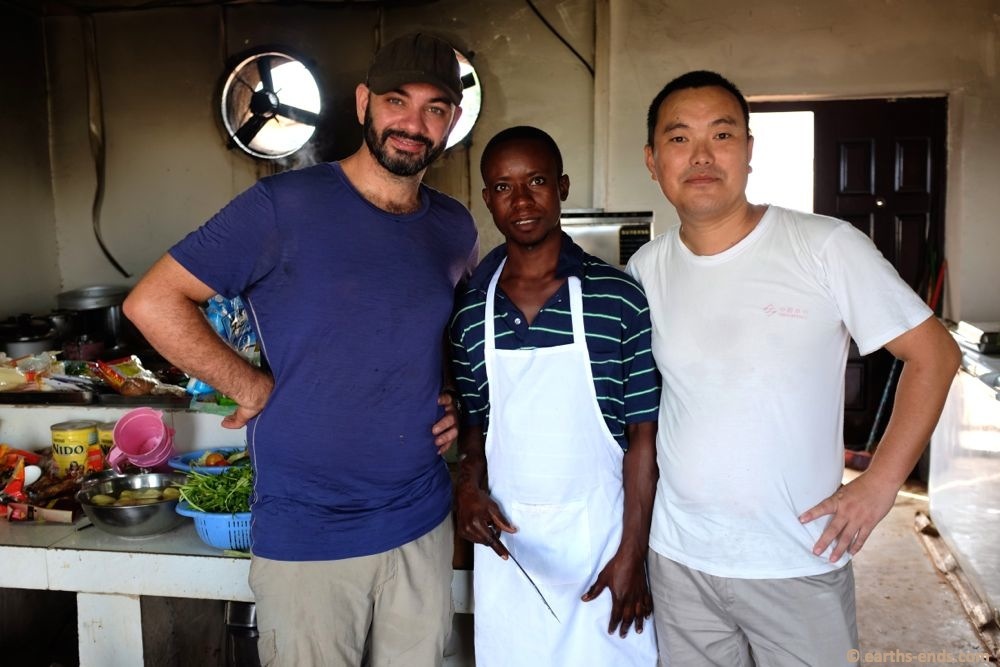
Mick, the chef and his top assistant. The chef told us to name anything we wanted cooked.
We observed him sharing jokes and photos on his phone with his assistants throughout the morning. He was a man at ease and appeared to have a dual role of chef and camp manager. He certainly had more seniority than the average chef would have back in China. No doubt a product of being the only Chinese chef for hundreds of kilometres.
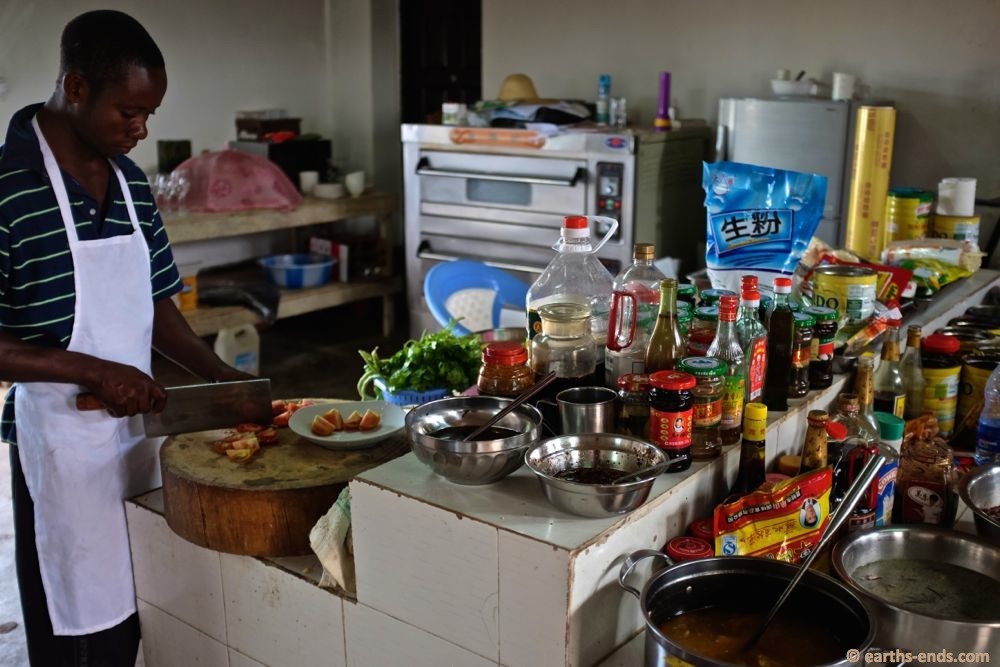
Then the quickly got to work on it.
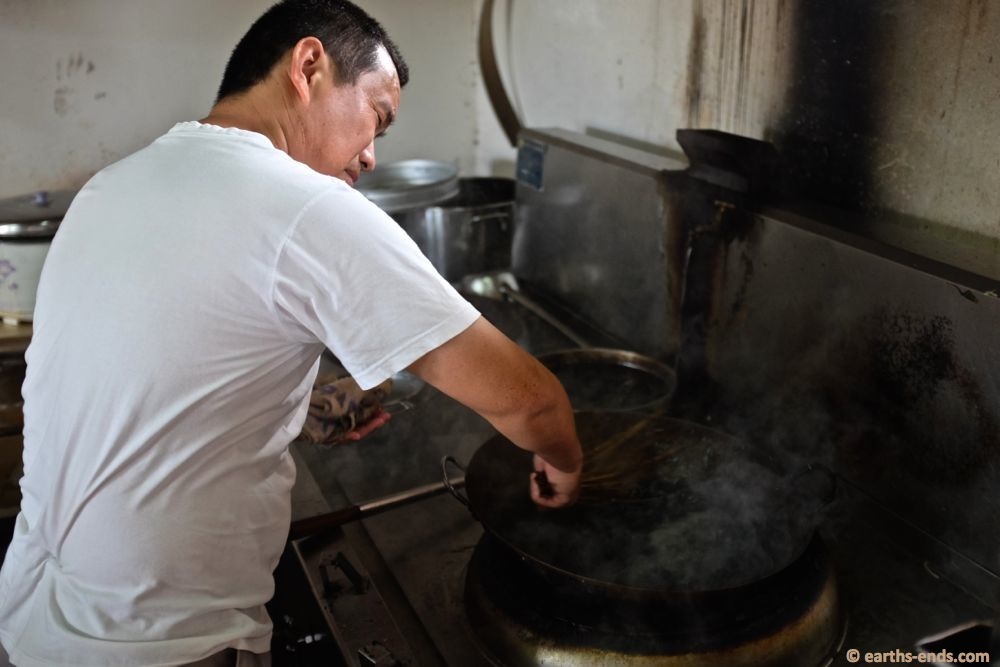
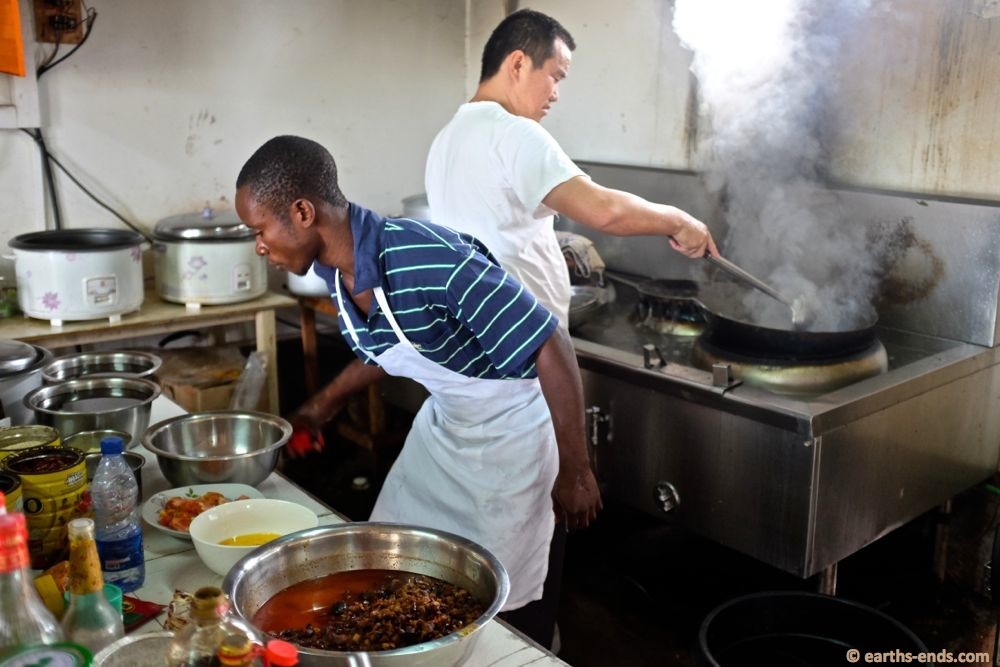
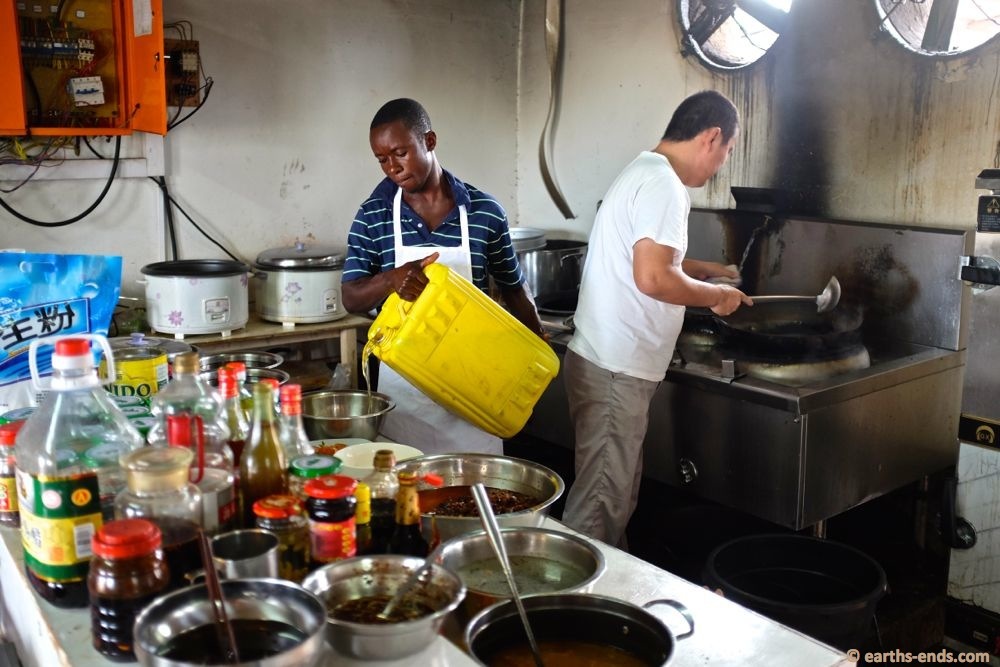
While preparing our favourite Chinese foods for breakfast he told us about his time in Republic of Congo and DRC where he has been working since his son’s birth some seven years. His plan was to stay in Africa for 10 years to earn money to help his family get ahead. At 7 years in, he has had malaria 15 times and it remained his greatest concern about living here. He was worried about the long-term affects of the illness and treatment on his health. When I expressed alarm at his 15 bouts of malaria he told me it was nothing. There were fellas there who were who had had it more often. One fellow Chinese was up to his 18th case of malaria in less than 7 years.
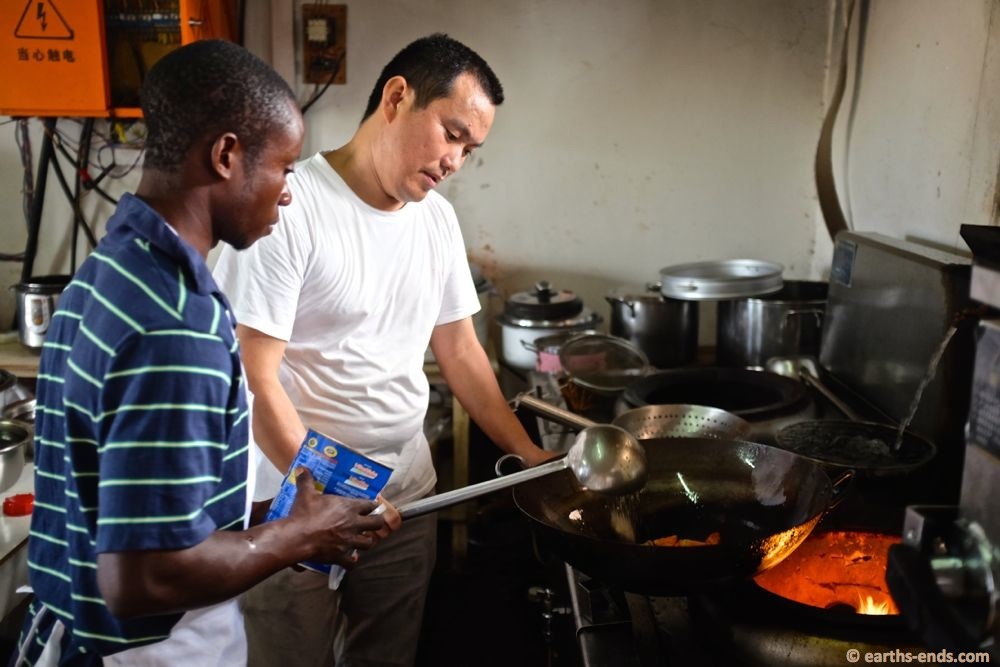
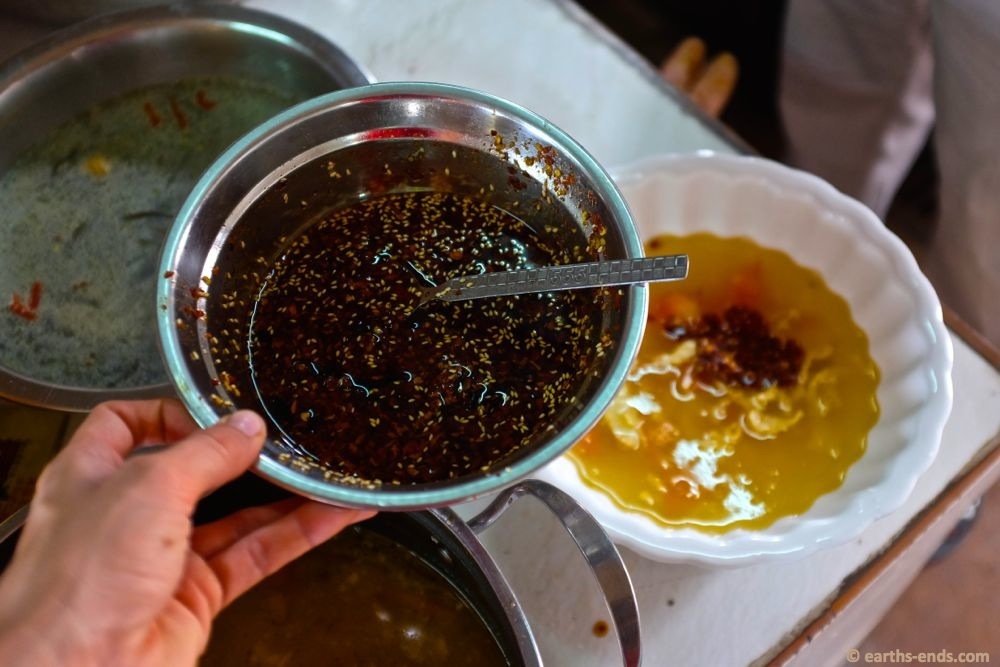
This caused problems later on.
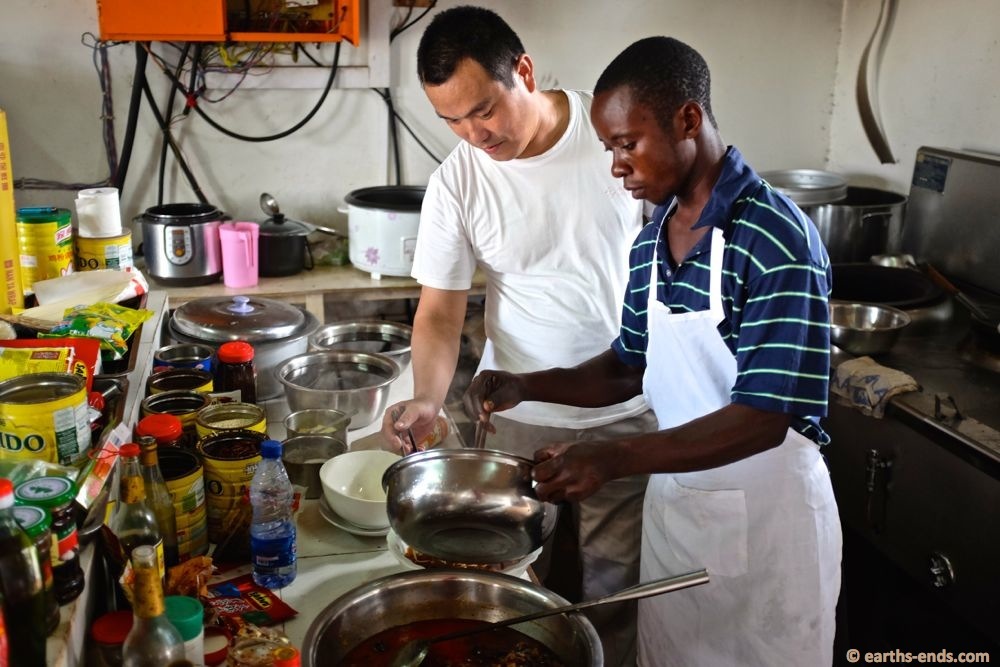
81
Like most Chinese we meet working on large projects he returns home once a year and works every day outside of that 4 to 6 weeks window. But even that time is up for grabs. He said they get paid double for their holiday time if they choose not to go home. He was just a couple of months off visiting his family for the first time in a year. He told us how he works seven days a week from before sunrise until the evening meal is finished. But he has the chance to rest between meals. We thanked him for everything and wished him well.
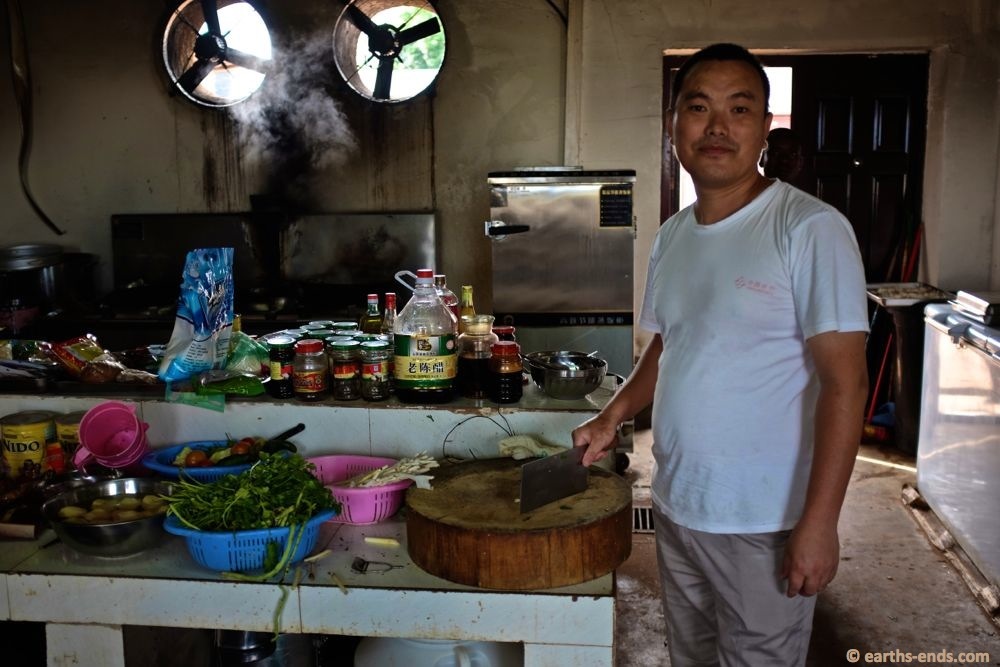
The Chef. He has worked in the Congos for 7 years and has a 7 year old son. He told me he had not returned home each year as he is entitled. But if he had, and for the full 6 weeks each time (again he didn’t) it means he has seen his son for a mere 36 weeks of his son’s life. Pretty rough, but migrant workers in China might only see their children (left with parents in the countryside) for less than 2 weeks a year.
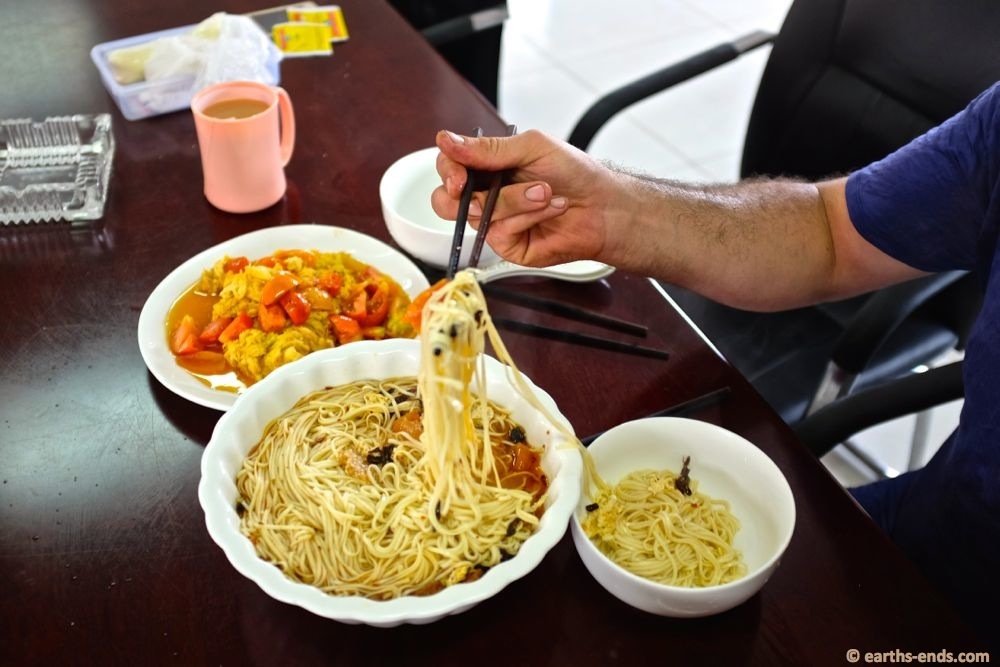
82 The end result.
Our experiences at the camp made us regret the narrow view that people have on the Chinese working in Africa. Over dinner I mentioned to the road building managers that after such difficult riding we were extremely thankful for the work they have done on this section of the road. It was a quick comment that I did not expect to gratify them nearly as much as it did. It stuck me that they might not have heard this before. I wondered if they’d hear it again.
If only more people could share similar interactions as ours with Chinese people at work in Africa. I regret the negative discourse of many newspapers and politicians that depicts the Chinese in Africa as little more than the soulless, faceless foot soldiers of the Chinese government’s will. It is inaccurate and de-humanising and obscures the reality of Chinese migration to Africa. Most Chinese come independently to Africa and have no one to prop them up but other members of the Chinese community. If shit hits the fan in these countries they get no support from their government… not like the rest of us. I promise you, you have more in common with the average Chinese worker in Africa than you do anyone that tells you to fear him.
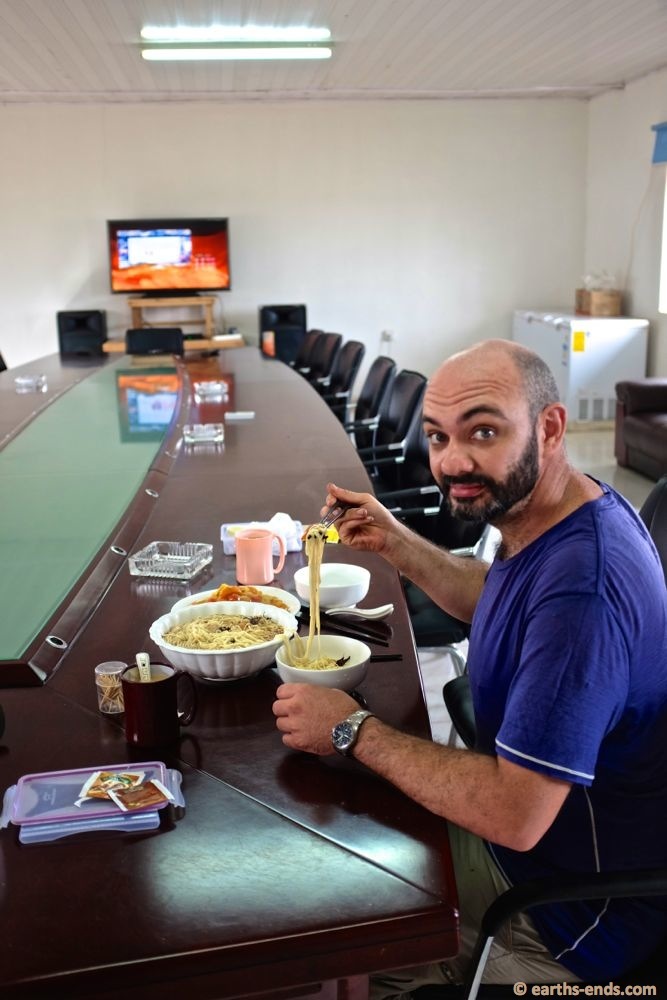
Enjoyed with some Chinese State television.
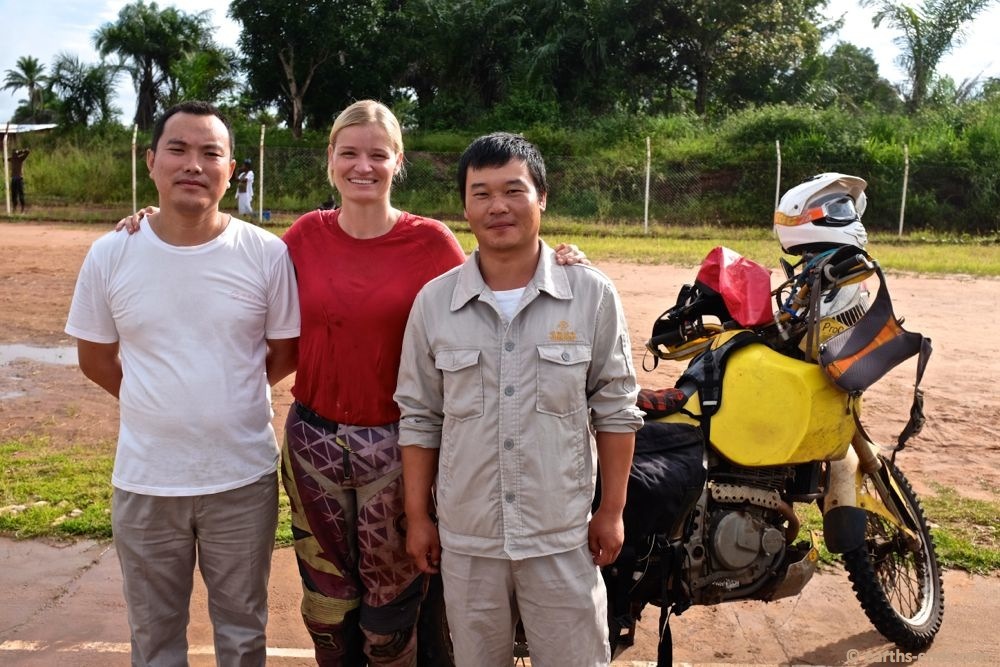
Me saying goodbye to some of the fellas.
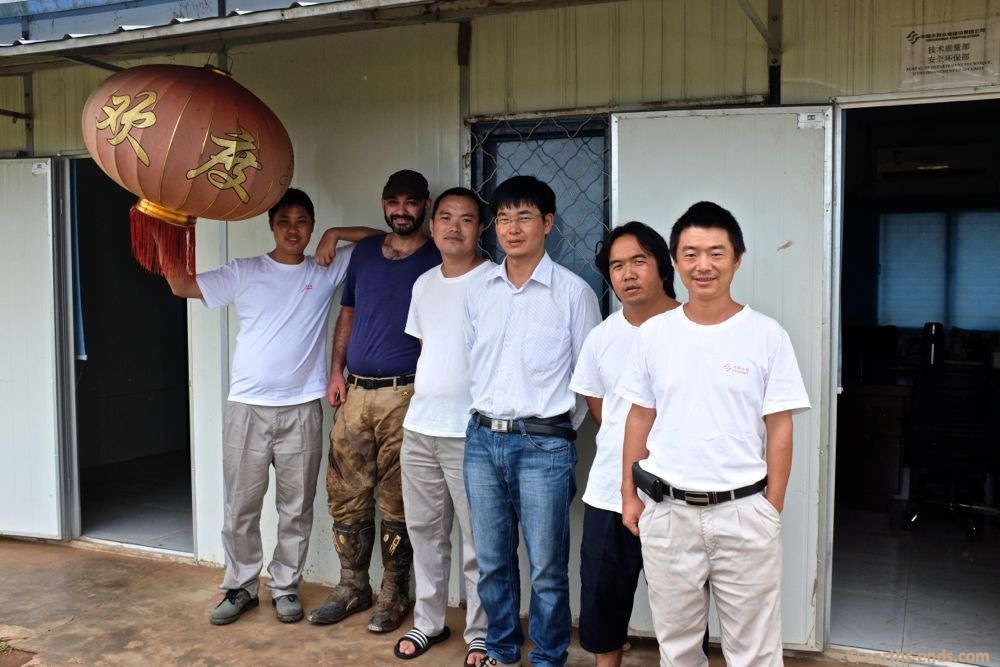
Mick saying goodbye to some of the fellas. Jesus would you look at his pants.
But enough of the Chinese in Africa. What of the Australians? After eating our fill once more and saying our goodbyes to our generous Chinese hosts we were on the road again. This was to be our last day of off-road riding of the crossing. Congo had served us up an intense, sweltering, tiring, supremely unpredictable day the day before. We were excited to see what would come next.
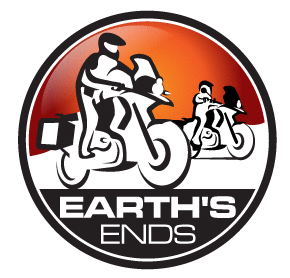 Earths-Ends
Earths-Ends
Recent Comments